THE OFFICIAL CIVILIZATION BATTLE ROYALE X POWER RANKINGS: EPISODE 9
Game: Other games
Published: 2019-08-19, edited: 1970-01-01
Comments thread

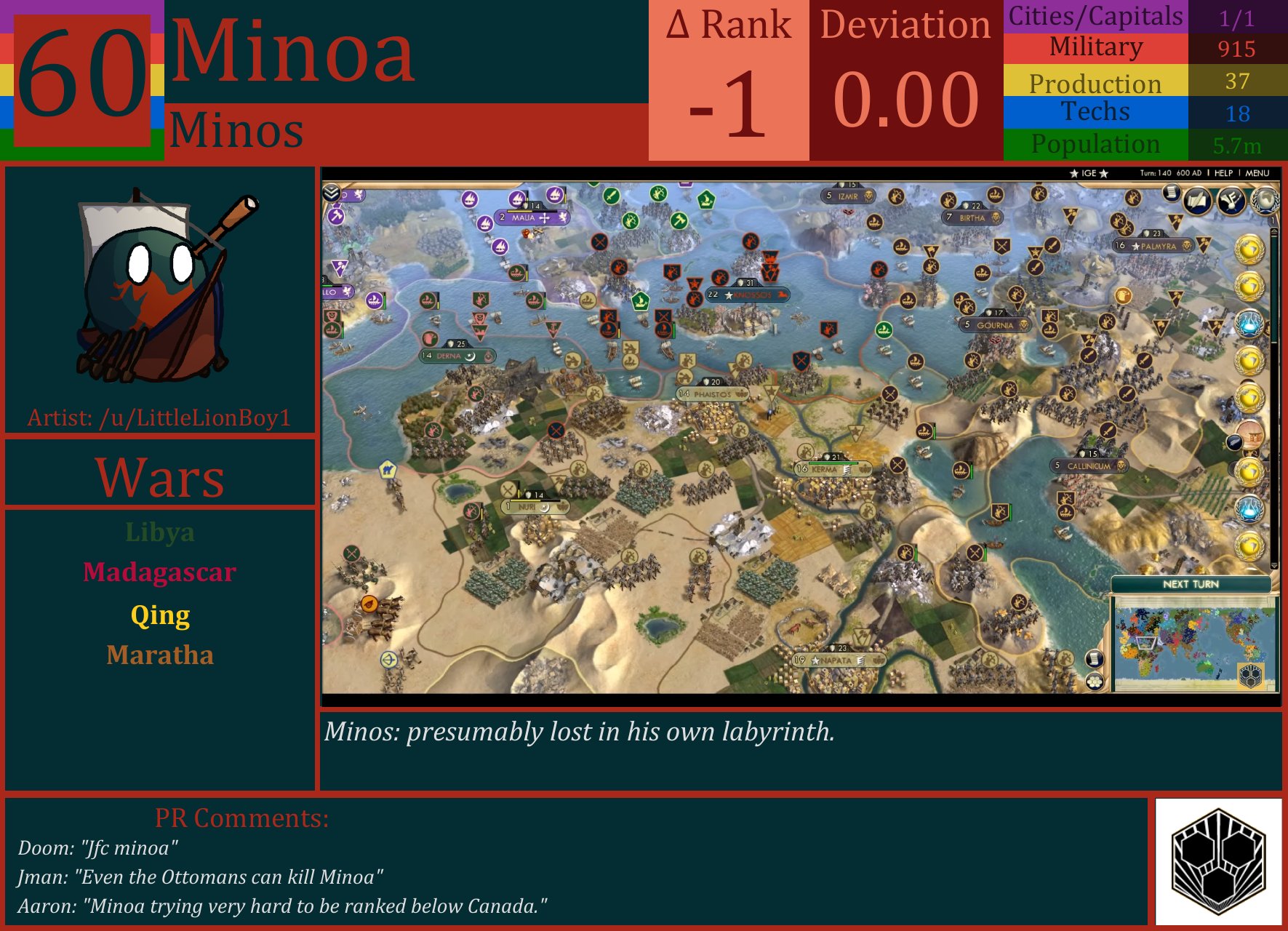
Homusubi: They've been hanging around the bottom of the table for some time now, but it's finally their chance to anti-shine: Minoa has dropped to last place for the first time. It's not hard to see why. After the general agreement by the rest of the Mediterranean civs that whoever Malia should belong to, it's not Minoa, the involuntary one-city challenge club is back in business. What's more, it's an island city, surrounded by a fearsome array of navies, and anyone hoping for a bit of classic CAG Minoan magic has so far been left sorely disappointed by every war Minos has been in. Is it any wonder that sixtieth place beckons? Even the Canadians are on the offensive!
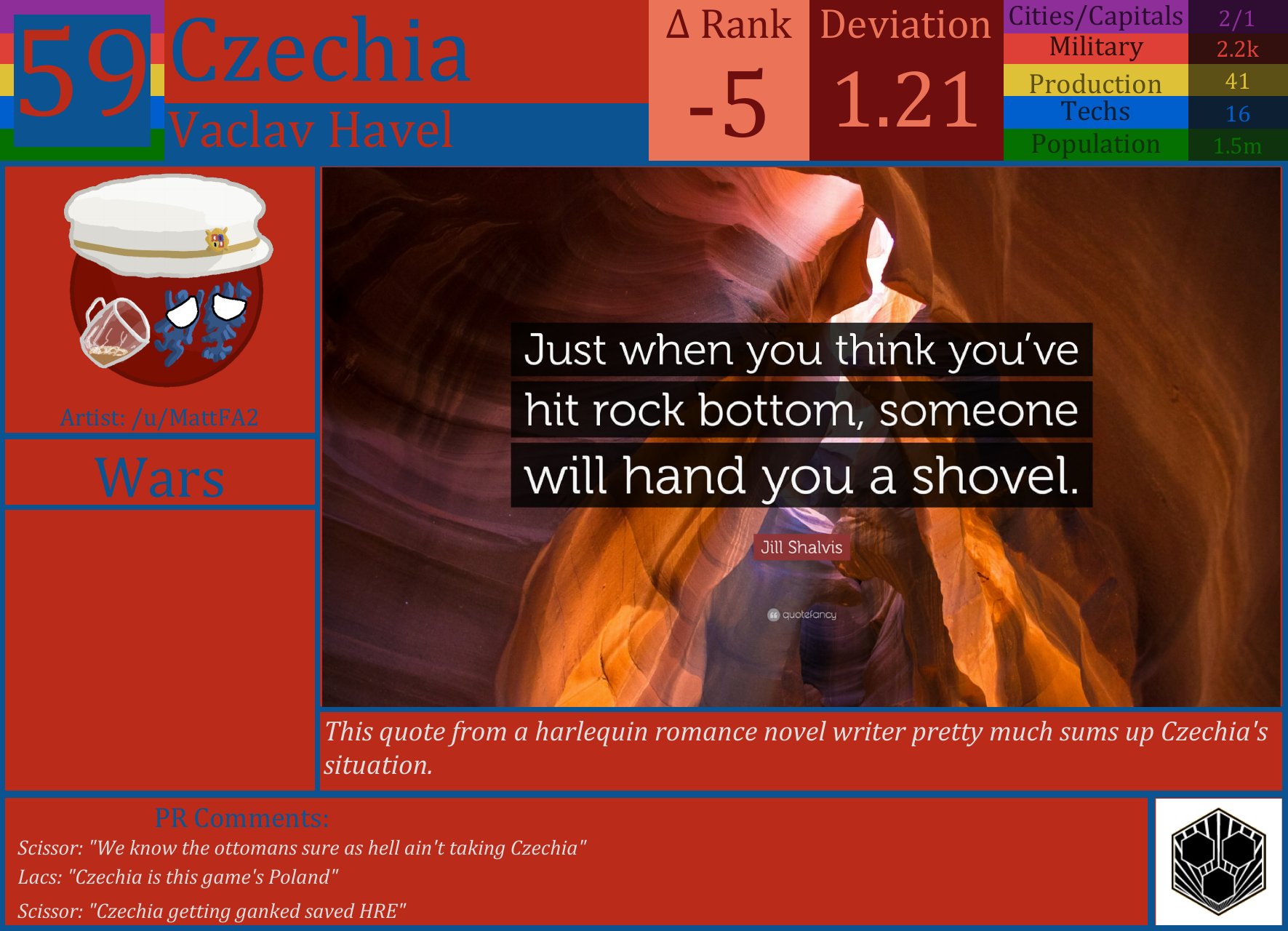
Msurdej: More like CzechiOOF, amirite?
Losing Liberic was bad enough, but to lose Brno as well to the HRE has all but put Czechia on the chopping block for Europe. While their lands are carpeted heavily for now, this will almost certainly hurt their already bad production and science. Its only a matter of time before the HRE or Prussia (because we all know Mehmed isn't gonna do jack) come to finish off Czechia.
Losing Liberic was bad enough, but to lose Brno as well to the HRE has all but put Czechia on the chopping block for Europe. While their lands are carpeted heavily for now, this will almost certainly hurt their already bad production and science. Its only a matter of time before the HRE or Prussia (because we all know Mehmed isn't gonna do jack) come to finish off Czechia.
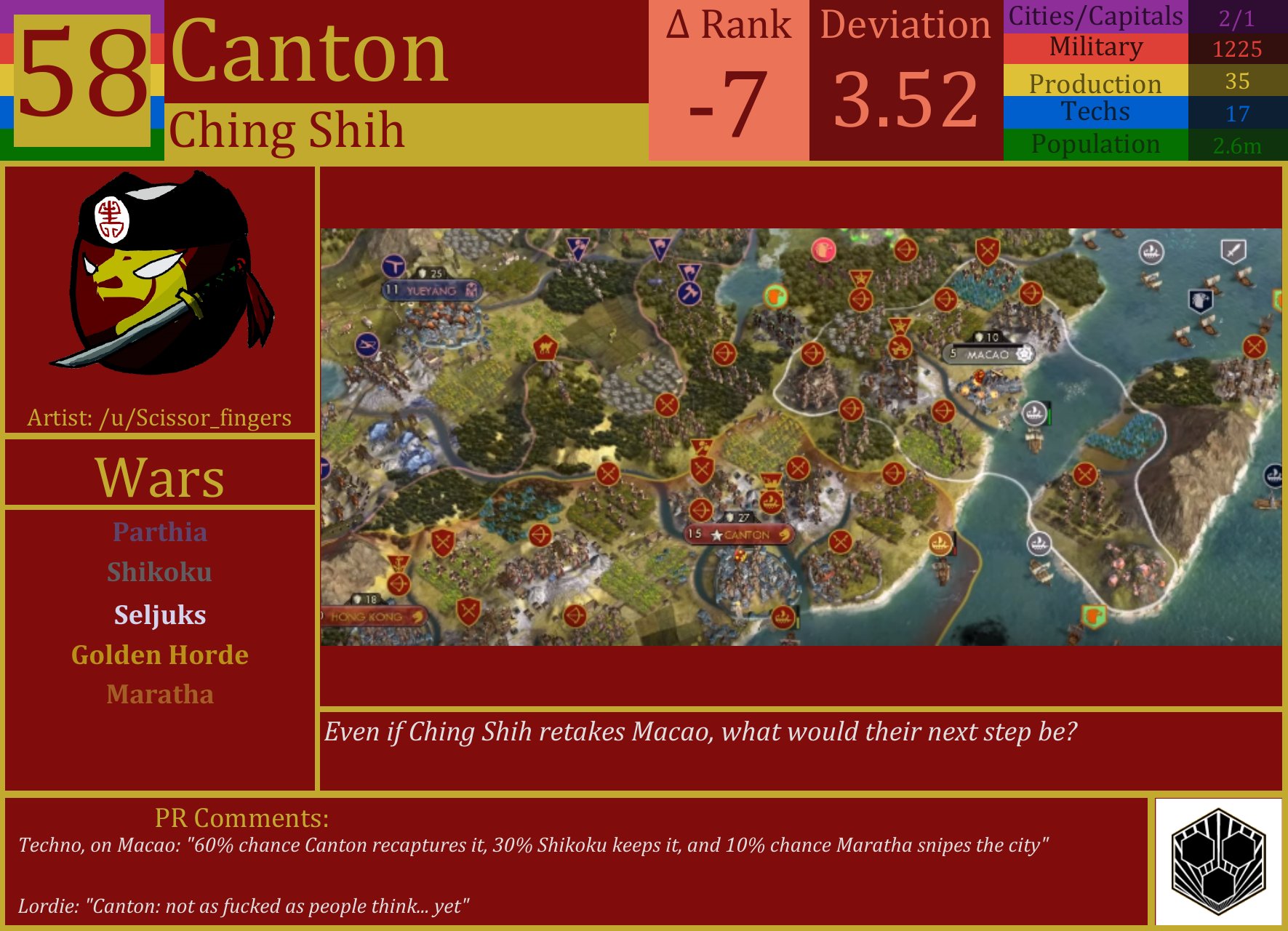
Msurdej: Speaking of being handed a shovel, Canton goes falling down the ranks as well. The loss of Macao to Shikoku was unexpected, and cripples an already weak Ching Shih. Their production now is on par with Canada, who have been putting out more cities, and their science is equal with Minoa of all people. Most chances to expand are drying up, as Taungoo, Maratha, Sulu, and even the Qing are putting settlers all around Southeast Asia. And with the 3rd weakest military, Canton continues to look like an easy target if you want to expand in Asia.
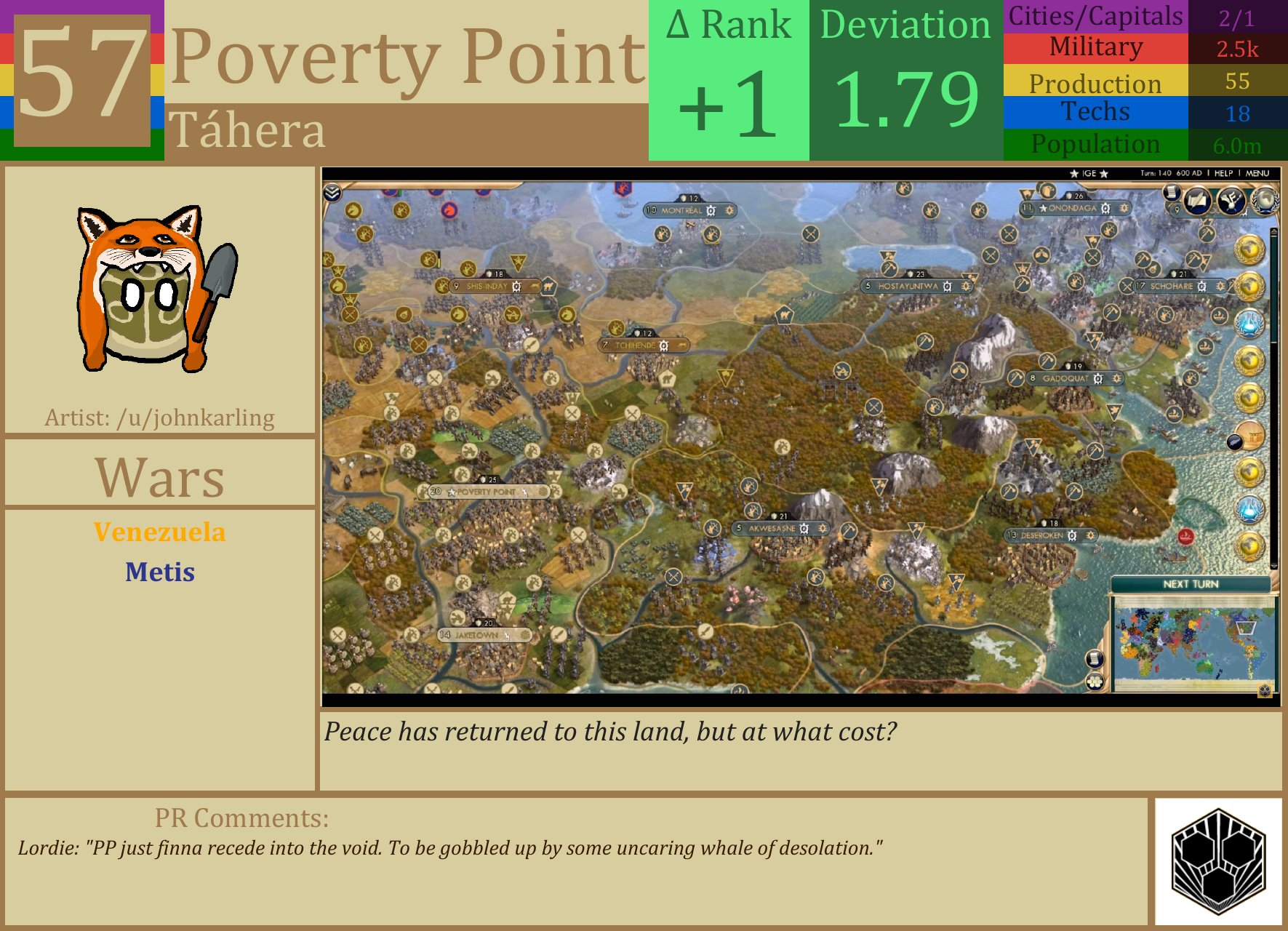
Techno: I have done the writeup for Poverty Point before, but in the time between then and now, a lot has changed, and not for the better. Poverty Point, while no longer facing any game-ending wars, has been reduced to just two cities and no hope for the future. At this point, Poverty Point's best hope is to remain alive as a backwater nation that fails to attract the attention of major rivals, but even that is difficult given their non-isolated position and the fact that they still control their capital city. At least both the Iroquois and Apache currently have a bigger threat to worry about.
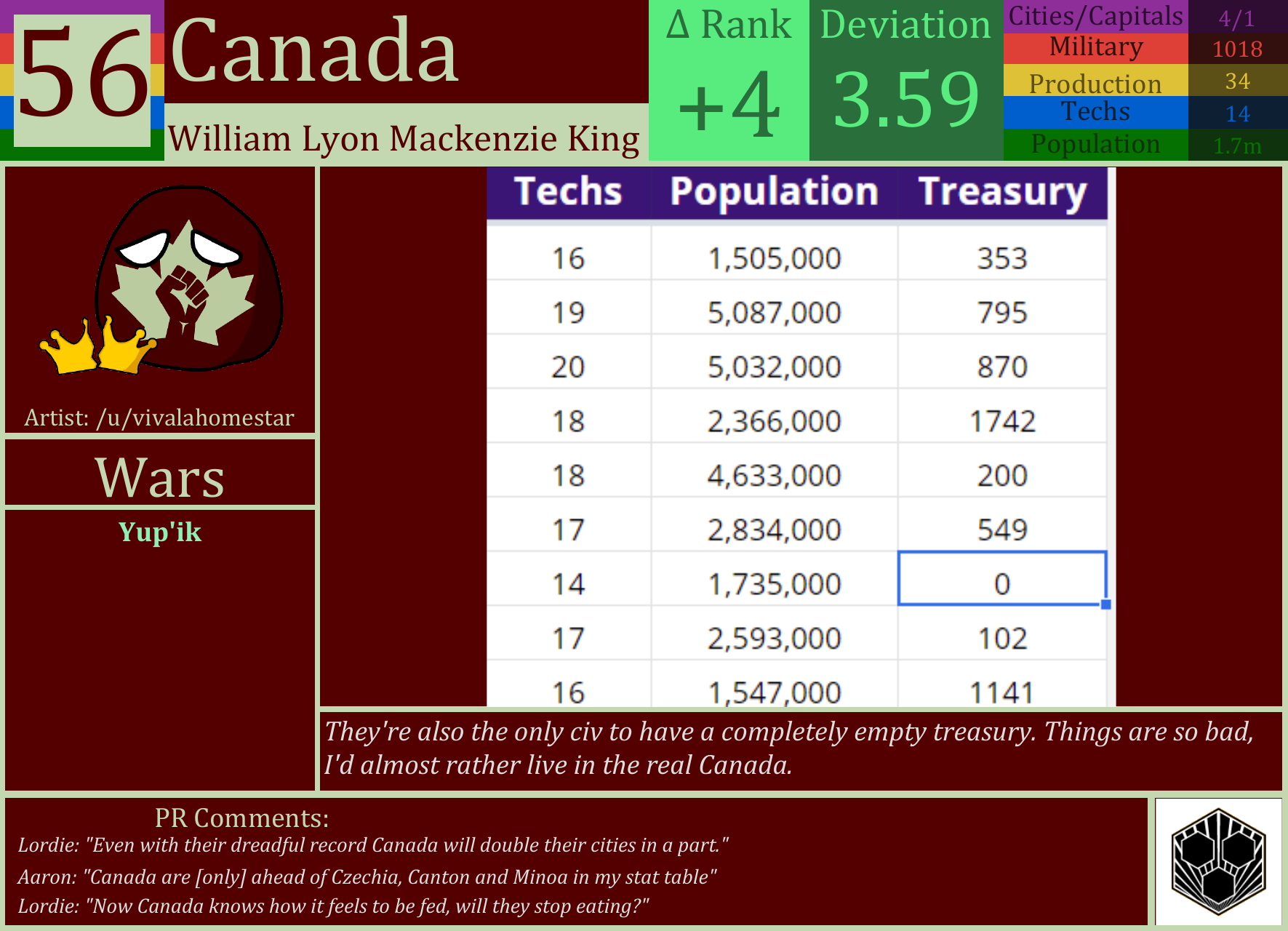
Lacsirax: Stop the press: Canada are up FOUR RANKS?! But they didn't do anything! This is a case of other civs crumbling harder, even if I'd personally make the case that a couple of those civs could be higher. In any case, Canada may not be bottom in the rankings any more, but it's still hard to find stats they're not bottom in. Effective science, check. Production, you bet. Techs, joint last with Scotland but that counts. But they have four cities, so up the ranks they go. In fairness, it's hard to see Iroquois bothering to commit the troops to finish them off, and the mammoth Métis are some way away. Hey, they could feasibly conquer that Yup'ik city, and the two Manx colonies for the comeback story of a millennium. But make no mistake - even on 7 cities, they're falling so far behind that it'll be a miracle if they ever make the 40s again.

Reformer: As I write this, it is soon 7 am in Tonga. Judge for yourself if it is Tonga Time or not. In CBRX, on the other hand, Tonga continues to fail settling the vast amount of islands offered to her, to the point where a New Zealand city has been settled northeast of the Tonga empire. Effectively, the kiwis are now on two sides of the Tonga empire - which, while not yet surrounding the poor island civ, is definitely foreboding of such circumstances. If Siaosi cannot break out and settle properly in the next few parts, he may very well have thrown everything away. Add to that the fact that New Zealand is researching Compass as of this moment, and you might start to think that Tonga has even less time anticipated...
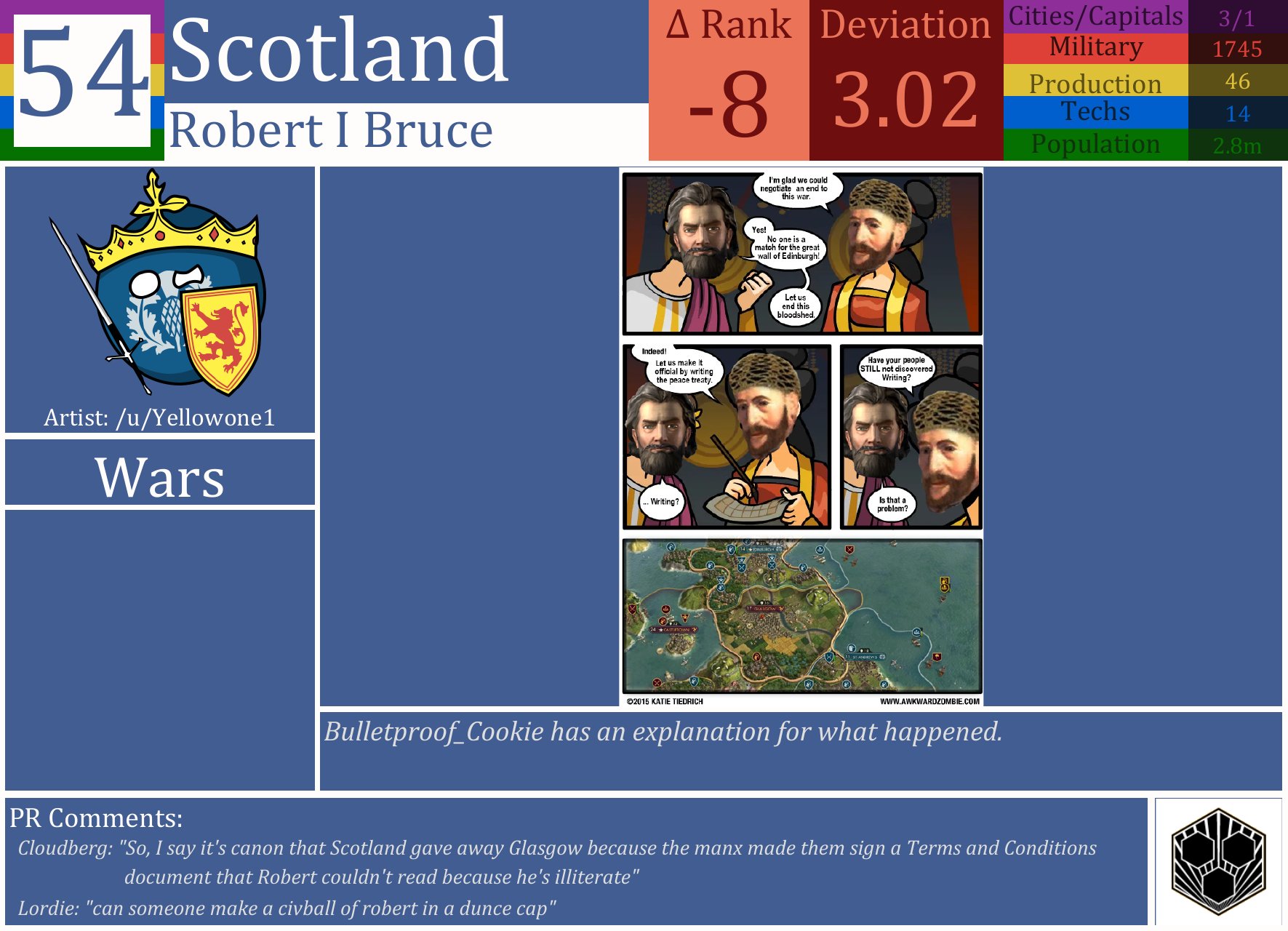
Aaron: No Bobby, no! And just like that, Scotland has signed away any chance of relevance alongside Glasgow. It wasn't just their second city. It wasn't just their biggest most productive city. It wasn't just a city connecting St. Andrews to their capital. On top of all this, it was also placed perfectly to be their greatest defence against the Manx. It is inland, which means that to take it, the Manx would have to go by land and have to deal with the Great Hadrian's wall - so essentially impregnable; but it was also in a location where bowmen could harass the Manx capital and easily sink all their ships and/or bombard the city from a very safe position. And Robert the Bruce just gave it away! Scotland deserves every rank lost for such a terrible blunder. The only thing keeping him from going lower is other civs making similar blunders.
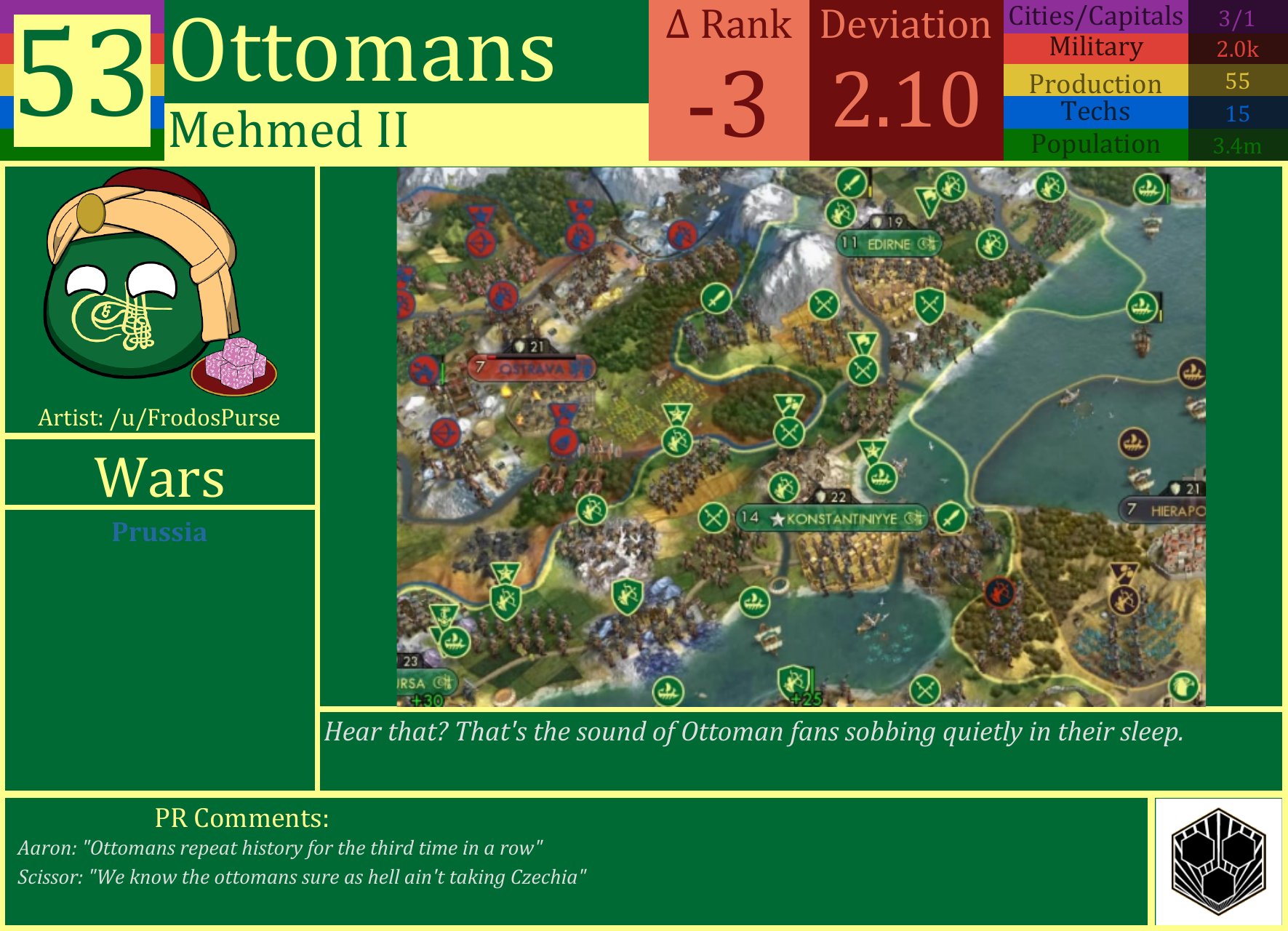
Adm. Cloudberg: In part 9, the Ottomans return to where the were ranked in part 7, after a brief rise in part 8 when everyone thought they might finally capture Ostrava. Clearly we did not learn our lesson, because instead they made peace before taking it for the THIRD time. There's no one currently who could conquer the Ottomans easily, but the fact that they can't even take the easiest city near them suggests that they are never going to get any bigger than they are now.
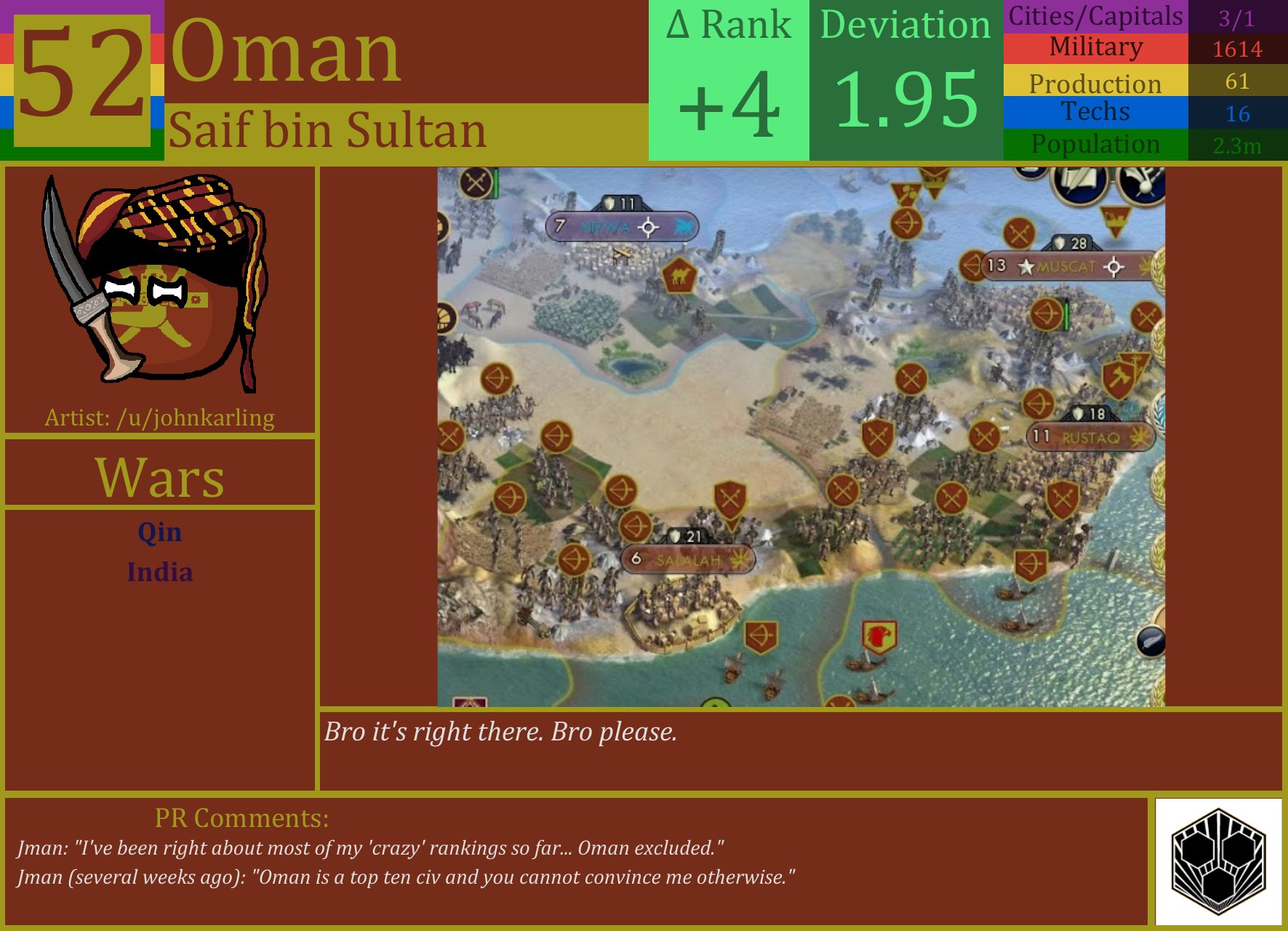
Reformer: Another quiet part passes for Oman, as important stuff happens all around the small civ. Unless you want to consider the Omani raid on Hyderabad an important event. And, of course, I have no doubt that the raid was very important for the Omani people. Who knows what riches were taken from the city already weakened by Marathan attempts at conquest. Obviously any supporter of Oman would hope that they would build a proper navy to attack Hyderabad with, or maybe go for a reconquest of Nizwa - they'd even have a proper casus belli. But even if either action was taken, they'd still have a lot to do. Palmyra could end their chances in an instant, if Zenobia was so inclined.
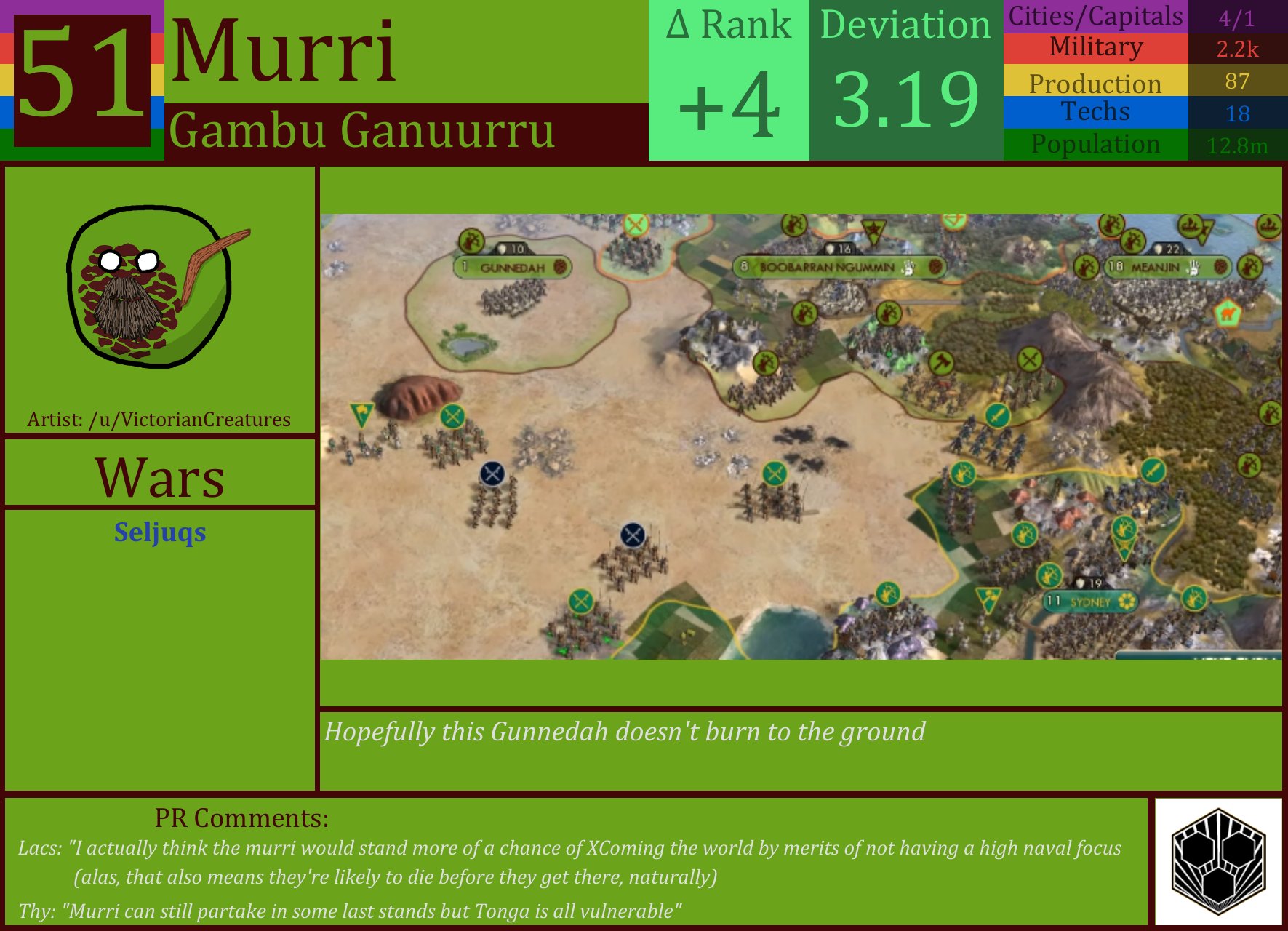
Msurdej: The Murri were barely seen this part. While they try claw themselves out of the hole Australia put them in, they still are the weakest civ on the subcontinent, and if Papua or Australia go after them, it could mean their doom.
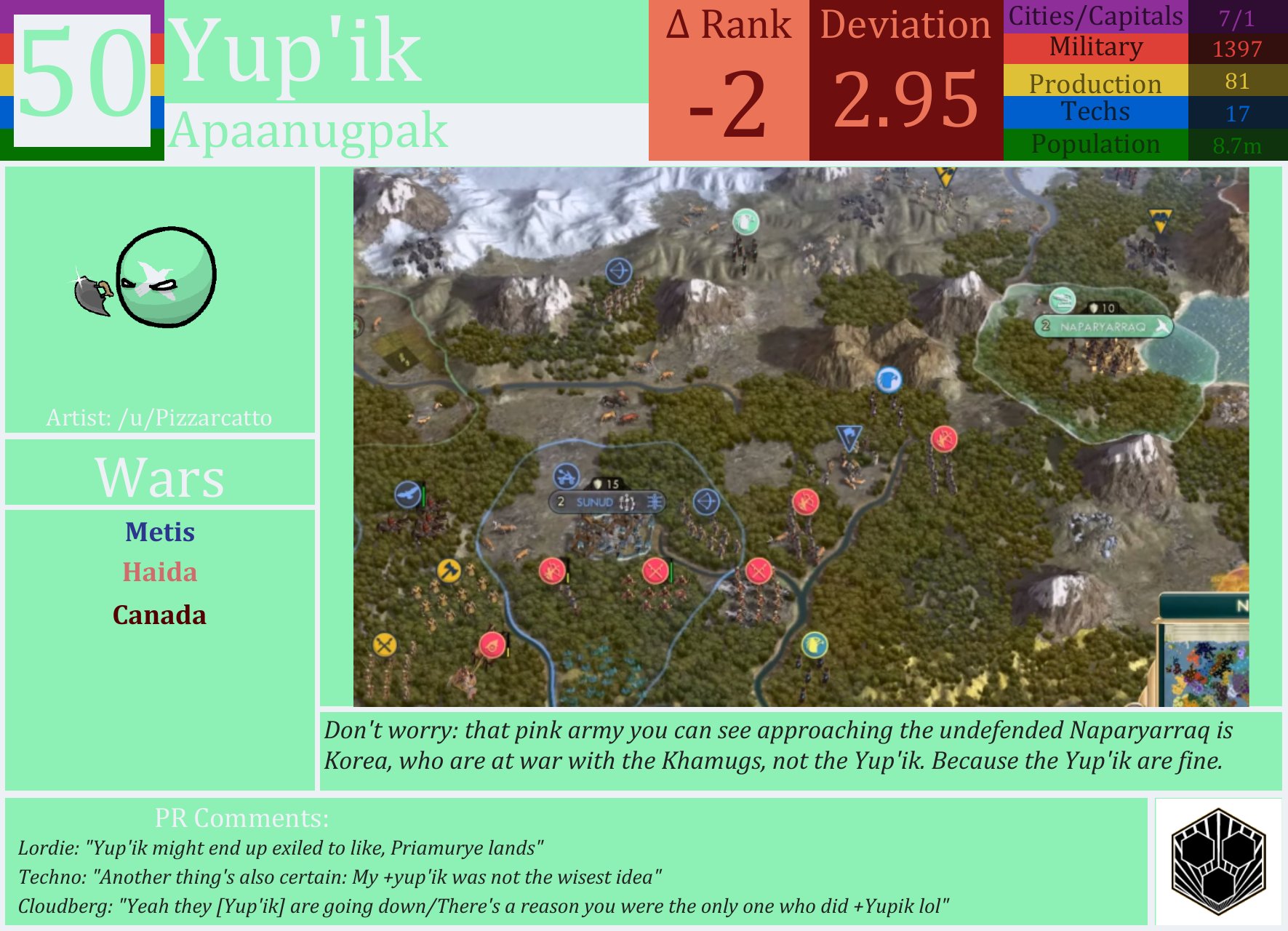
Lacsirax: The Yup'ik founded a city in Siberia this episode! Yaay, well done them. I don't think anything else happened, did it? I certainly feel like I'd remember if their #1 enemy, the nation that were expected to systematically overshadow them and turn them into a rump state within three parts, the nation that had underperformed since the start of the game but over the last couple of episodes had found their mojo and started expanding their production capabilities at a tremendous rate, the nation whose military was 3 times larger than the Yup'ik one and had concentrated that military mostly in their strong unique trireme, declared war and started sending their humongous fleets and advanced pikemen to the exposed Yup'ik cities. But I don't remember anything like that happening, so all in all, a great part for the Yup'ik.
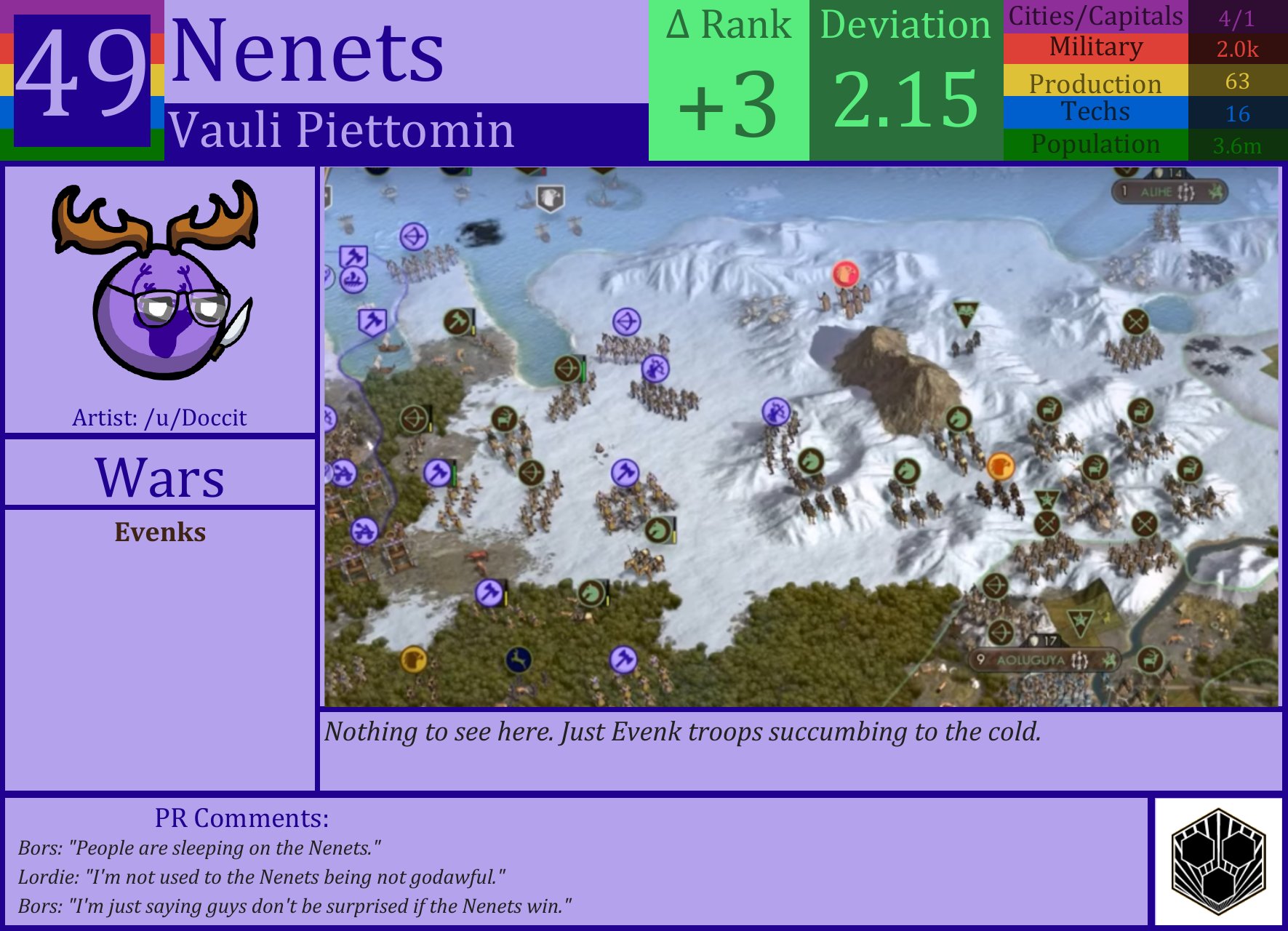
Aaron: Yet more evidence of the Nenets non-existence: in the screenshot in this slide, you see Evenk reports of their expedition against the Nenets. However, if you look closely, you'll see it doesn't make any sense from a tactical point of view. According to official Evenk reports, there are a large number of Nenets between them and the Evenk homeland, which implies that the Evenk army somehow walked past the Nenets forces without noticing them. It seems implausible that the Evenk elite reindeer archers, well trained for fighting in the snow, could miss such a large force of Nenets. Or alternatively, the Nenets have invisibility powers, which also seems implausible. Rather, the more likely explanation is that the Evenks are using the Nenets as an excuse for their embarrassing defeats to the Kazakhs, just like the Kazakhs used the Nenets as an excuse for their embarrassing defeats against Parthia. The missing soldiers that were "killed by the Nenets" probably succumbed to hypothermia in the frozen north and the Evenk government (like the Kazakhs before them) is covering up their blunders by using the Nenets as a scapegoat for their many failings.

Andy: In what can be called nothing short of a diplomatic masterstroke, Tokhtamysh successfully navigates his way out of the Gothic War, retaining his capital, and making no concessions. Naturally, the Golden Horde rises five ranks for it.
That being said, times are still dire for Tokhtamysh. With all of five cities, and having Parthia, the Kazakhs, the Goths, and Palmyra for neighbours, the Golden Horde's long term odds are dire. Even if Sarai Batu was held today, there's no guarantee the city won't fall to another invader down the line. That being said, they've survived this part, capital in hand. Let's see how long they can go.
That being said, times are still dire for Tokhtamysh. With all of five cities, and having Parthia, the Kazakhs, the Goths, and Palmyra for neighbours, the Golden Horde's long term odds are dire. Even if Sarai Batu was held today, there's no guarantee the city won't fall to another invader down the line. That being said, they've survived this part, capital in hand. Let's see how long they can go.
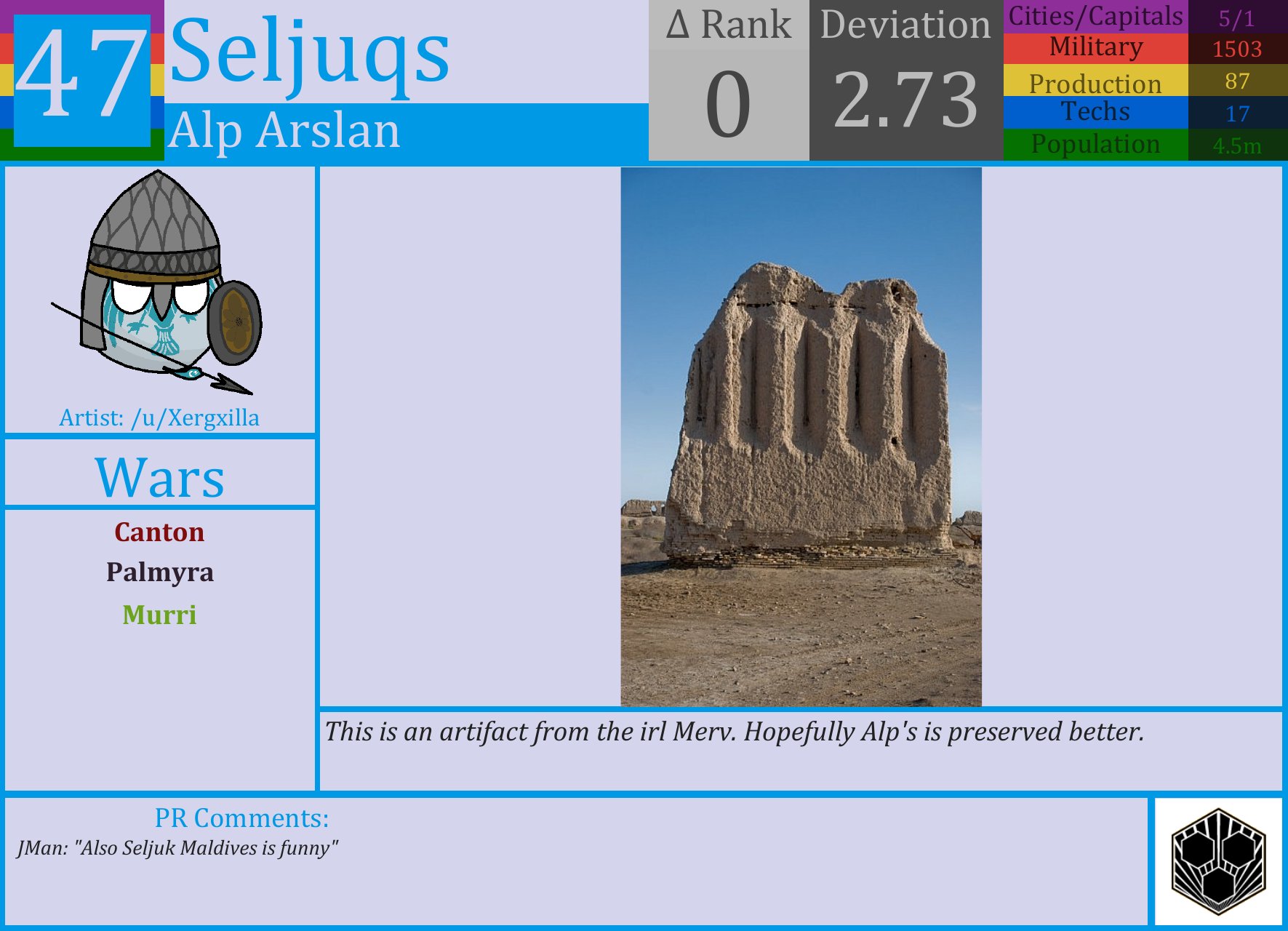
Lordie: Oh no. Oh no-no-no. That must be what's going through the mind of the Seljuqs, as they prepare to take the wrath of Palmyra once more. The general consensus is that Rey is as good as gone, but it remains to be seen if the mountainous core can be penetrated by the technology still upon the cylinder. Again the comparison can be made to Mk2 Persia, but the Seljuqs seem to have it worse. With low tech and production, and an army a quarter of the size of Zenobia's, there's a very real chance the Seljuqs are brought down to one or two cities, especially if people jump in on the war. Alp Arslan will be crossing his fingers very tightly indeed.
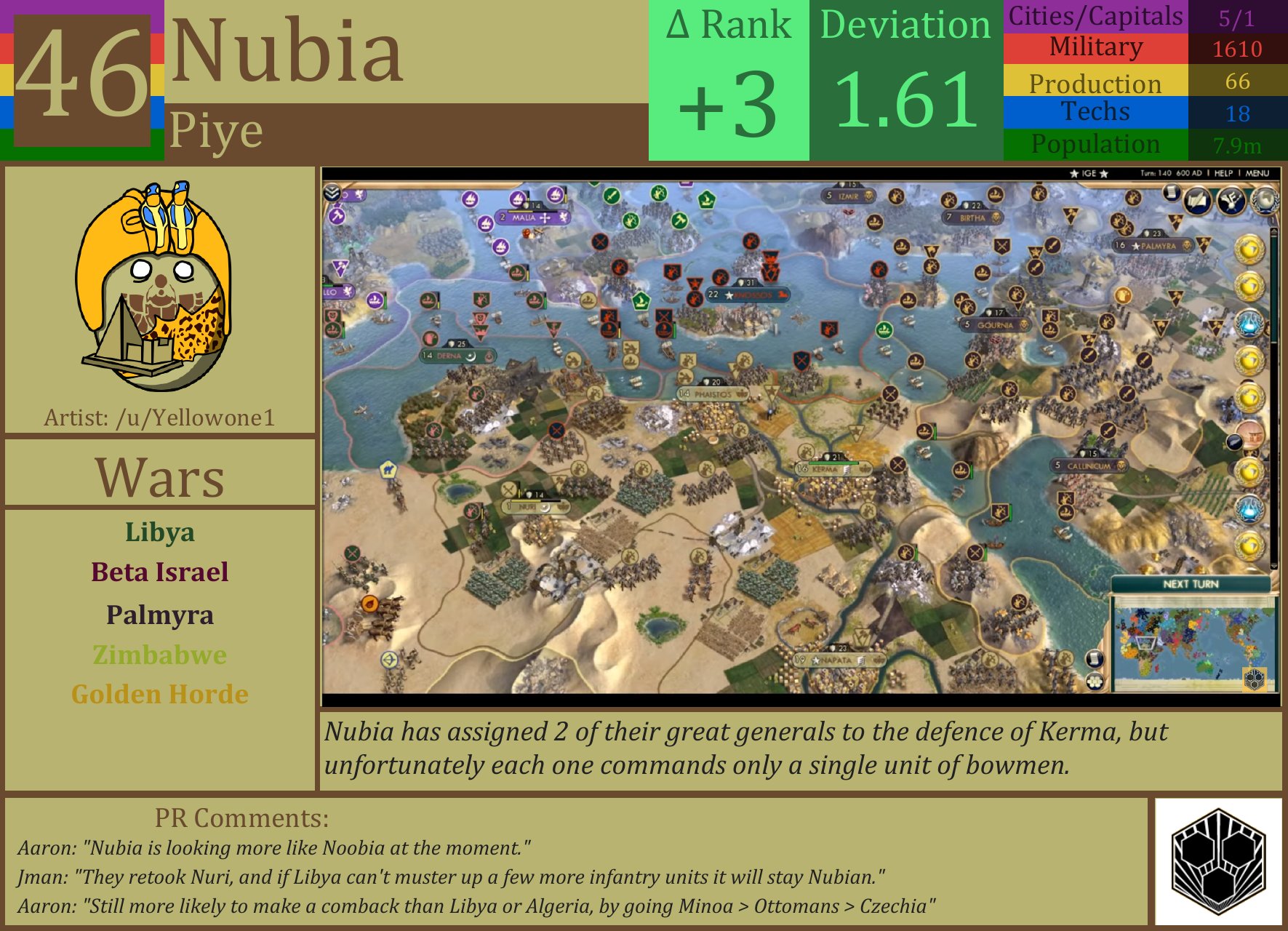
Aaron: Nubia take back their city of Nuri from Libya and 3 ranks to go along with it. Their scary neighbour, Palmyra, has gotten distracted by the Seljuks. Although they are still sending a few troops across the Red Sea, they will probably not be enough to capture any more Nubian cities. Now that Venice has joined the fray, Nubia might have an opportunity of turning the tables on Libya and sniping Derna. Even so, the many many turns of constant warfare have worn away at Nubian chances by preventing them from expanding. Now they are just one of the trio of bad north African civs.
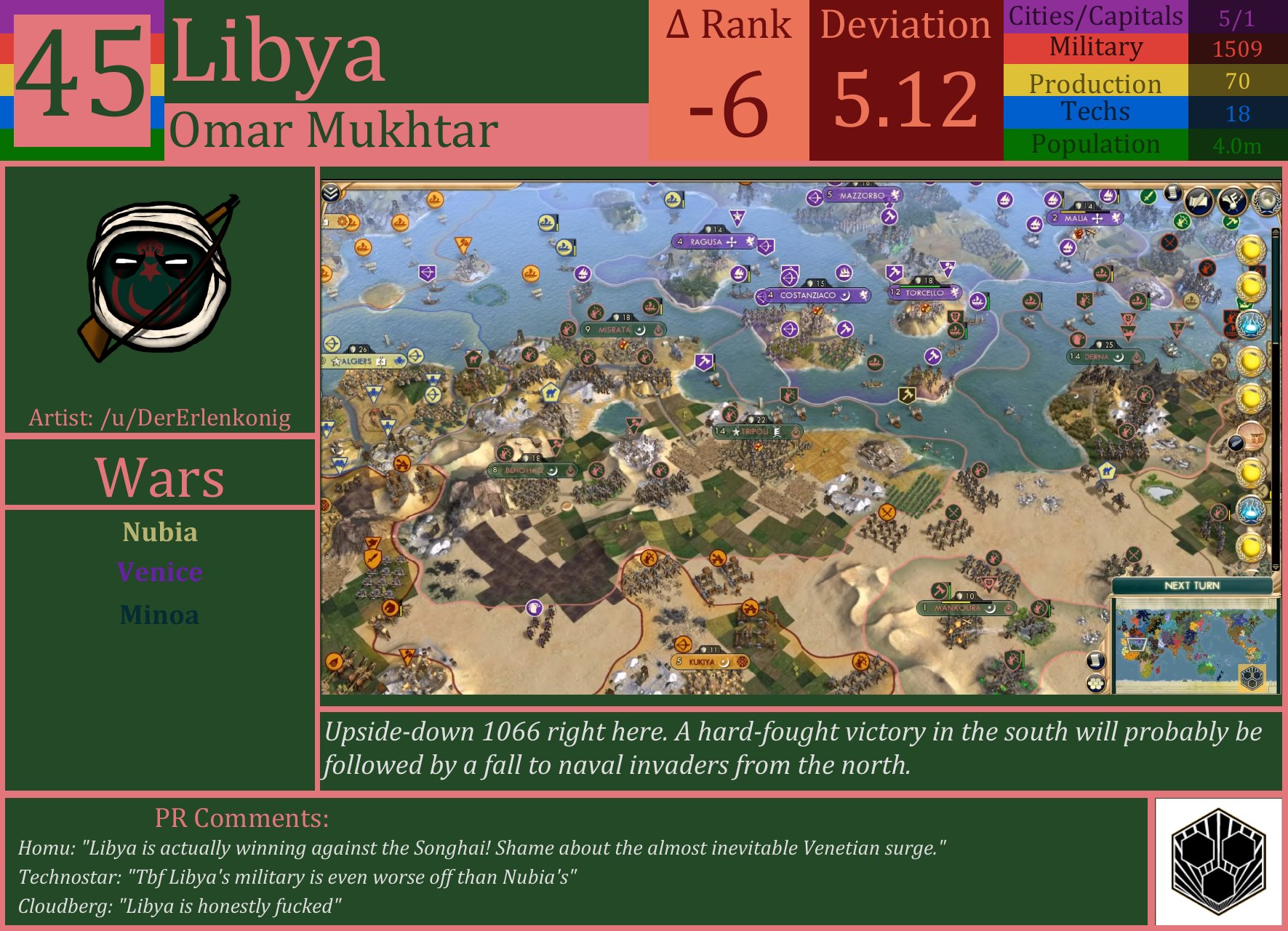
Homusubi: It's hard not to feel sorry for the Libyans. Cursed with a deep Saharan TSL that only a human Libya could use effectively, they survived their first hesitant struggles with the Algerians, eventually managing to settle enough to start their own wars and ultimately take cities off of both Nubia and Minoa. A declaration of war from Songhai might have spelled the end for Mukhtar, but no, that was turned around, the now-famously incompetent troops in orange turning and fleeing, from not only the desert but their own city of Manikoura. Why am I writing this like a eulogy? Venice. War. Boats! Various kinds of particularly scary Venetian boat which Enrico likes a lot. Libya isn't doomed yet, there's always the potential for another embarrassing peace treaty from Venice or another Mukhtar miracle, but another tumble seems more likely than anything else at this stage.
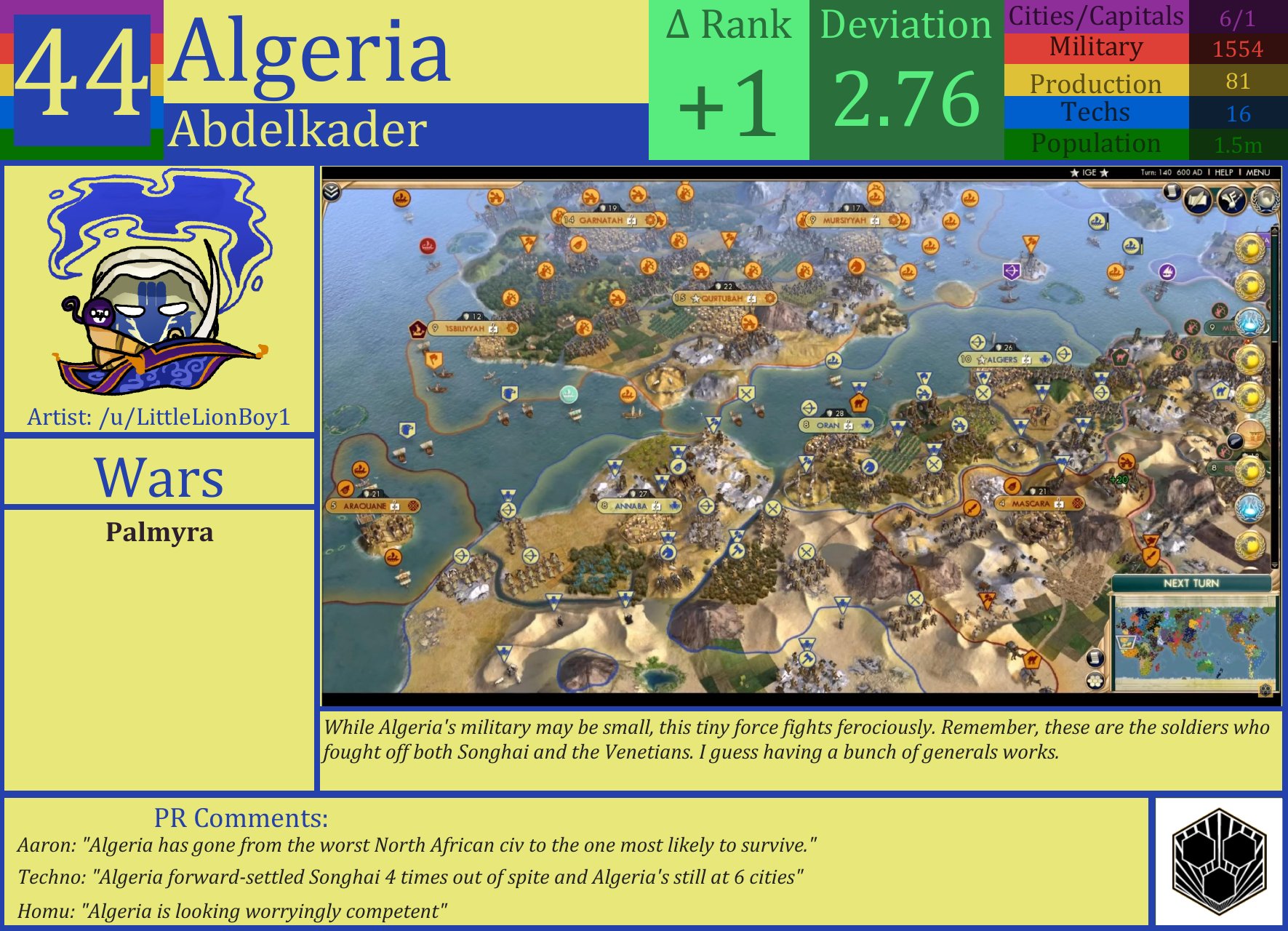
Techno: I cannot tell if Abdelkader is a madman or a genius. These past two parts, Algeria somehow managed to repel attacks from both Venice and Songhai, a military victory far in excess of what anyone would have expected from a civ that was once reduced to a rump state. On the other hand, the war against Songhai was due to some patently absurd forward-settles by Algeria whose only purpose was apparently to draw out Askia's ire. This strategy has worked for the time being, netting Algeria 6 cities, but we still have doubts about the sustainability of this approach. At least the terrain is on Algeria's side.
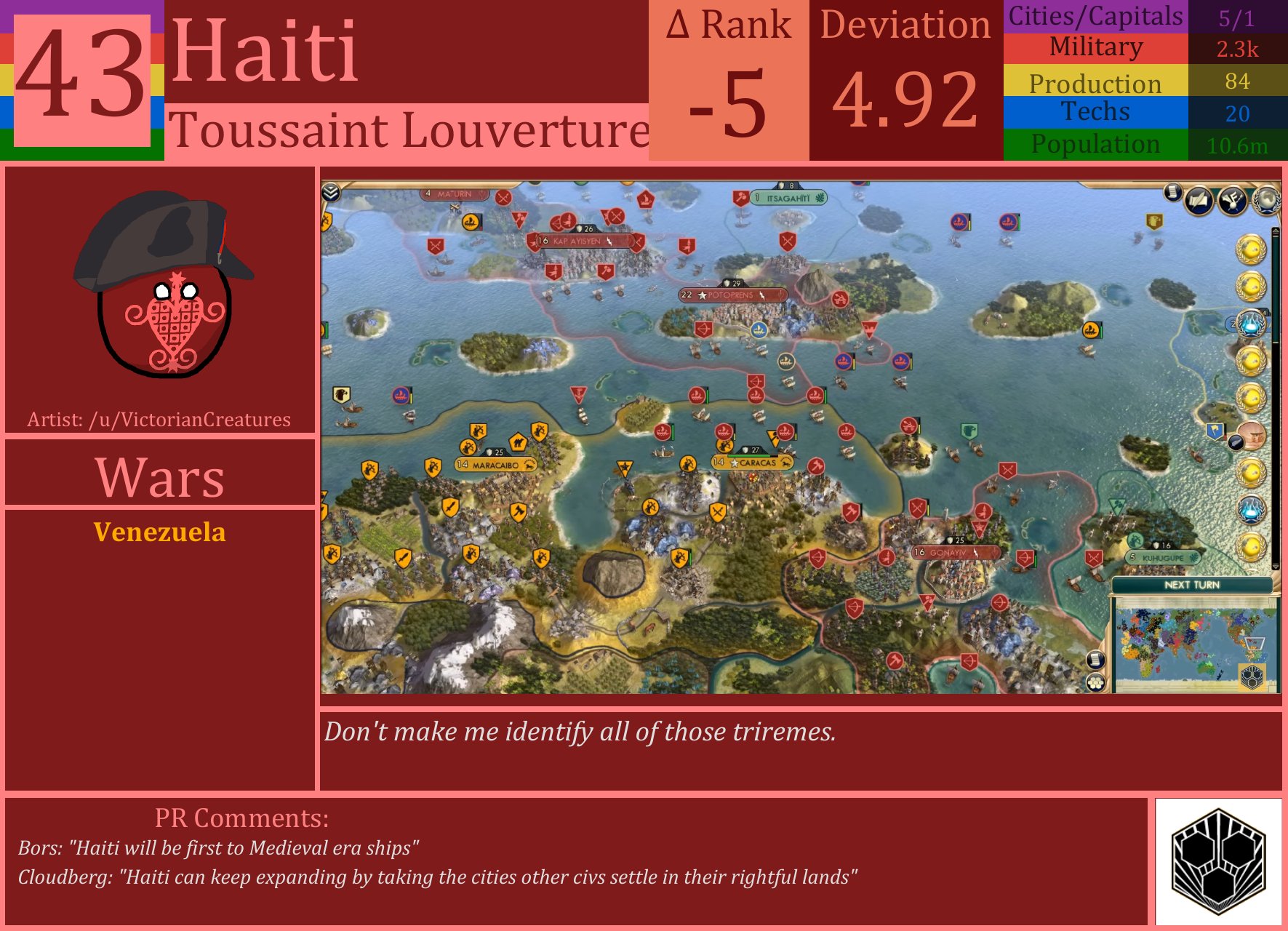
Homusubi: A picture paints a thousand words, and in this case, most of those words are Venezuelan Spanish variants on “argh”. Louverture is back to his old tricks, surrounding Caracas with triremes while the narrator's back was turned, and once again, it's anyone's guess who will prevail. In the short term, it appears as if Haiti will need to strike quickly, more than anything else, as there aren't many spare triremes ready and Venezuela has composites. The terrain is also favourable to Venezuela, allowing a clear line of attack on the slow-moving, low-tech units of the Gonayiv front line. However, in the long term, things look better for Haiti; they seem to have marginally more relevant production (they have less total production than their opponents, but presumably a lot of Venezuelan hammers are locked up in Central American cities which can't really help with Caracas and have their own problems anyway), and what is more, they can utilise the second line at Gonayiv, which includes such wonders of the modern age as pikemen. It looks like the key question here is: will Haiti sign another excruciating peace deal, or will we see actual progress this time, marking Haiti's undisputed entry onto the world stage and perhaps crippling their greatest opponent?
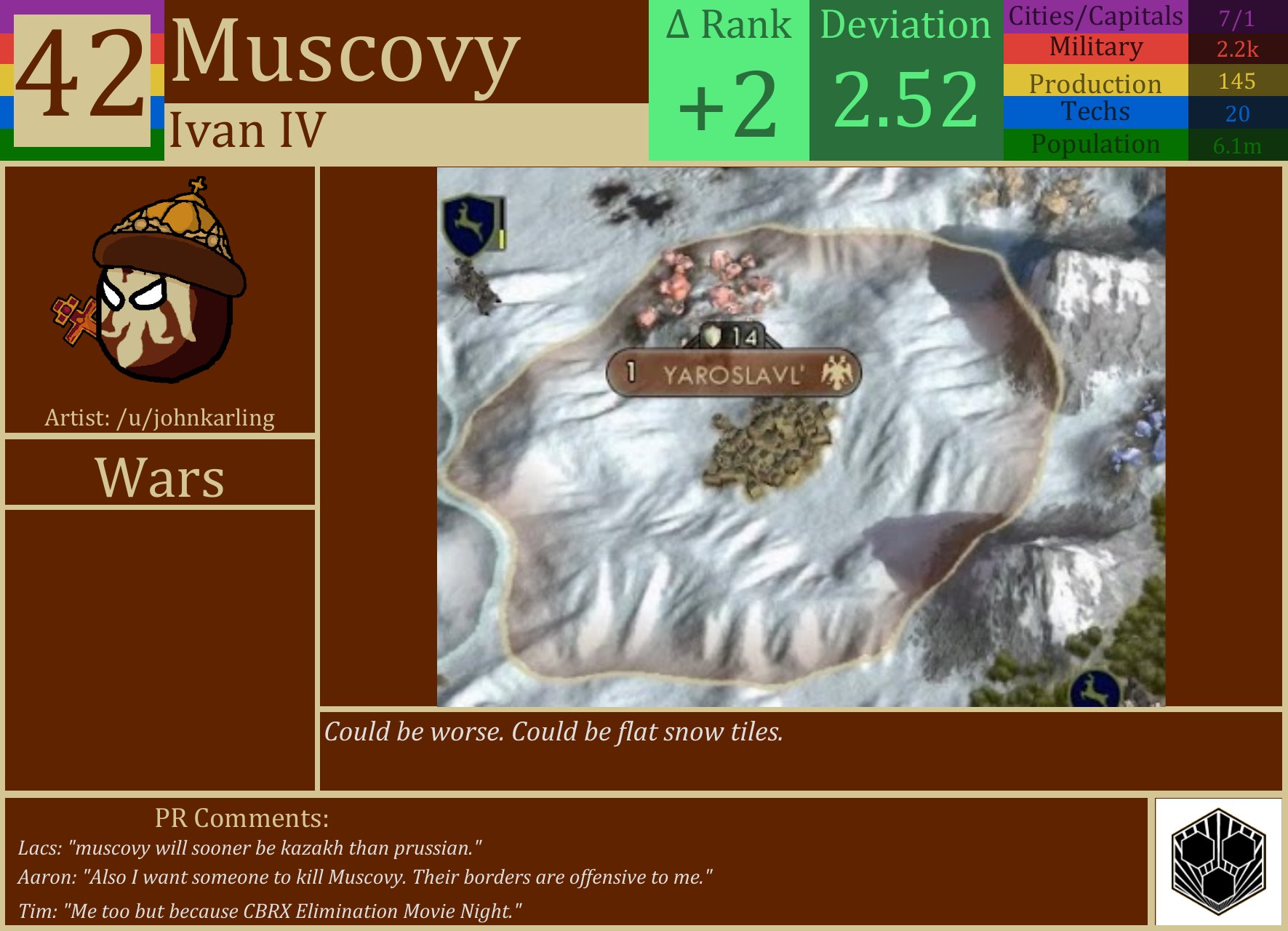
Reformer: Well. They're settling, yeah? Even if all that's left of free land is some frozen wasteland, the deity AI will still benefit from relatively useless cities. But the occasional settling will not save Ivan from the fact that he is still surrounded by some very powerful civs. Sami, Prussia and Goths are all very strong in statistics, and a war with basically any of the three would be devastating for Muscovy. Ivan's opportunities are beginning to dwindle, and at this point his best bet might be to wait for a coalition war on one of his neighbors, or perhaps for the Kazakhs to sufficiently weaken the Goths. Any observer would be right to worry for the Russian civ either way.

Aaron: You might think that getting attacked by two of your neighbours including the one with the largest most terrifying army on the entire cylinder would be bad news. However, the Kuikuro rise this week as they are actually winning the war, at least for the moment. Paradones has fallen fairly easily - to no one's surprise as it was already surrounded by Kuikuro cities. Now, however, the real battle begins as the Uruguayan hordes pour out into the jungle. The Kuikuro are famed for having invincible cities but this gigantic Uruguayan attack is going to test that reputation to its limit. The thick jungle that covers the Kuikuro lands prevents units from damaging Kuikuro cities until they are 1 tile away, severely hampering any attempts to conquer them. Funnily enough, their most vulnerable cities might be their two new Carribean colonies - with only a single trireme in defence, they're not going to put up any resistance to the small Uruguayan navy.
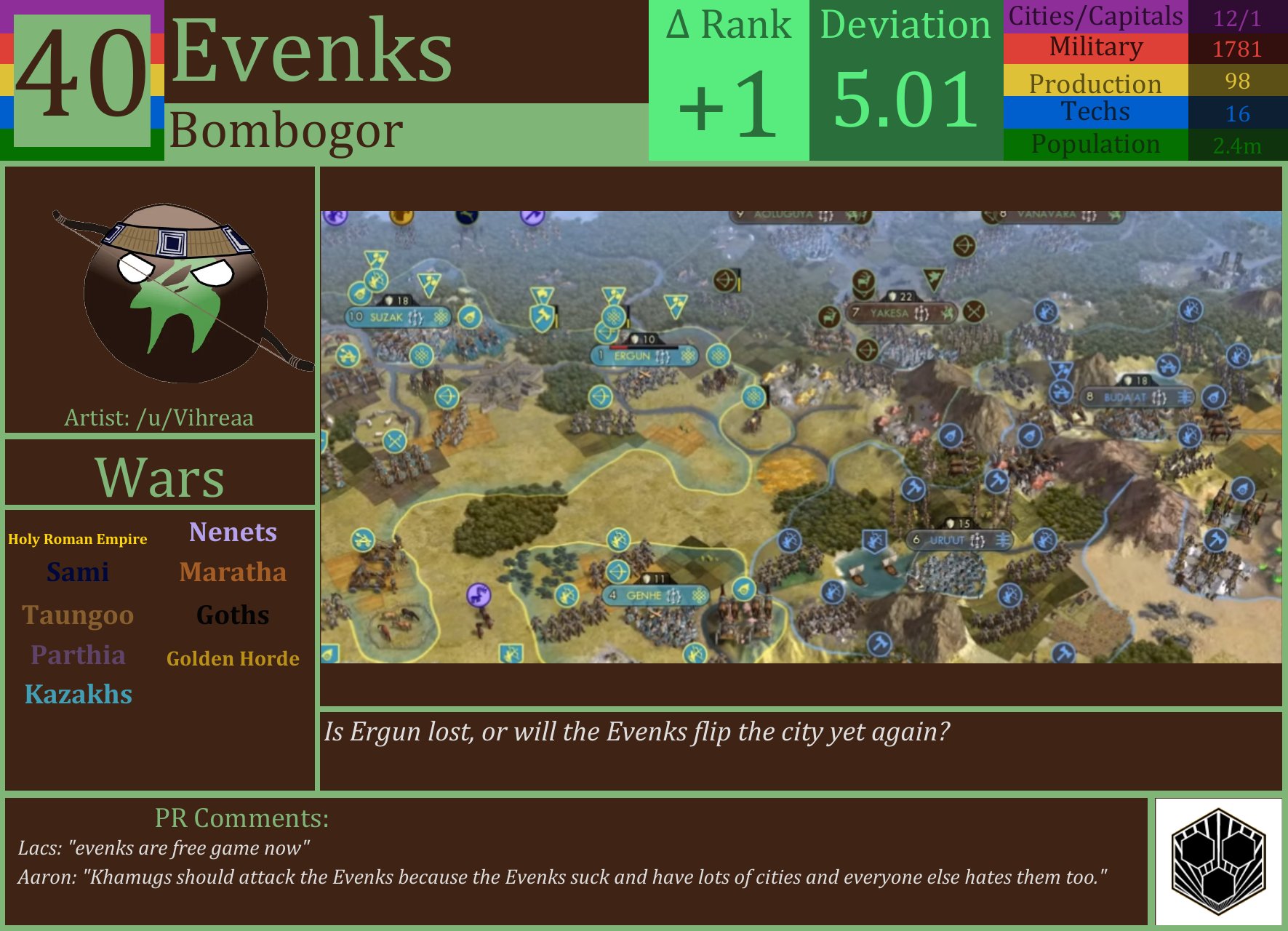
Andy: The seemingly endless battle for Ergun continues, although it seems that by the end of the part, the Evenks are starting to withdraw and cut their losses. Overall, the Evenks are doing a solid job of minimizing losses and maintaining territorial integrity, although this should probably be attributed more to Kazakh disinterest in prosecuting the war beyond what used to be the Evenk-Kazakh border. For a civ the entirety of the cylinder despises, the Evenks aren't doing half bad.

Aaron: Nothing has really changed for Madagascar. They are 13th in my stats page - a level comparable to Songhai. Yet, despite 2 new cities on 1 tile islands, they do appear to be trapped. Attacking Beta Israel is still their best shot at getting off their island, as long as they don't bungle the invasion like last time. Zimbabwe continue to be scary. Further afield, Oman might be a good option for expansion?
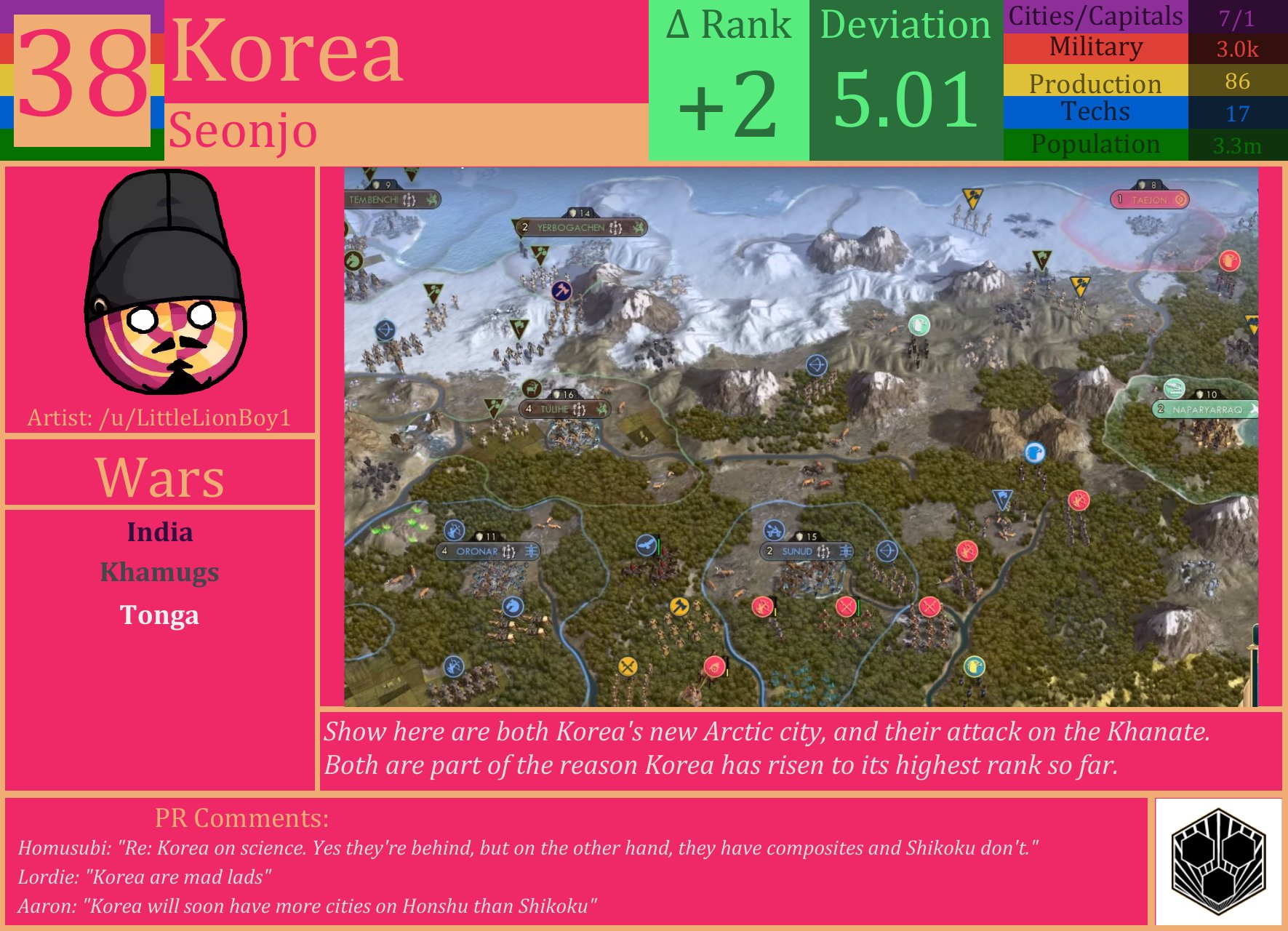
Msurdej: Korea had a good part this week, increasing their city count by 40% and building up his armies once again. They also gain a target for that army, sending a detachment of it to attack the Khamug city of Sunud. But it seems unlikely that Korea will take it (though they could nab a settler), as their army is still rather middling. Worse still, their production and (shocking to Sejong) science are lagging behind, with Seonjo trying to wrap his head around Theology. While there's a lot to be hopeful for if your a Korea fan, there's still a long way to go.

Msurdej: Nazca riders take a crash this week, as Cahuachi loses Paredones to the Kuikruo. This puts the boys in green within spitting distance of the Nazca in terms of stats, and with both civs trying to expand out into the islands around South America, we could see these two changes spots on the SA pecking order. To prevent this, Cahuachi is throwing his lot in with Urugauay, hoping to retake his city and more, but the Nazca are gonna have to show off some Blackfoot levels of sniping if they want to regain the ground they lost this part.
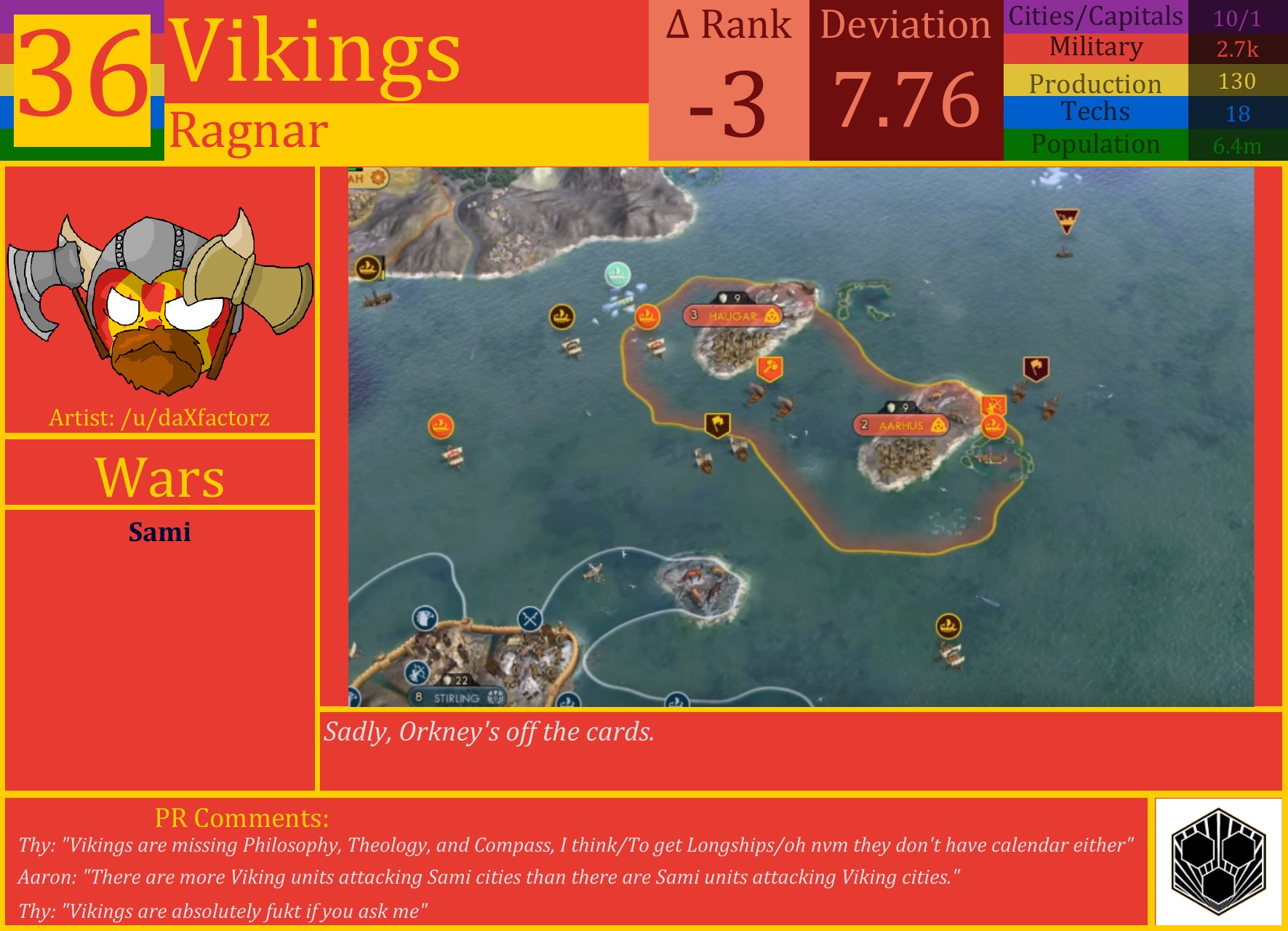
Lacsirax: The second most interesting thing we learnt about Vikings this week: the reason they're not building longboats is due a typographic error in the civ description, and it actually requires four more technologies than they currently have. That's good and bad news, really: we'll be waiting a long time before we see them, but at least it's not Ragnar being an obstinate fool. And now the most interesting thing we learnt about Vikings this week: they settled the Faroes and Shetlands! These are interesting little seaports that could definitely prove useful production bases if they attempt an invasion of the Isles, though currently even HRE have naval superiority over the Vikings in the North Sea. Given that the chances of taking a city from the Sámi seem almost as slim as the chances of losing a city to the Sámi, Ragnar would do well to reinforce these isles and bring a little valhallic fury to the petty Britons.
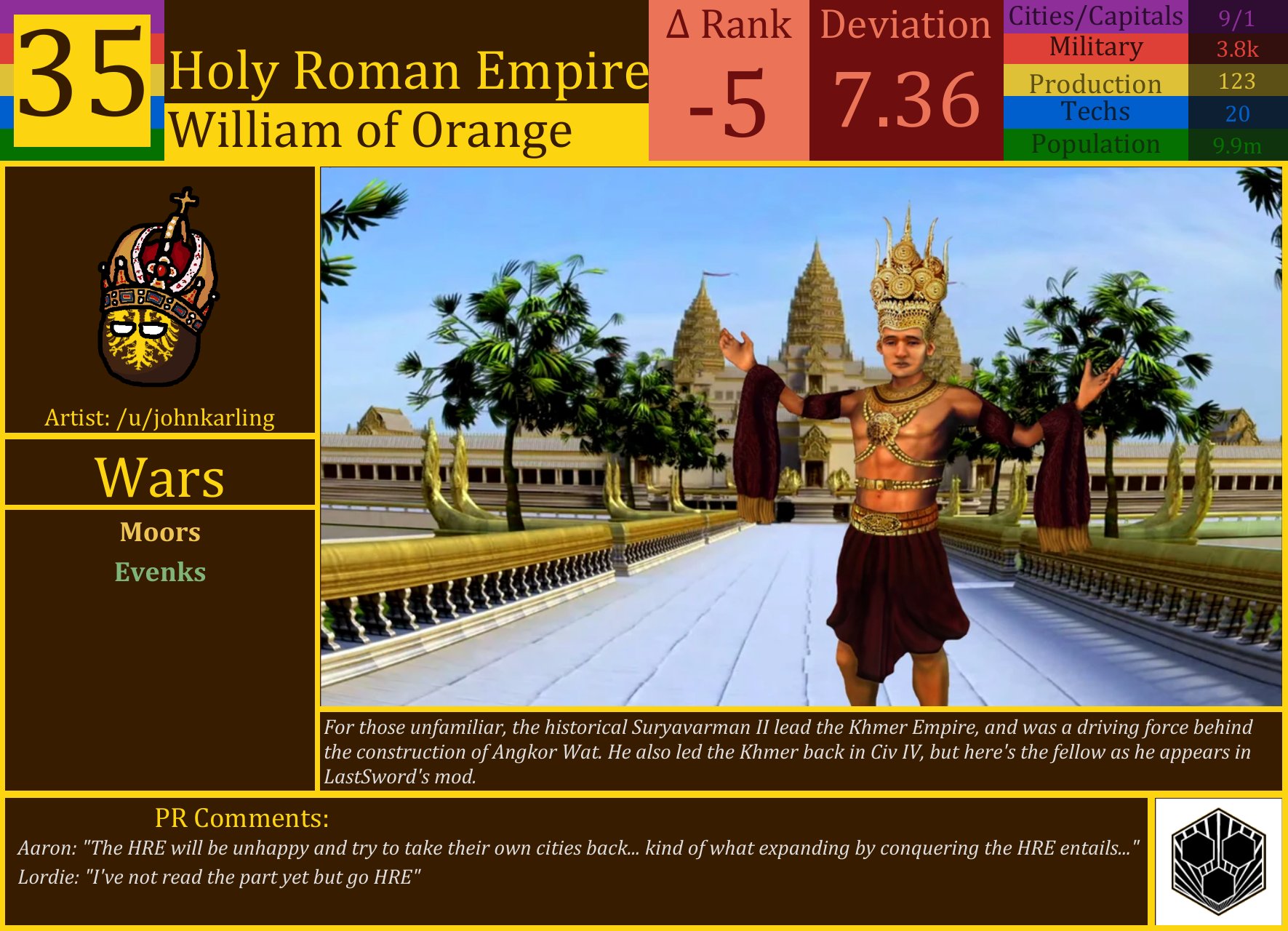
Lacsirax: William's impressive reign of the Holy Romans comes to an end, and in his place Suryavarman II is appointed. It's far too early to judge the new gaffer of course, but early signs aren't too positive as he drops 5 ranks and below neighbour Venice for the first time. Still, it's probably fair to put the loss of Cologne at Wliliam's feet (maybe this military blunder was why he was forced out!), and Suryavarman's first action as leader was to negotiate a treaty with Czechia that handed them control of Brno. There's also a slim chance the German navies can wrest control of the distant Moorish colony of Al-Mariyyah on Iceland, paving a path for the HRE to expand into the New World. Here's to Suryavarman!
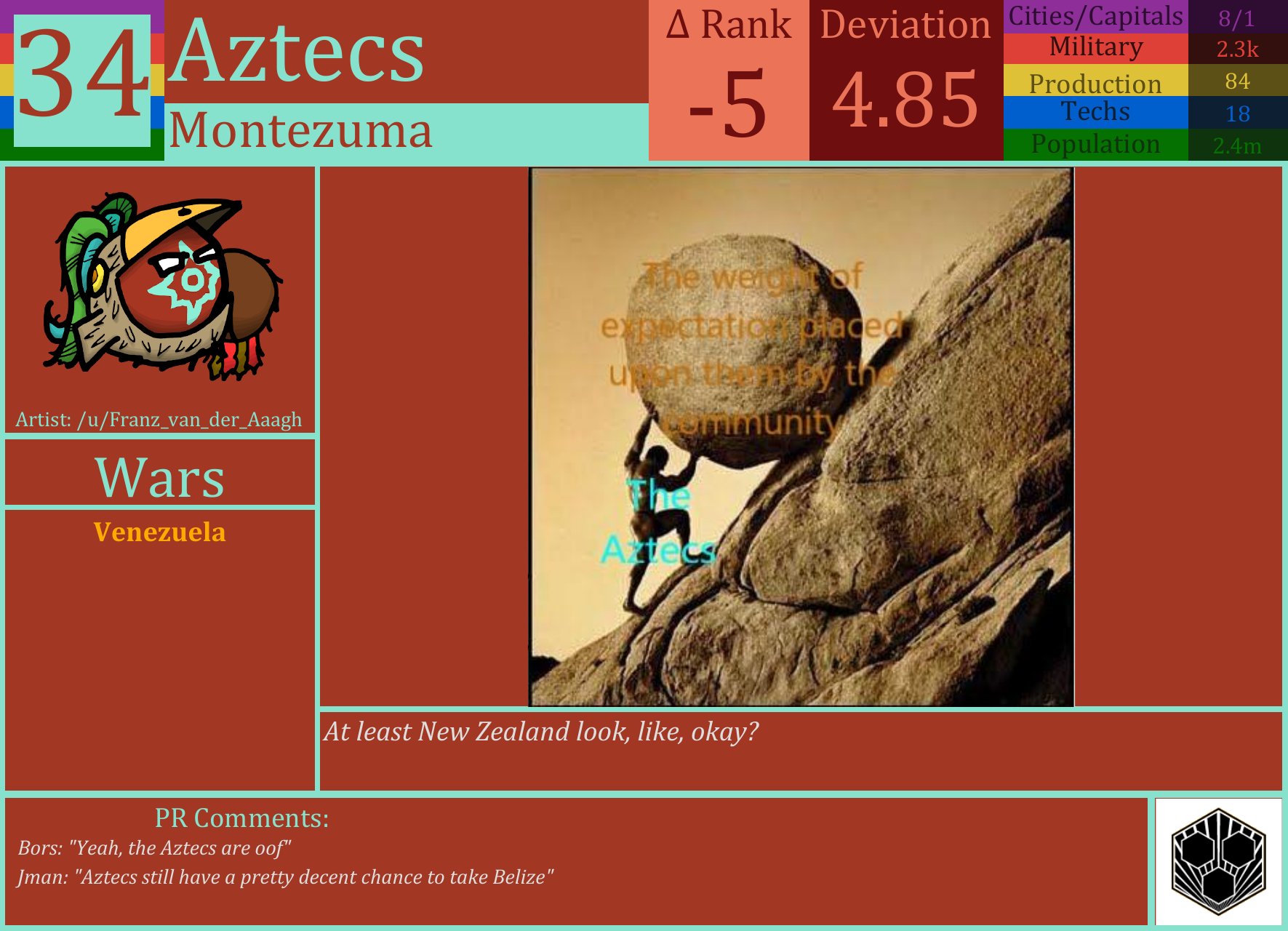
Lordie: The Aztecs slump a bit this week as they continue to fail to press any advantage whatsoever into Venezuela, being incredibly toothless Jaguars. The fact that the Aztecs don't even control Belize is quite embarrassing really. There's always the chance that they come back into it, but it seems pretty unlikely as it stands. With the Apache or even Haida looking strong to the North, it really does seem like the Aztecs will continue the disappointing Mesoamerican trend of being squeezed to death by stronger neighbours.
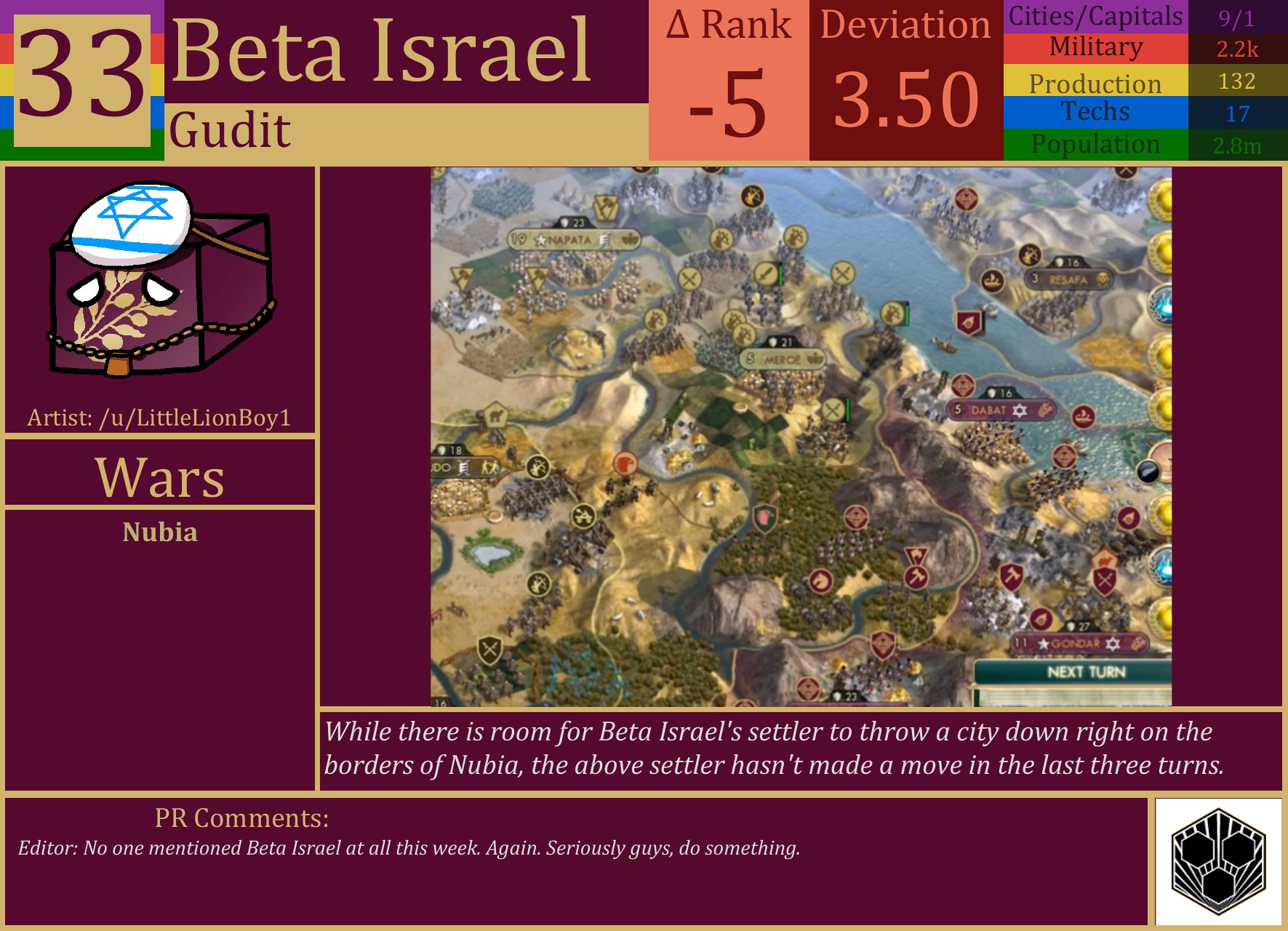
Andy: Overall, Beta Israel has had a rather lacklustre part. The war against Nubia has now turned into more of a cold war than a hot one, with shots fired at Meroe, but no army to move against the city. Meanwhile, Beta Israel has made no settles, no aggressive moves, and no expansions. As such, Gudit falls five ranks, not from having done something explicitly wrong, so much as from having done nothing right either. In a fast-paced world where more is key to survival, and from there victory, Beta Israel just isn't doing enough to get more.
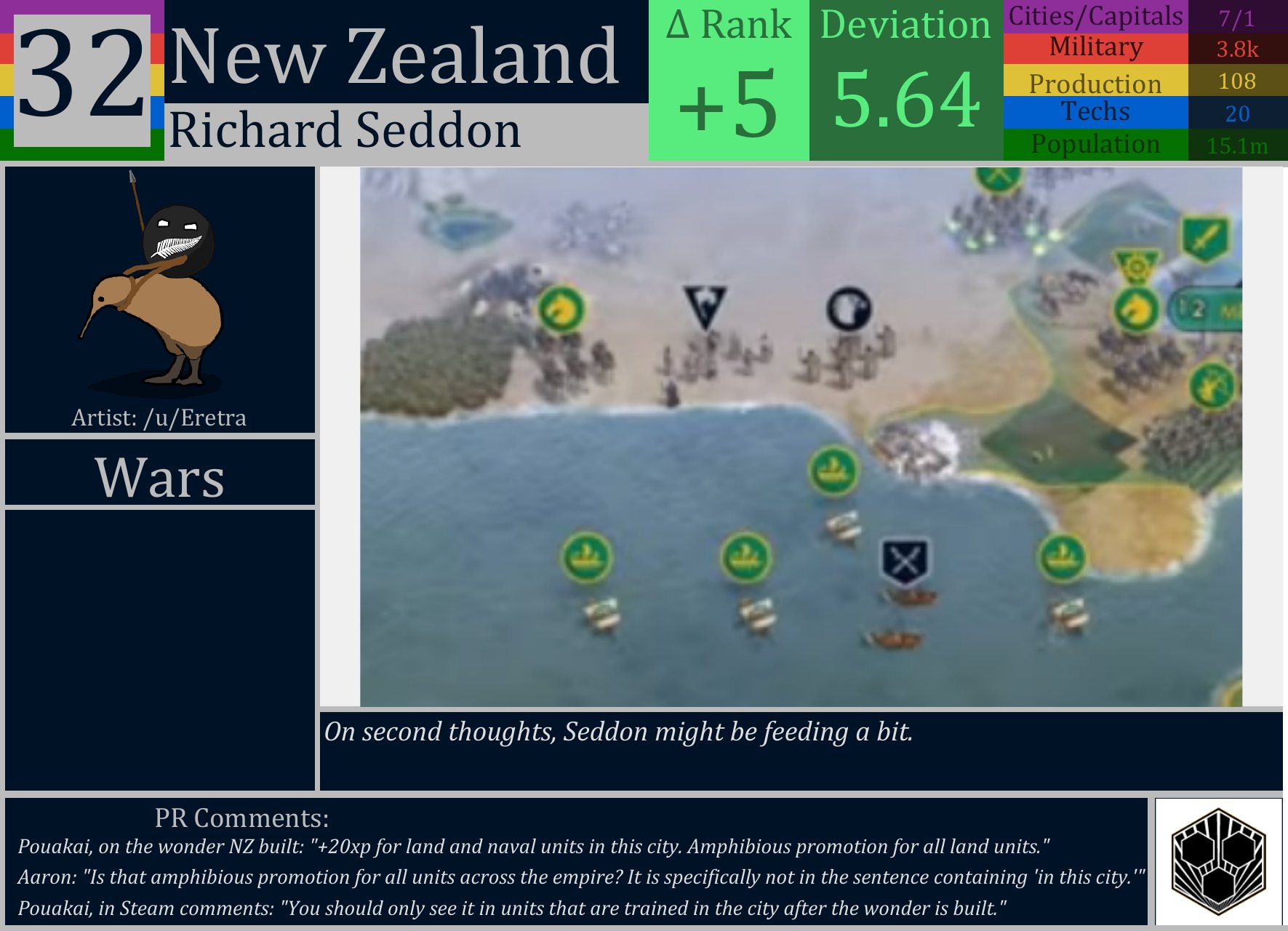
Lordie: The Kiwis have made themselves into a fairly midtable civ, however it's not an uncommon opinion that with the burning of their holdings on Australia, they so too incinerated their chances of winning. However, with Australia looking weaker, it's not too late for King Dick to stake his claim on the continent, with him having a settler aimed at the southwestern coast. Furthermore, with Tonga looking to feed straight into them, they could see themselves gaining some nice and easy cities. Things are looking up for New Zealand, but we'll see if it goes anywhere.
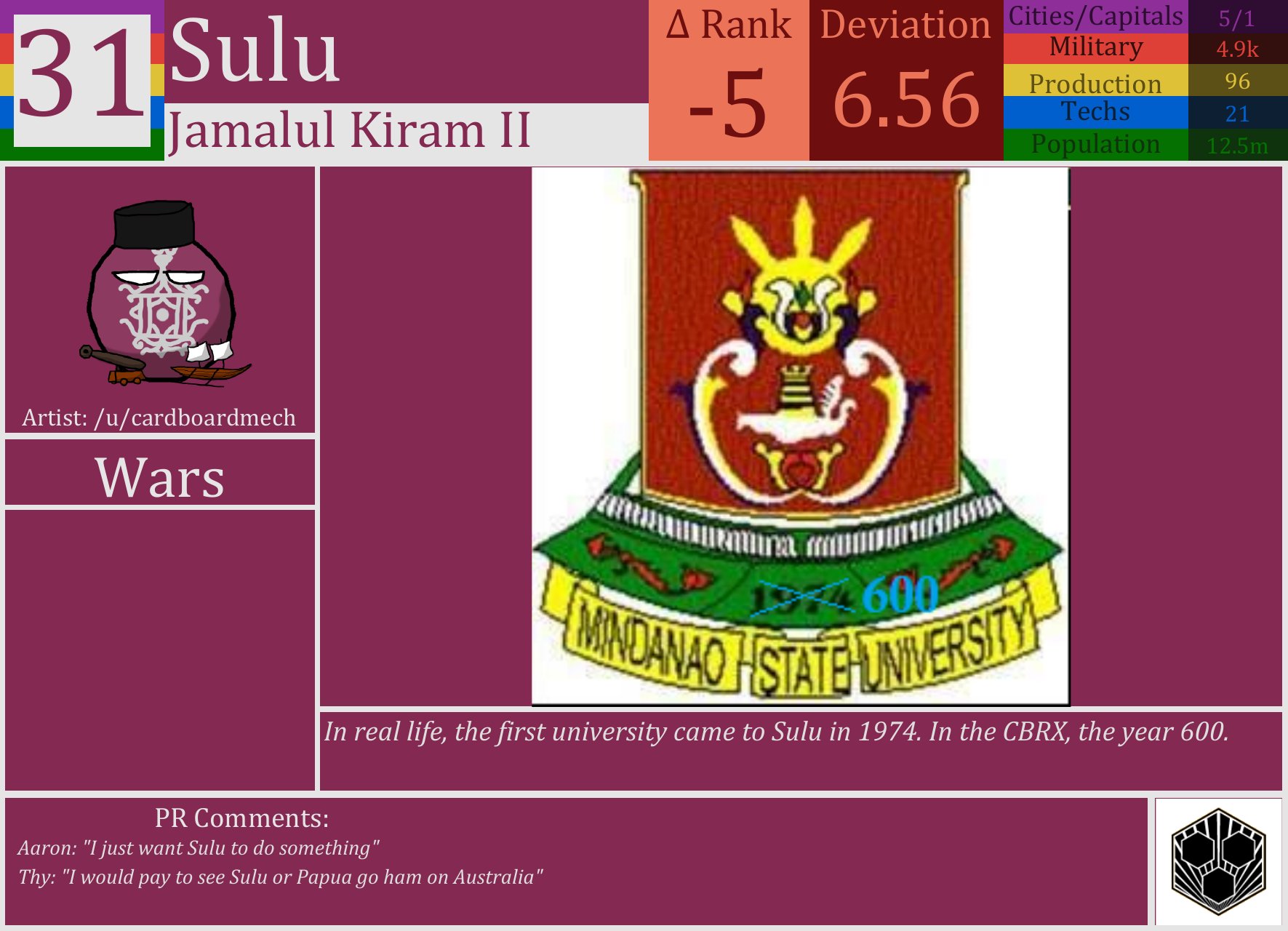
Aaron: Sulu continue to be tech gods. Not content with being number 1 in effective science generation by a big margin, Jamalul doubles down by being the first civ in the entire cylinder to research universities. Once finished, they should boost their science to even more ludicrous levels! Though this extreme science focus has come at a cost: they haven't researched the next tier of boats, while the other Pacific civs (Papua, Shikoku and soon New Zealand) have, which means they will be temporarily vulnerable. Though Sulu does have a settler out, their rate of expansion is still very low, and other civs (in particular Australia) are grabbing their lands from under their noses. If I were Sulu, I would nip the Australian problem in the bud by declaring war and capturing all those weak undefended cities and maybe even grabbing a foothold on the Australian continent.
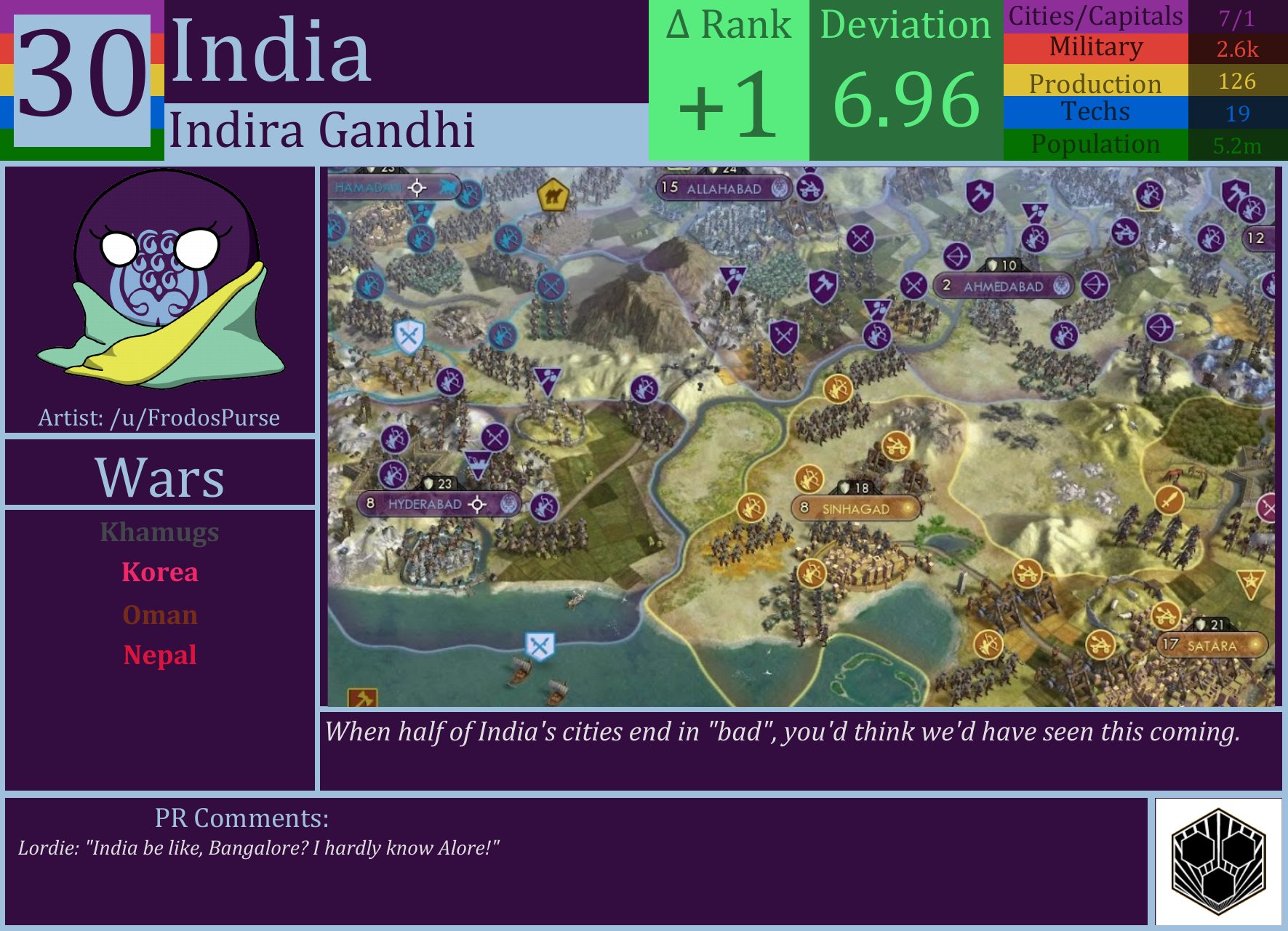
Lacsirax: Against all odds, India gained a rank this week, and for that you have to thank, um, statistical noise and a few other civs' shortcomings. They just about clung onto Hyderabad - remember, that was an Omani fleet, not exactly the sort of civ you want to be losing cities to. Indeed, they were less lucky up north, where their recent outpost of Bangalore fell to a lost Nepalese task force. Yet back home, everything stays stagnant. Nepal fail to press on Delhi, India fail to press on Gorkha. The world keeps turning. It's harder and harder to see India's redemption arc; a coalition war against Nepal with Qin or a more competent Maratha might set the gears in motion, but even then, what next? Currently, India and Nepal look like dead ringers for Mk 2's Afghanistan and Tibet - but those two civs had no Parthia or Maratha to worry about.
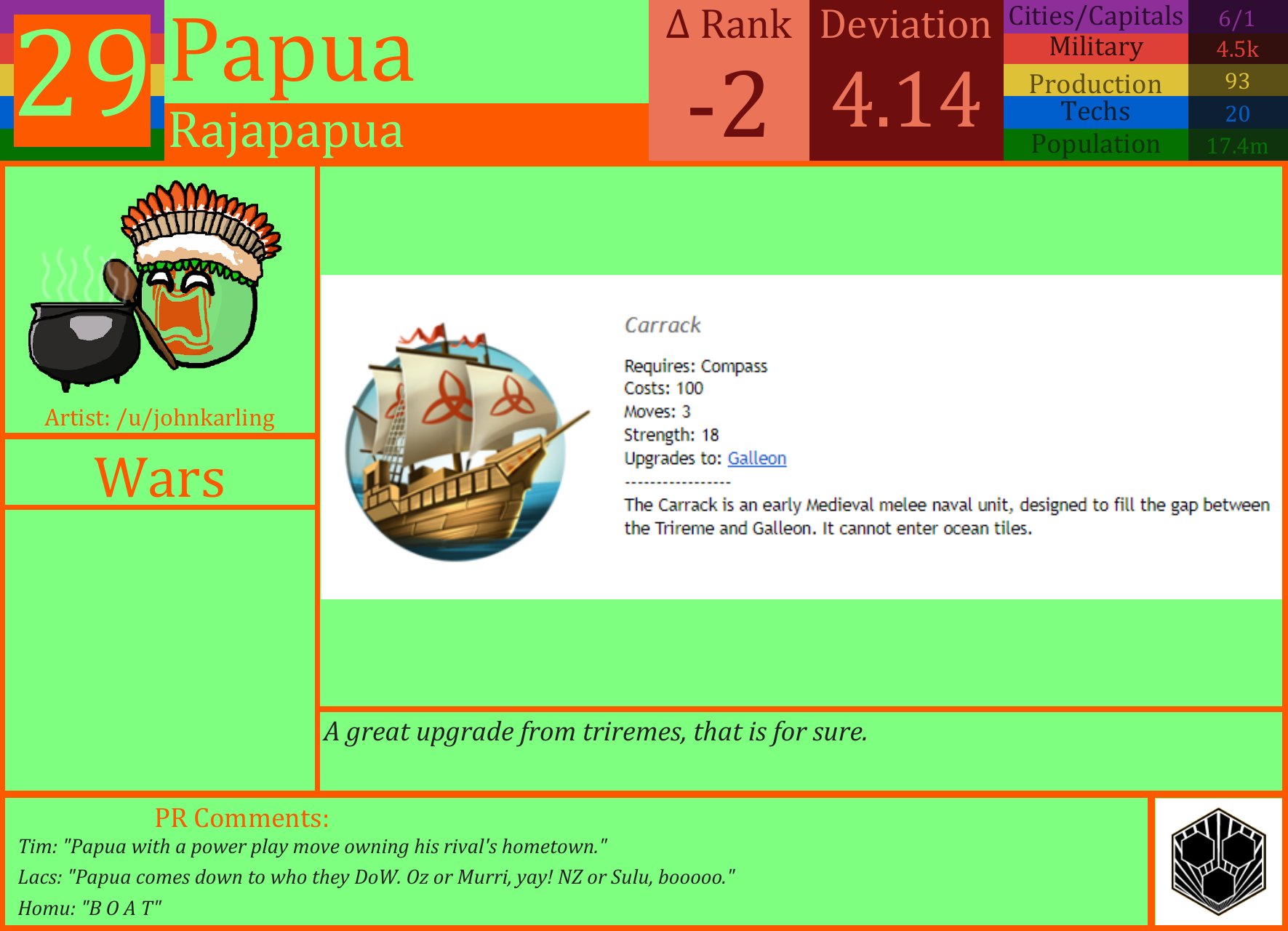
Reformer: Time for regional naval supremacy! Papua has become the first civ in the region to research Compass, and thus the first civ with access to fresh Medieval naval units. Rajapapua seems to have mainly focused on upgrading his old triremes into carracks, forgoing galleasses for the time being. Obviously, a good medieval navy will require ranged units, but the Papuans have time, as the only other civ reaching Compass soon is New Zealand. As before, Rajapapua has the opportunity to attack the barely-defended Australian cities west of his empire. And as we know, Rajapapua is fully capable of such an invasion...
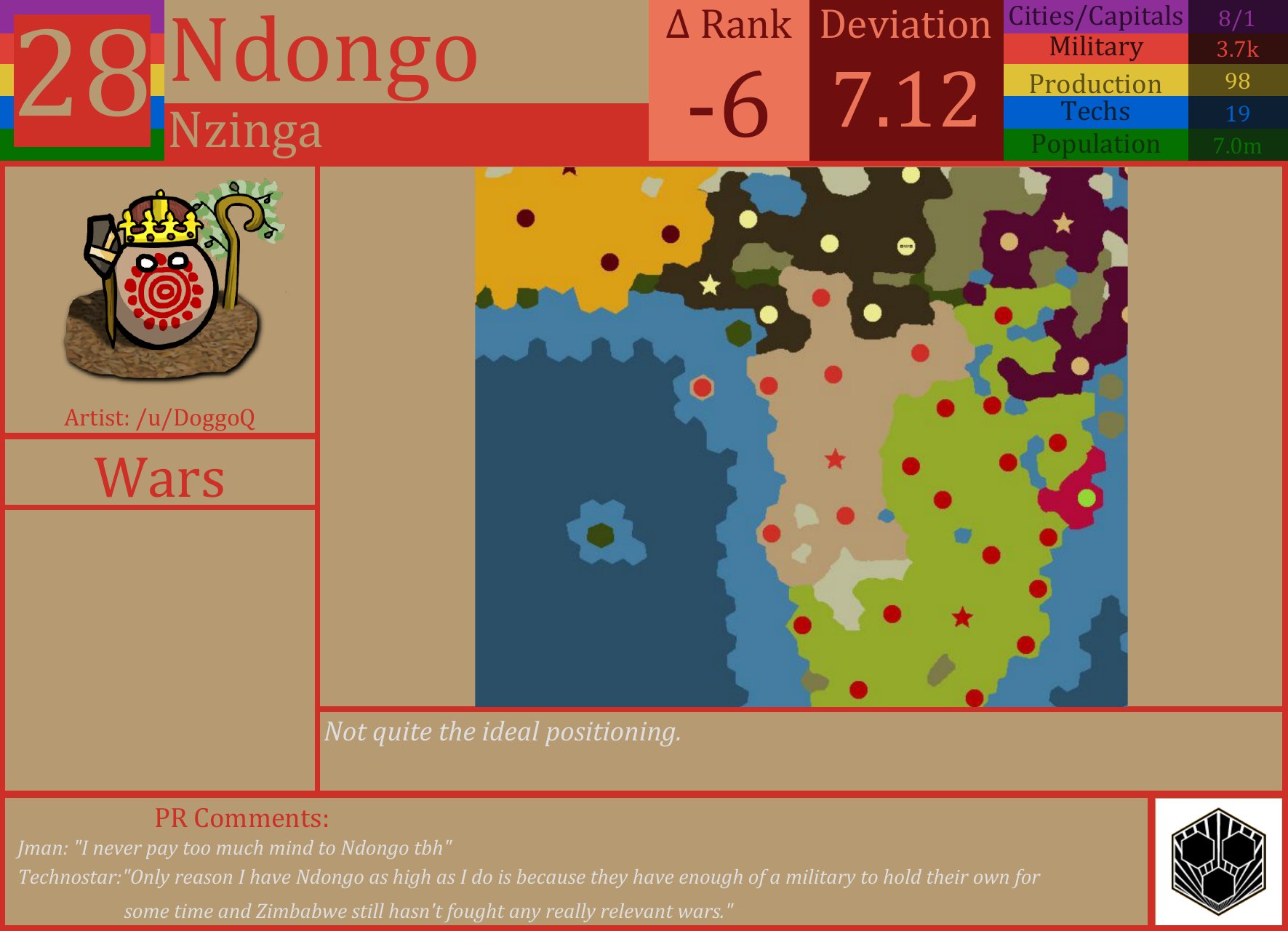
Reformer: Sub-Saharan Africa seems to be the quieter half of the continent, as the most notable thing that happened down here was Zimbabwe's wonder spam. For Ndongo, this means a mixed bag: Civ 5 is a game of snowballing, meaning the longer Zimbabwe is left alone to turtle with its massive quantity of cities, the stronger it naturally becomes. On the flip side, however, the longer Zimbabwe sleeps, the more time Ndongo has to be opportunistic, and improve her standings before the inevitable war with their southern neighbor comes along. But if Benin is impenetrable and Beta Israel is hardly worth the shot, what can Ndongo actually do? Not much, that's what.
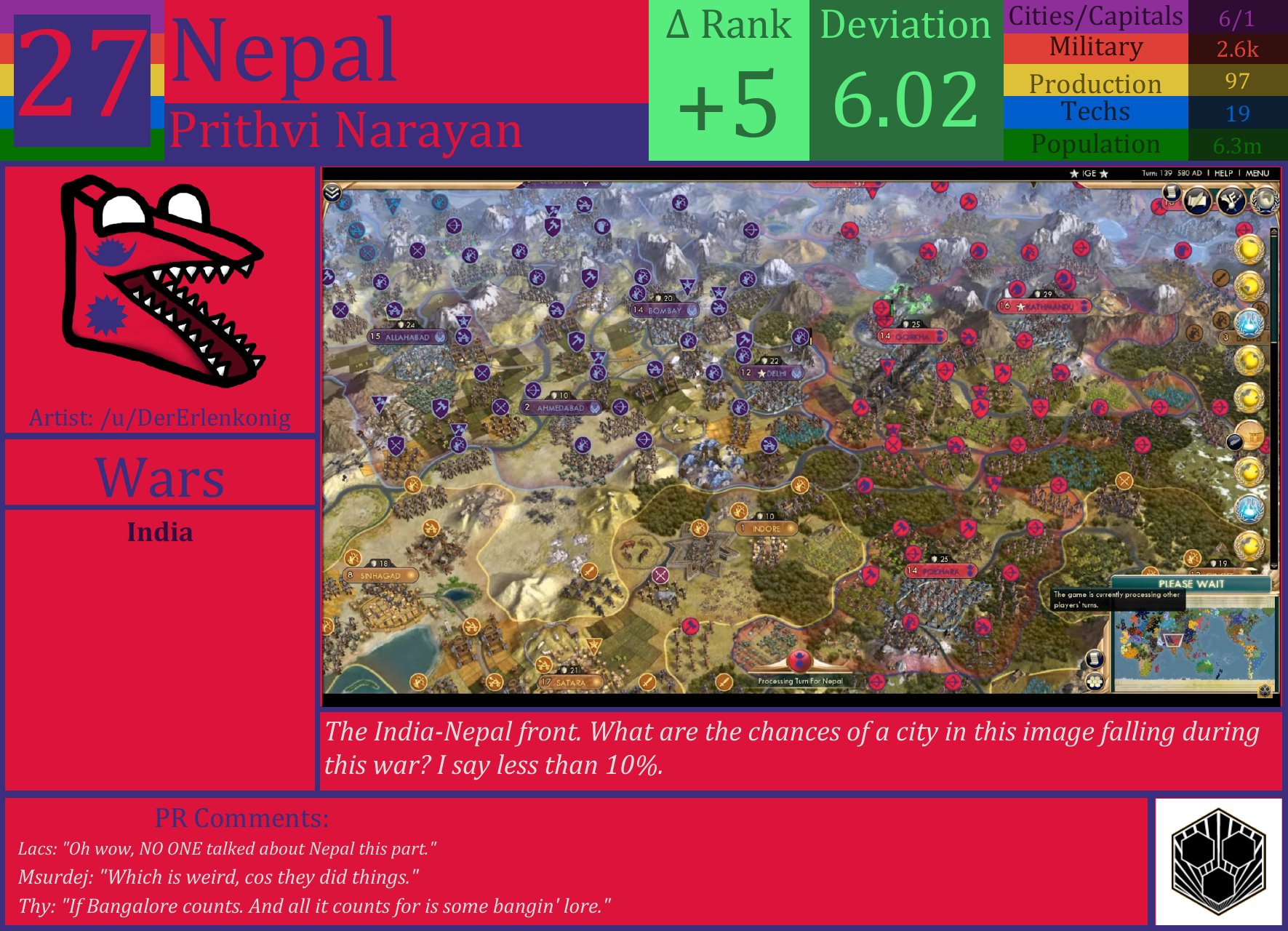
Techno: As the parts progress, we become increasingly confident in Nepal's ability to avoid the game-ending loss of cities. In fact, Nepal has even managed to conquer Bangalore, marking the first city conquest by any Indian civ. Granted, this conquest took place far outside the Indian subcontinent, leaving the subcontinent still suspiciously devoid of any civilian casualties, but it's a start that we hope Nepal can build on. That being said, Nepal certainly isn't top-tier by any means, as they are rabidly losing room for expansion and their small empire has a long way to go compared to the higher ranks.
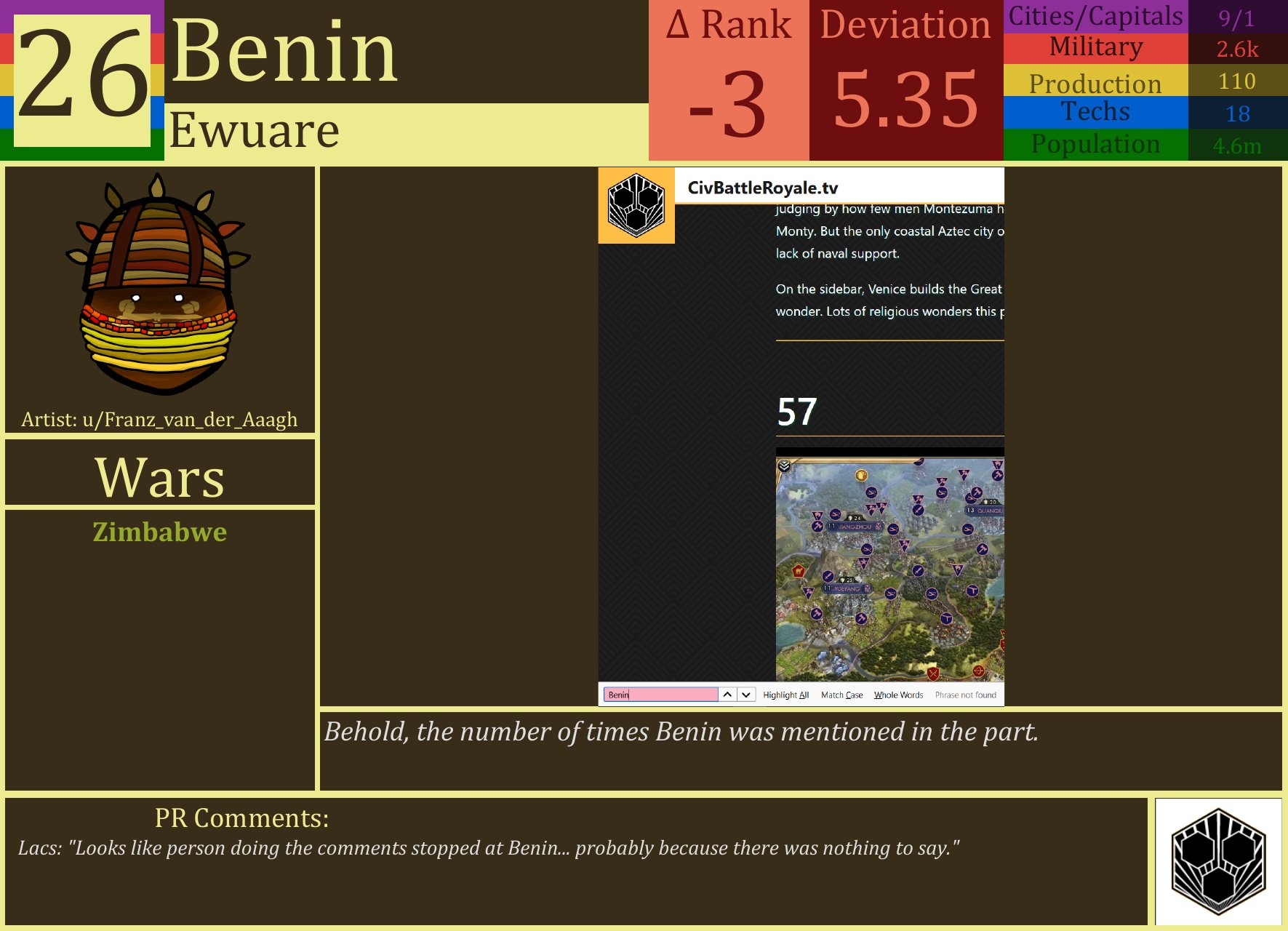
Andy: As the underdogs of the world rise, the stagnant fall. While Benin has continued their effective turtling, turtling isn't what wins games, nor is it what wins regions. While Benin's stagnation can be explained in terms of the very powerful (relative sense) neighbours sandwiching Benin between the two of them, it still doesn't provide an avenue to victory. Benin has found themselves trapped in a dead end, and if they don't pull off something big, they'll be staying there until the end.
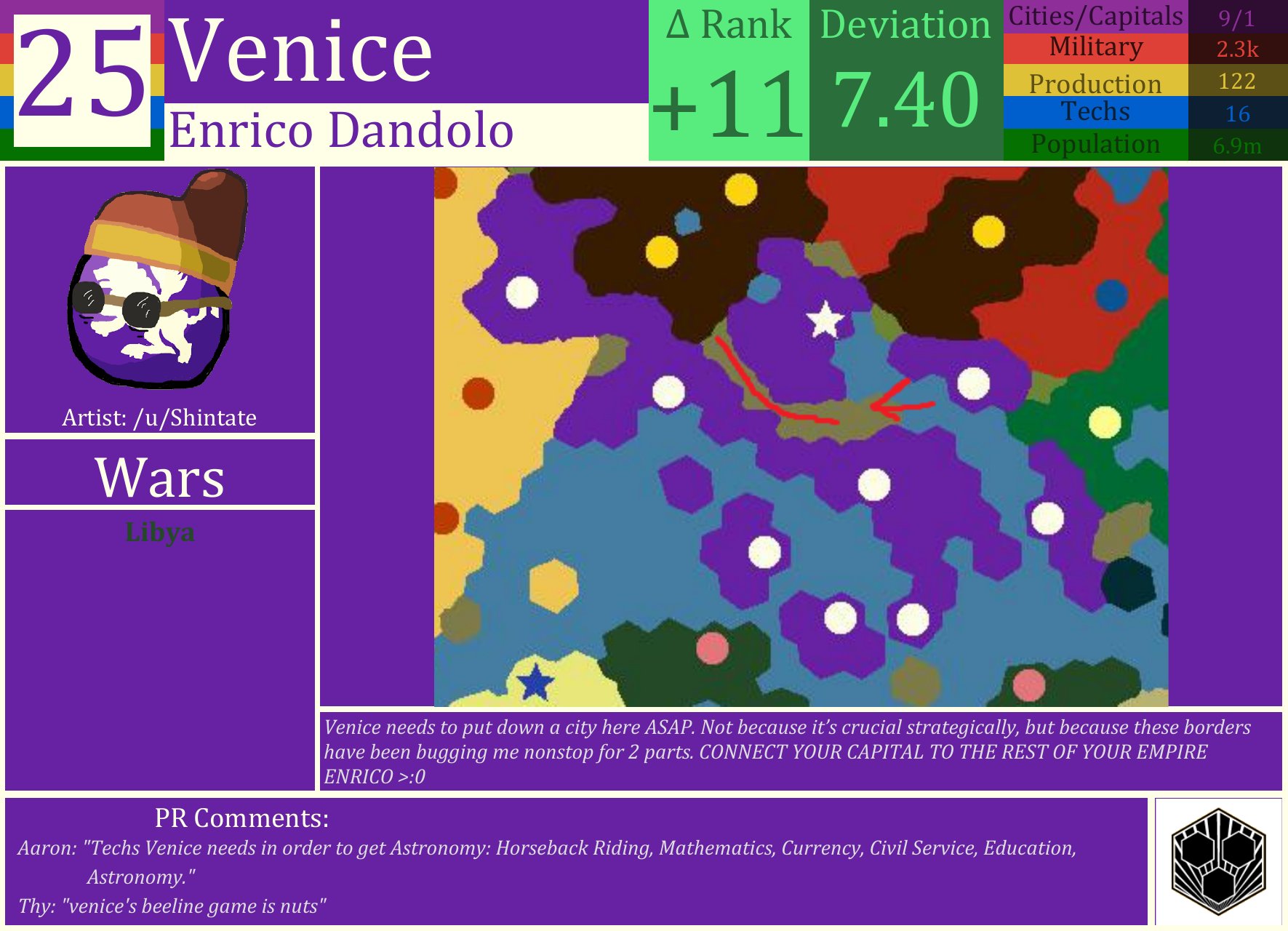
Bors: Venice continues to impress, as their empire grows stronger and their navy continue to spread. Enrico Dandolo showed naval prowess in this part, managing to become the 4th, and so far final, owner of Malia, the formerly Minoan city. Adding to this, Venice waged a more successful war against Algeria than even the Songhai. Their biggest weakness currently is their abysmal tech, where they only outperform Canada (14), Scotland (14), and the Turks (15). This means that they’re strong navy may soon find itself invalidated, making conquest harder to achieve. But at the very least, Dandolo now has a solid 8 city core and a little bit of time to improve his nation without the fear of invasion.
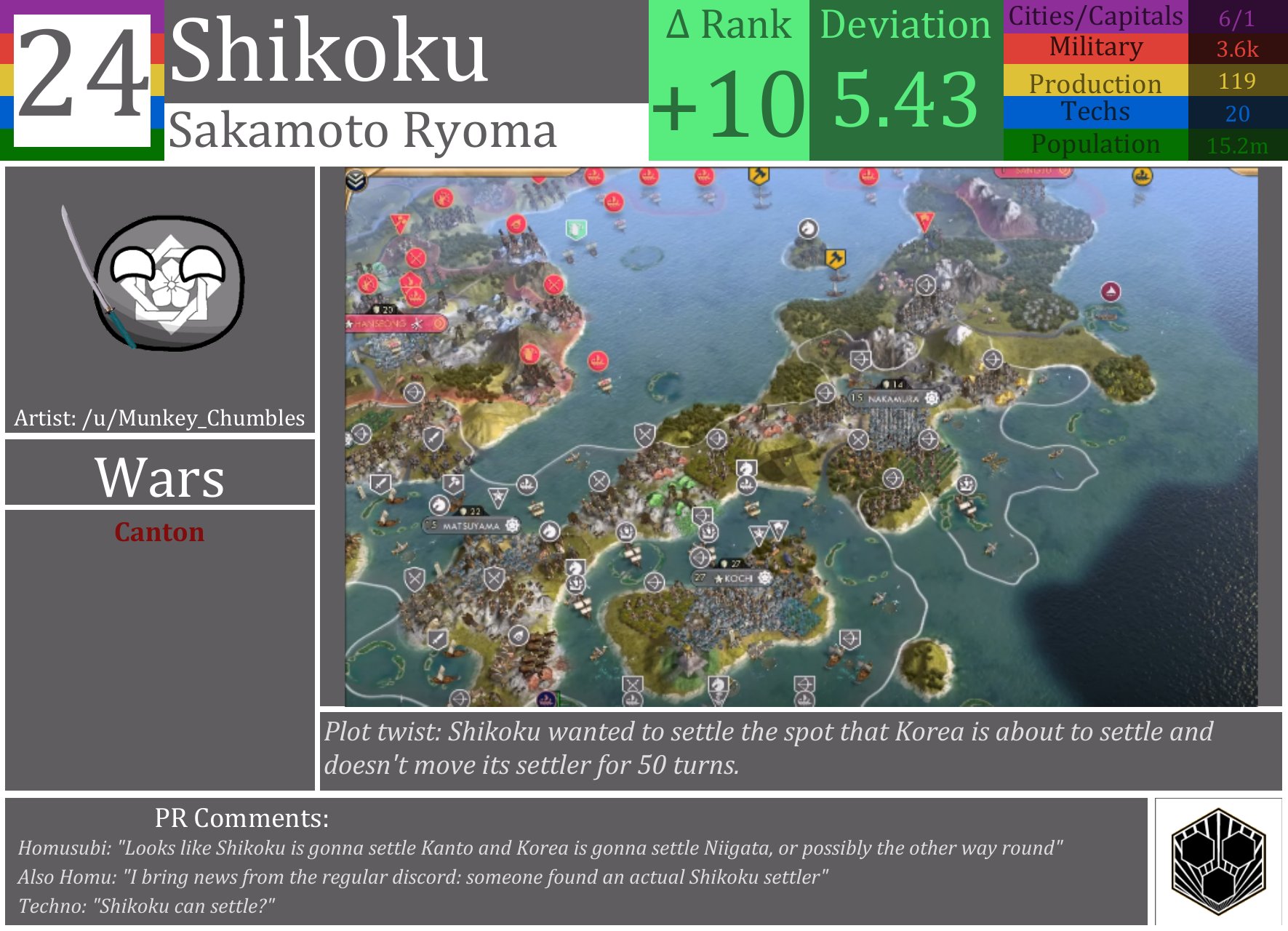
Adm. Cloudberg: Shikoku surges ten places ahead after capturing a Cantonese city that no one thought they could take. Also helping Ryoma rise through the ranks is the presence of the first settler Shikoku has made since part 1, which could help them secure more of Honshu before Korea eats it all. And on top of all that, Shikoku is one of the first civs to build a medieval navy. That said, this might be a classic case of power rankers overreacting to a previously mediocre civ suddenly doing better. Korea is still going to occupy at least the northern third of Honshu, which is frankly embarrassing for any Japanese civ. Can Shikoku live up to the hype that its rank implies? I guess we will find out in the next part.

Andy: Selk'nam falls three places, in the face of convincing Uruguayan dominance. Paysandu was their chance to change the course of history, and they blew it. While there's no doubt Selk'nam will be a tough enemy for Uruguay given the terrain, the fact that Selk'nam's army is currently less than half the size of its Uruguyan counterpart means that the odds are stacked firmly against Xo'on Uhan-Té. While the Selk'nam aren't anywhere near death yet, they're effectively the Kongo to Uruguay's Boers. It's only a matter of time.
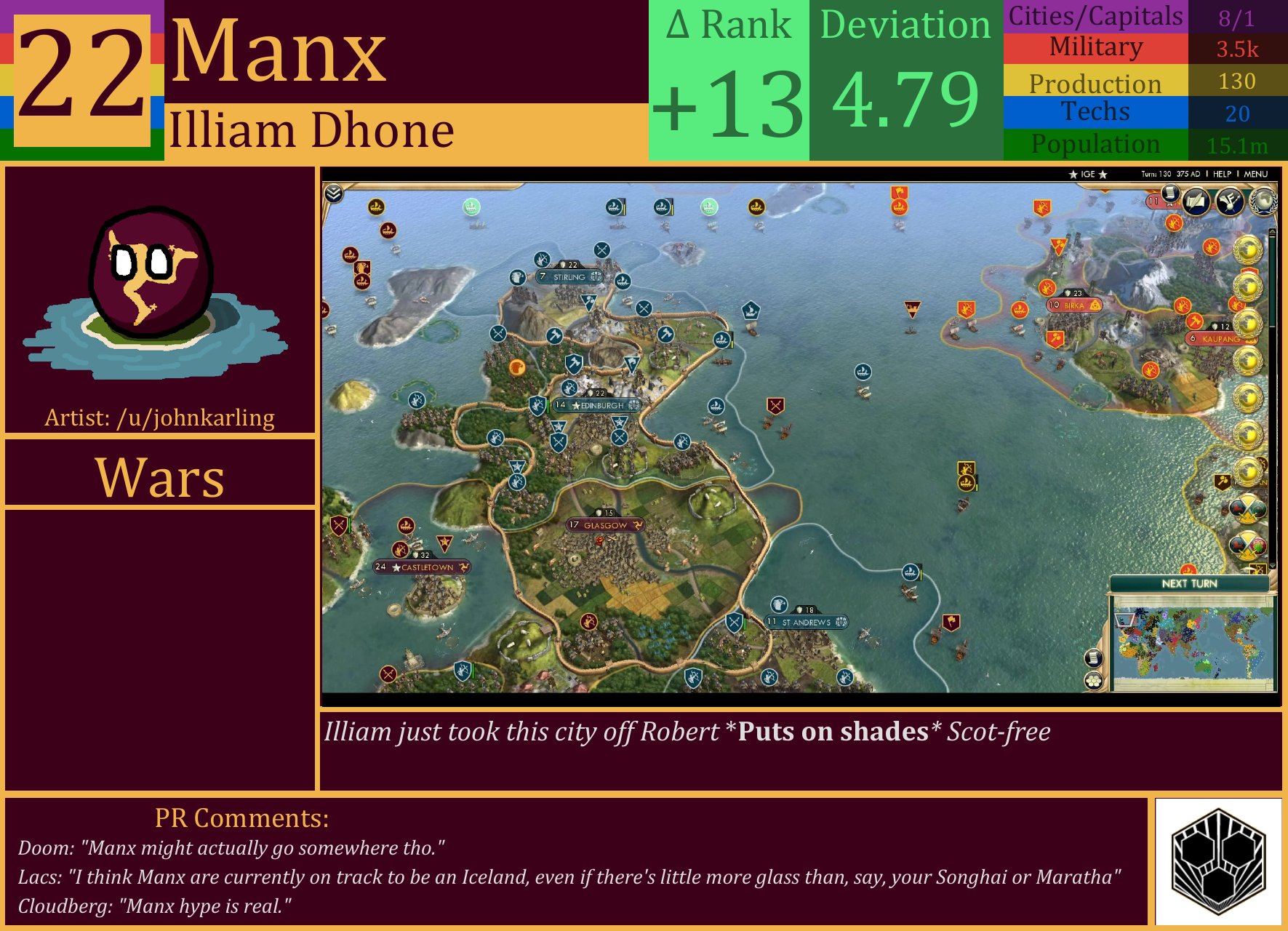
Msurdej: Things are coming up Manxhouse! In addition to their Greenland colony, Dhone's managed to get himself a pair of colonies in the Americas. But perhaps his greatest achievement of all was making peace with Scotland, AND TAKING GLASGOW FROM ROBERT.
With Glasgow under their thumb, and cities off by a weak Canada, Manx is now in a good position to be the dominant force on the Isles, and possibly even the whole Northern Atlantic.
With Glasgow under their thumb, and cities off by a weak Canada, Manx is now in a good position to be the dominant force on the Isles, and possibly even the whole Northern Atlantic.
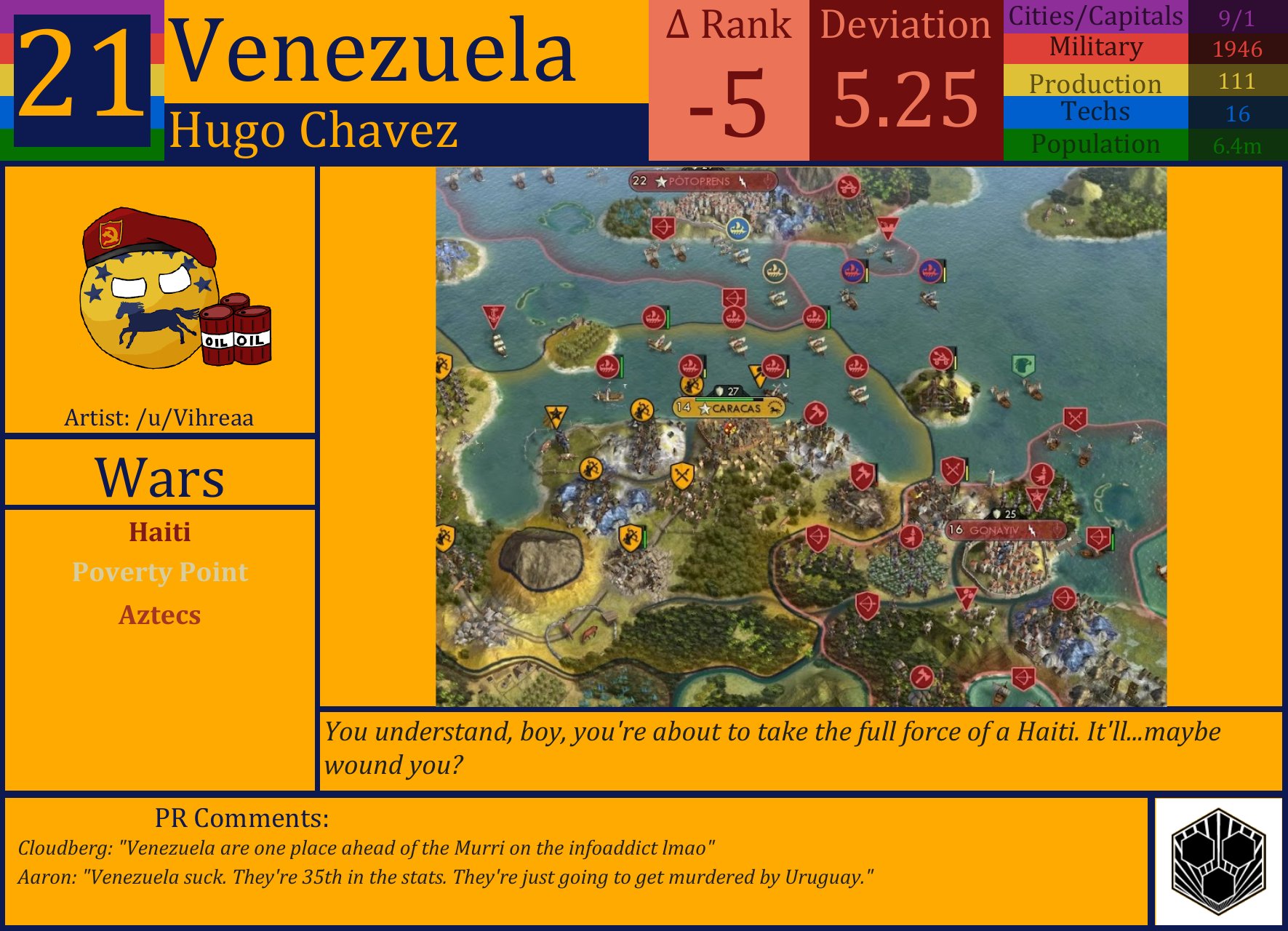
Reformer: While the coalition has mostly dispersed through peace with both Nazca and Uruguay, two major enemies to the Venezuelan cause remain: Haiti, and the Aztecs. While the latter has proven to be rather ineffective in attacking through the jungles of Central America, the former has opted for the deja vu. As of the latest turn (Turn 140), Caracas is once again under siege by a combination of the Haitian army and navy. Fortunately for Caracas, Toussaint has in his obsession to recreate the first invasion brought rather outdated units to the frontline. With the Siege of Caracas carried out by archers and warriors, is Hugo Chávez actually all that concerned?
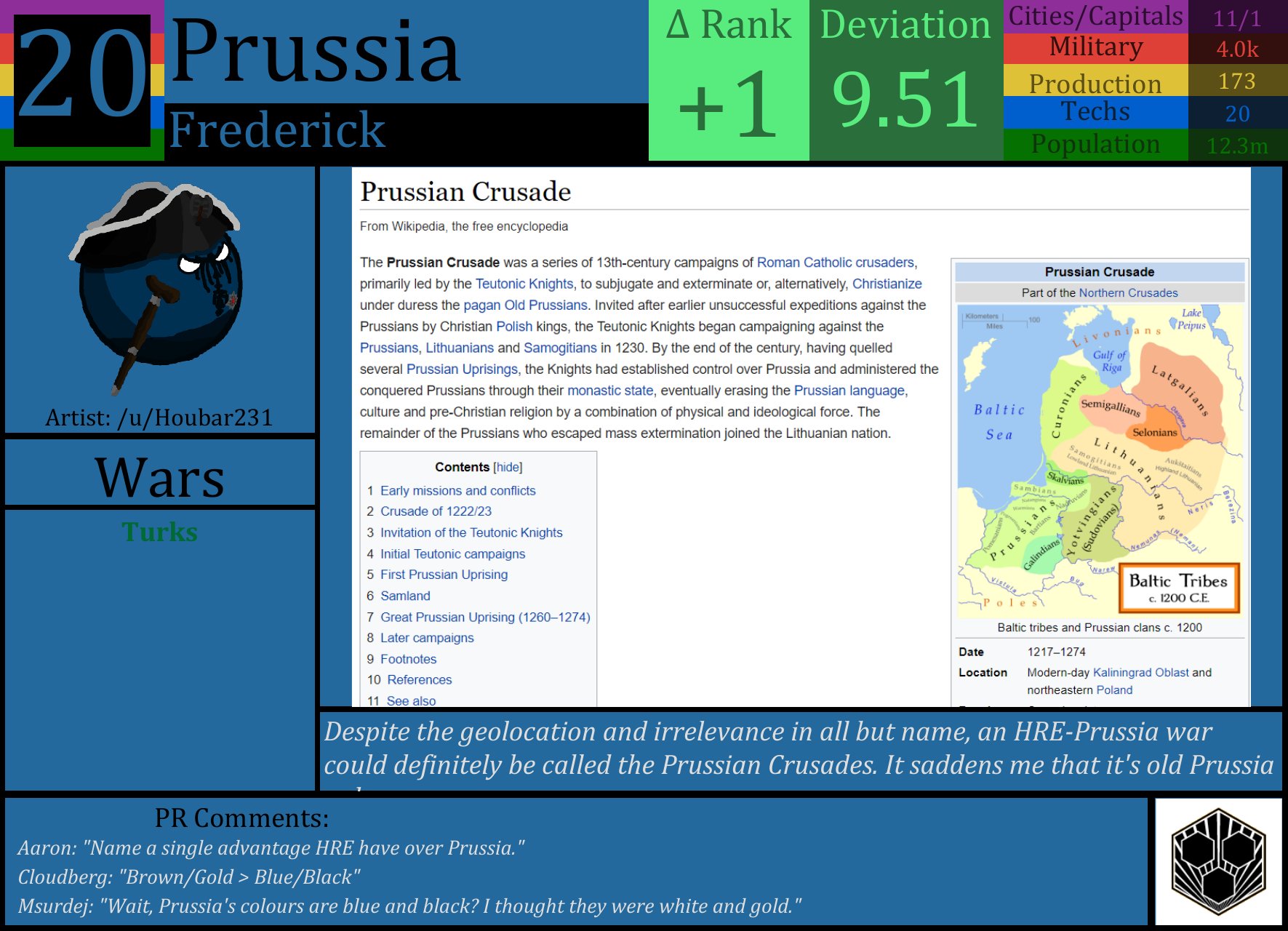
Lordie: Ranks for Prussia this week ranged between tenth and fortieth, and it's not too hard to see why. Despite having stats well above average, they're adjacent to two strong civs in the Sami and the Goths, and with Muscovy on the up, their target selection is dwindling. Add to this their Swedish cities could bring a Sami DoW, whilst their western expansion could see them ire the HRE. Whilst any one war shouldn't be too much trouble, the Prussians aren't the power they once were for sure; a coalition could be devastating. That said, Prussia should still be given credit for managing to engineer a position to survive long enough to use their uniques, hopefully.
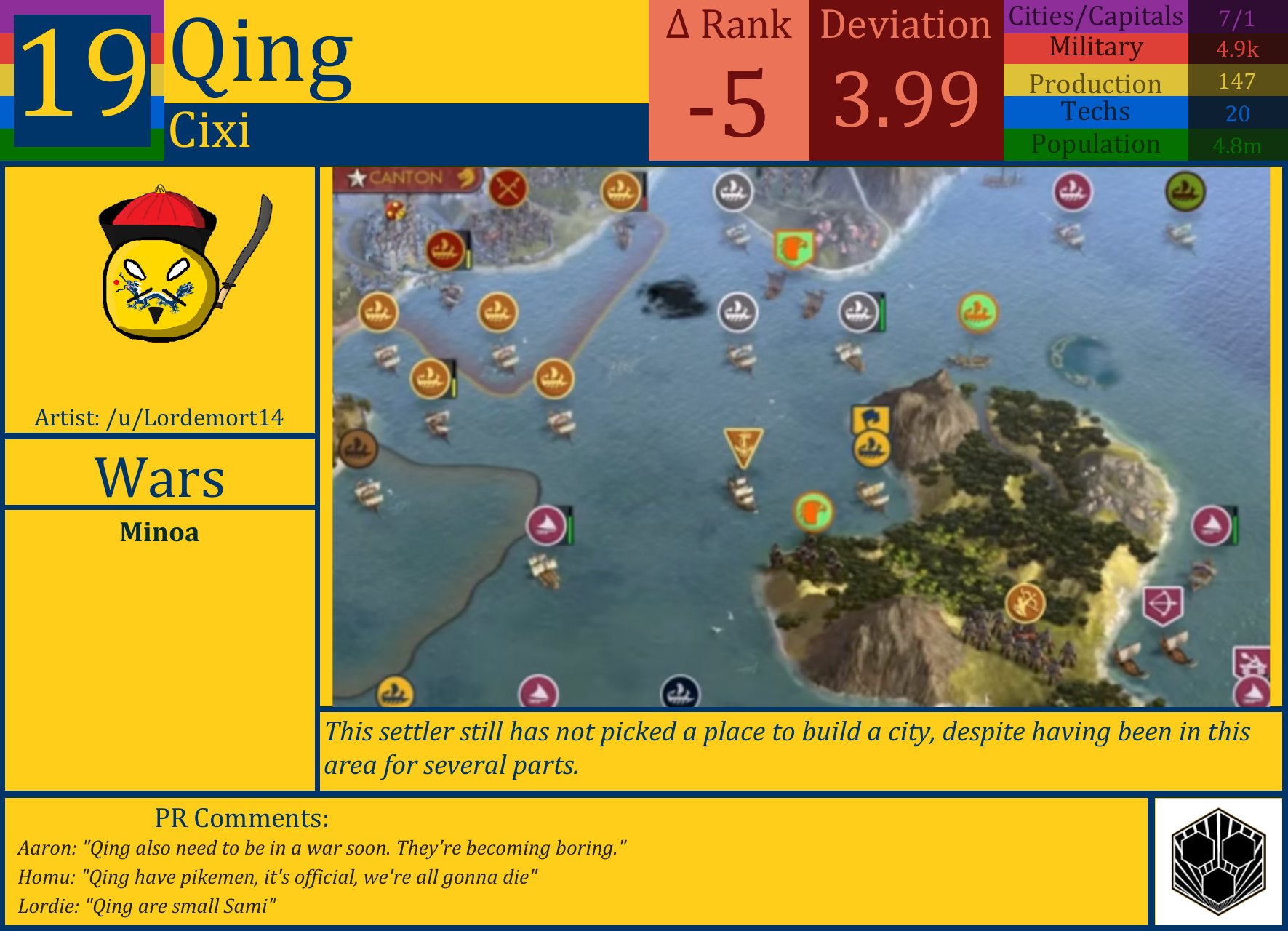
Aaron: Another part where Cixi does nothing. Despite having a lot of land between their core and their Kamtchatkan colonies, they have not been settling it, which is allowing the Khamugs and Korea to grab it. If they don't move soon, their colonies will be completely cut off! And despite having a fairly easy to conquer neighbour in Korea, they don't seem to care and seem content to sit on 5 core cities for the foreseeable future. Near the start of the game, it looked like it would be a 3 way tie between Qin, Qing and Khamugs, but nowadays Qing are looking by far the smallest of the three on account of their bad settling patterns. What is Qing doing? Well, their tech tree seems to answer that question, as they are the second civ in the entire cylinder to start researching education (the first being Sulu). It would seem that after getting the Great Library, the Qing are doubling down on being a science turtle. They are using their big army not to conquer (as is usually expected of the Qing), but to keep them safe from attack while they tech up. Most rankers think this is a worse strategy than simply settling a lot of land or conquering weak neighbours, but I guess we'll see if this unusual strategy pays out.
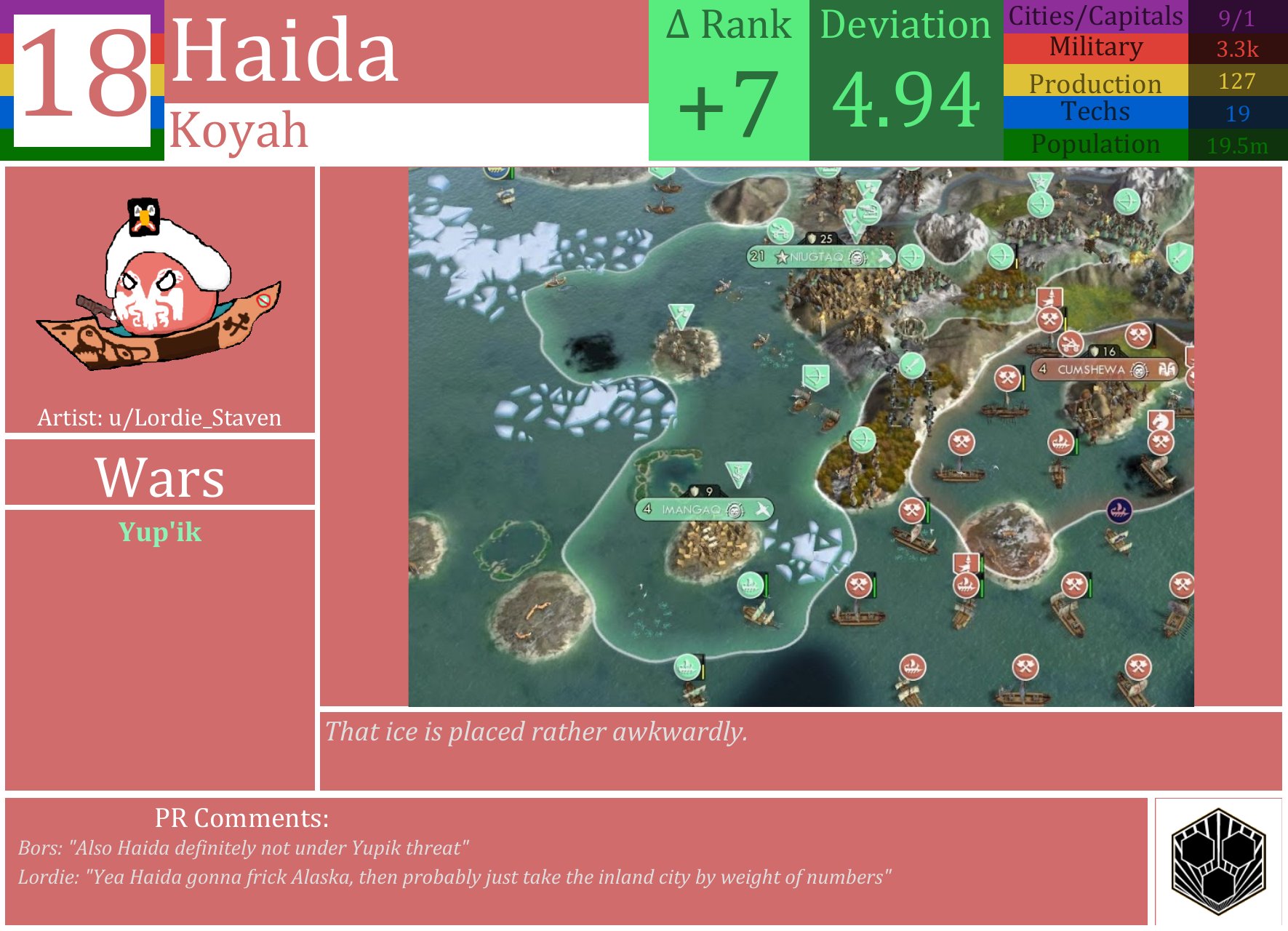
Reformer: The time has come! Last week, it was prognosticated that this war would come to pass, and as seen in the part, it is looking exactly as beneficial to Haida as expected. Less expected was the speed at which Koyah's warfleet seems to be reaching the Yup'ik core, but worry not: all in good time. The only thing that could reasonably prevent Koyah from absolutely ravaging the Yup'ik core is a poorly timed peace deal. All Koyah needs right now is patience, patience, and some more patience. And after the war, Haida would benefit from a modernization of her navy through researching Compass - a key step for any naval power on the cylinder.
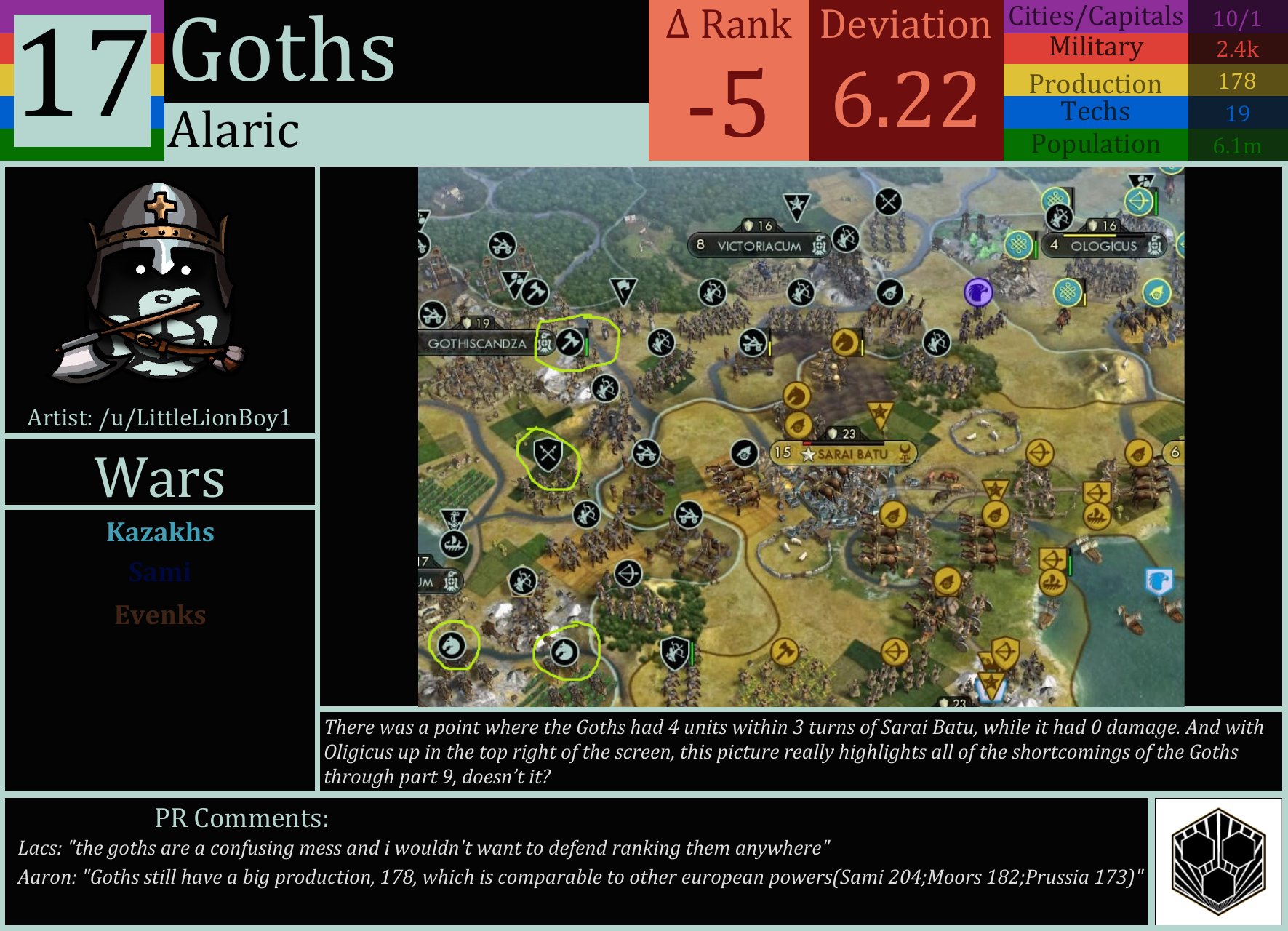
Bors: 2 parts ago there was a lot of hype for the Goths, as they rose to 8th place with their mighty military stat and promising DoW against the Golden Horde, and yet now they’re tumbling down the rankings. The reason for the Great Gothic Tumble (™) has to do with how poorly they waged war against the Horde, and their new losses to the Kazakhs. First, they brought down a mighty capital city to black… and then failed to capture it for several turns… and then they peaced out having not gained any cities and almost lost their own. Then, the Kazakhs invaded, and the drained Gothic military had no way of defending their Eastern border, and sure enough a city fell. They’ve since managed to bring defenders to the East and halt the advance, but confidence in the Goths is fading, and their opportunity to win is closing.
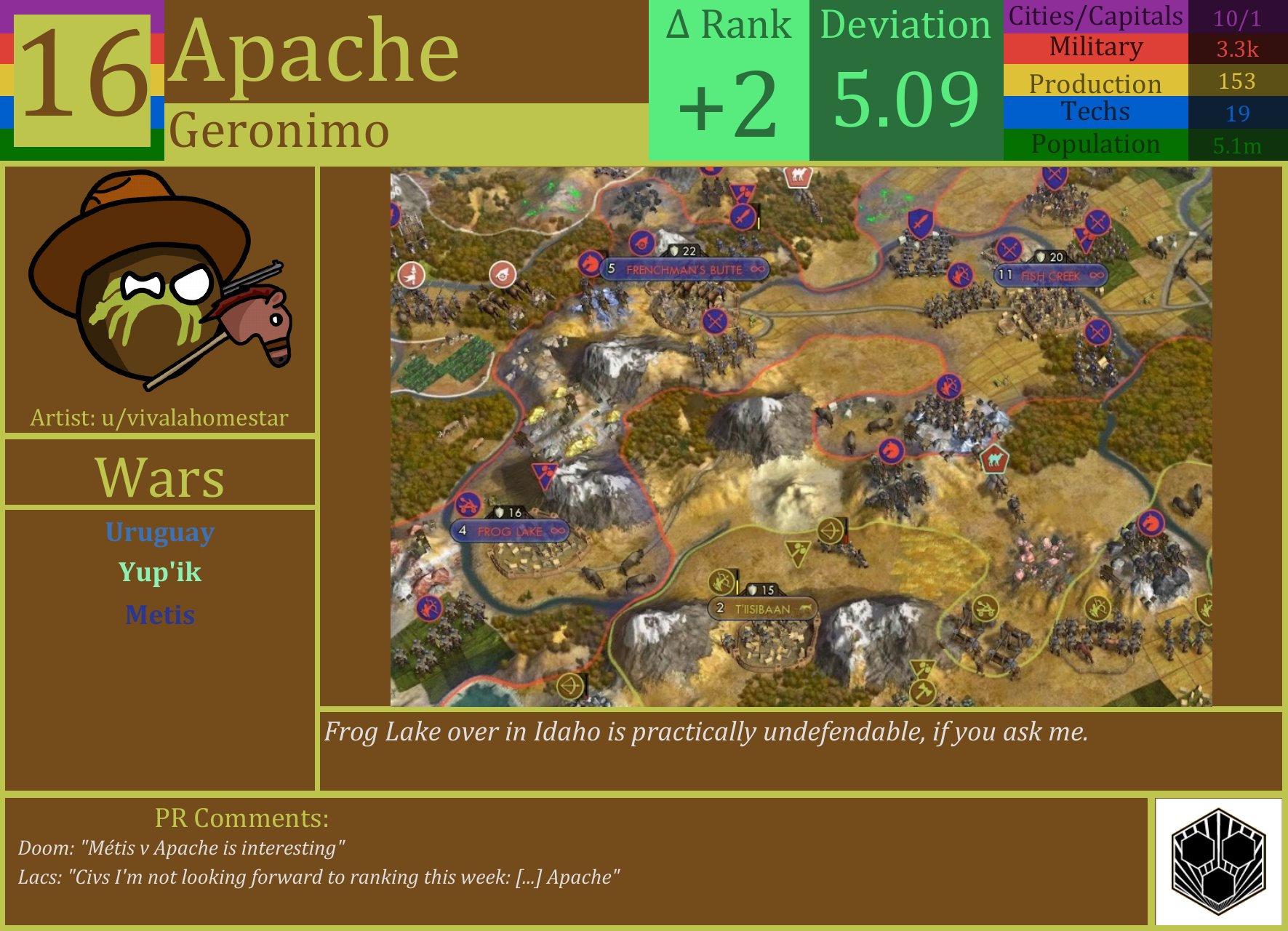
Lacsirax: I'm always surprised to see the Apache have 10 cities. They feel way larger to me, occupying whole swathes of the central and western United States. For comparison, the Evenks have 12, as do Maratha - hell, the Moors have 11. It's their poor settling that's letting them down, as their production and science start to lag behind obvious competitors Métis and Iroquois. There are a few petty civs they could do a number on - finish off Poverty Point, nab that Aztec city - but they'd do better to pick a Métis city and focus on it. What's been holding them back on that front is how long the damn border is; if they picked one city and committed to it, they'd easily overpower the scattered Métis defences. We can dream.
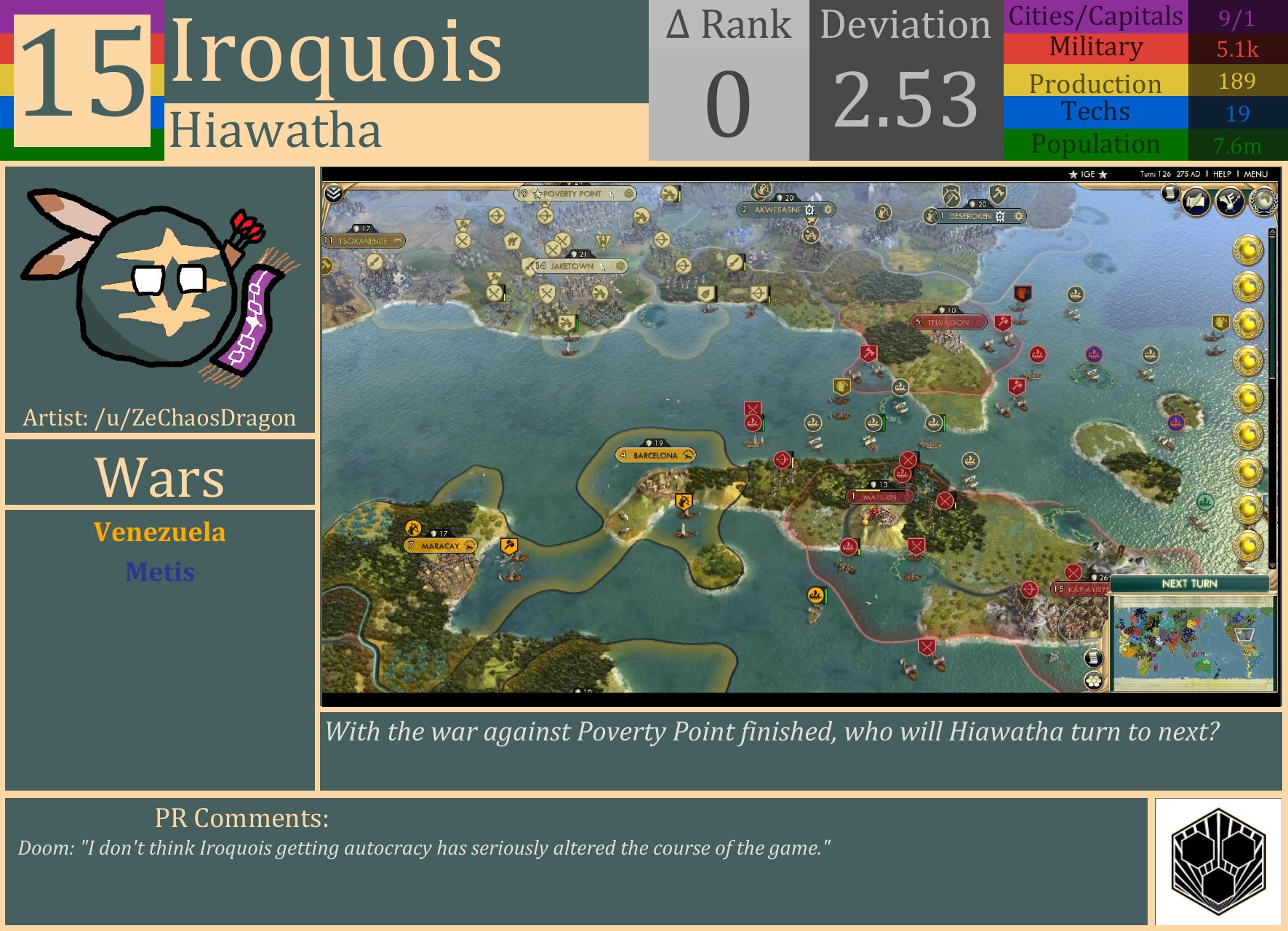
Msurdej: While most of North America is embroiled in war, the Iroquois was noticeably absent this part, appearing in only 2 pics. They remain the second banana in America after the Metis, but that gap is growing by the part. And unlike Riel, Hiawatha is running out of land to place cities. He could try to make a break for Greenland, but more likely is that he'll wait for either the Apache or Canada to tire themselves out, then take his military and go to town conquering.
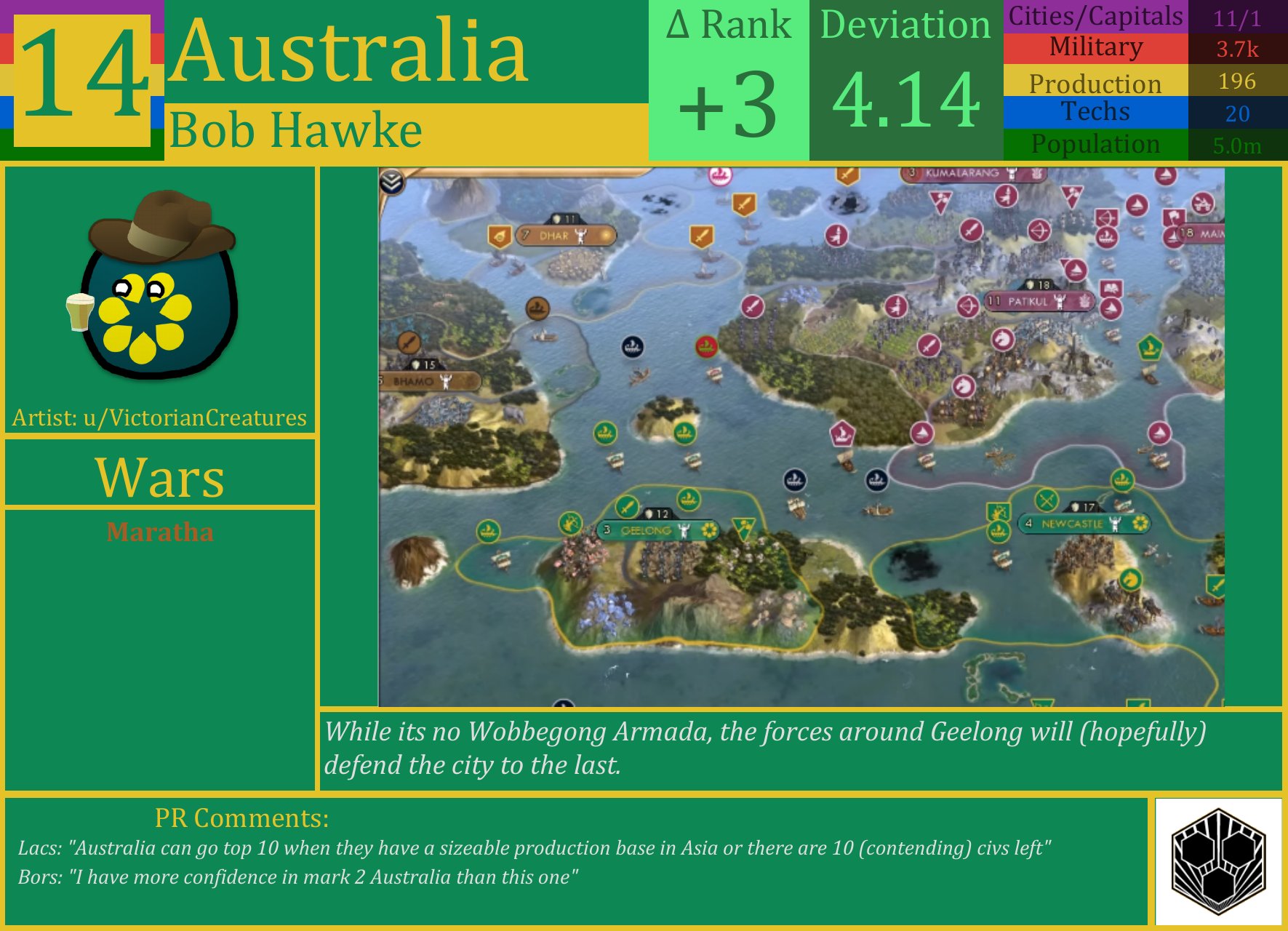
Msurdej: As no war wages on the subcontinent, the part was rather quiet for Australia. Hawke, for his part, continued to settle, placing the flag of Australia in various places. This however, would meet a stop as Hawke encounters land settled by the Marathi. So Hawke does the only natural thing to do, and promptly declares war on them. This might turn out to be a bad move, as Shijavi is currently sending a force to take the island of Java. However, if Hawke can defend his city of Geelong there and take the fight to Dhar, it would be a great step towards an Australian victory.
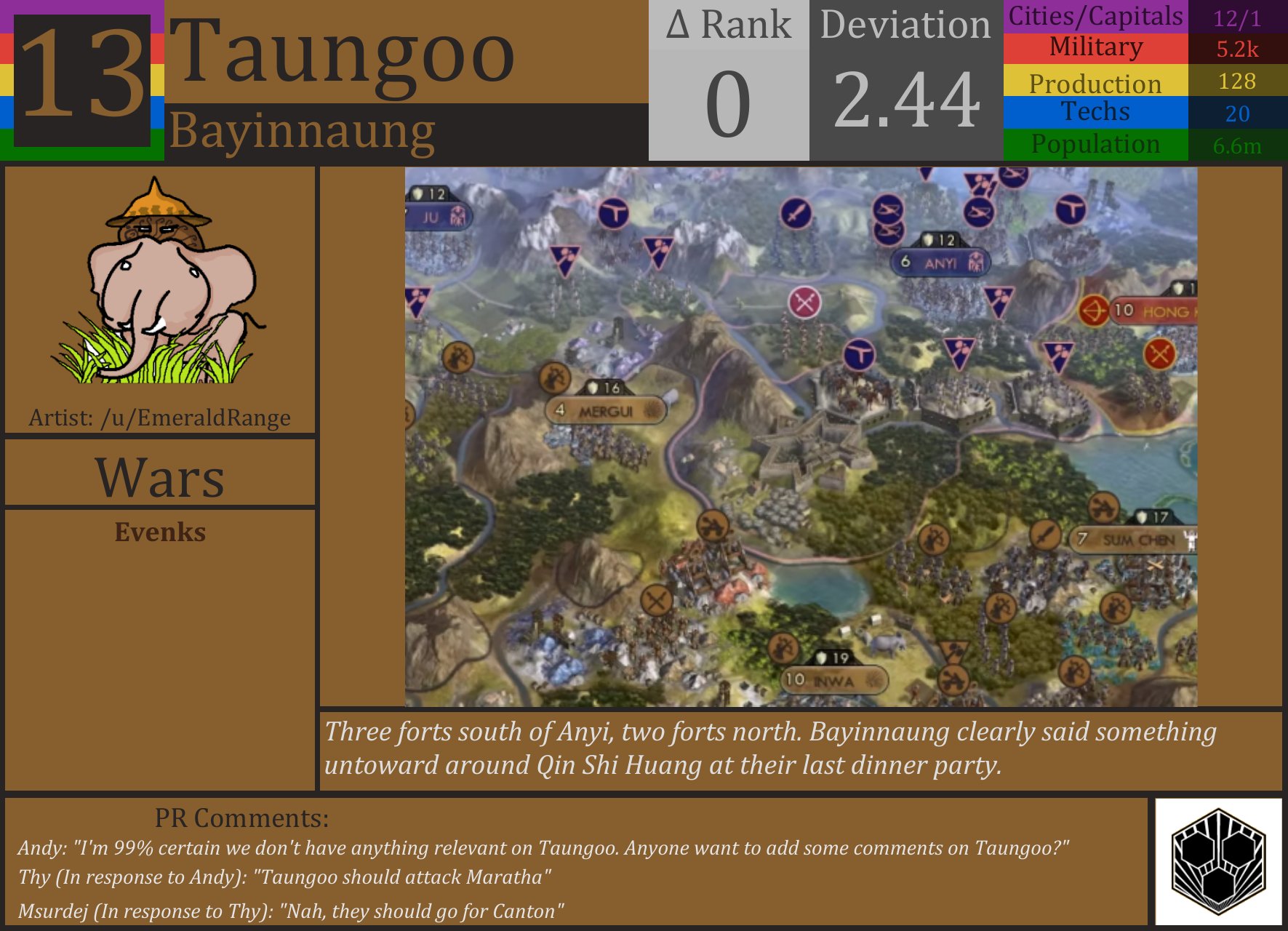
Lacsirax: Taungoo hold steady at 13 after an uneventful, unalarming episode. On the face of it, the only thing of note is Taungoo's new city of Dawei in Bhutan - sure to annoy Nepal, but even that's a story for another part. But the neighbours of their movements are intriguing: firstly, Australia declared war on Maratha, giving Taungoo an excellent opportunity to side with whoever comes out on top and scavenge an extra city or two to join their meagre Sumatran holdings. On the northern border, Qin have built five forts nearby the citadel they placed last episode. Five! You're lucky to see one fort in some AI games - a civ only tends to build them if it's an otherwise useless tile, like flat snow. Are Qin simply being precautious, or do they have nastier plans for Bayinnaung? Either way, I'd expect Taungoo to hold their own - the terrain favours them and their army is just good enough.
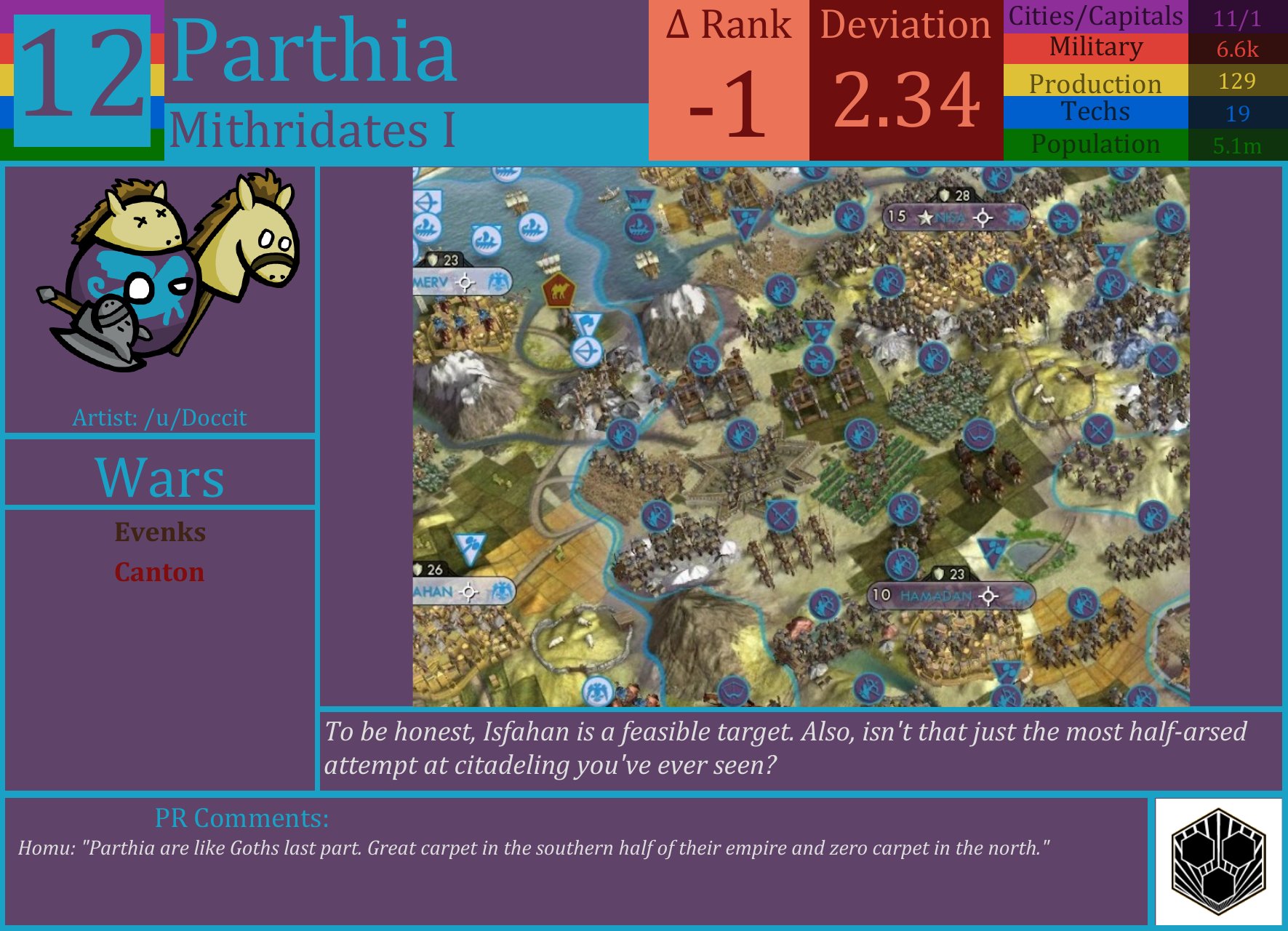
Lacsirax: Unbelievably, Parthia have third largest military score in Asia right now. Oh, sorry - that should've read, third largest military score in the WORLD. Seriously, 6.6k, equal to the Haida + the Apache, or about two Métises! The Khamugs are second, and only just - 6.7k. And then there's Uruguay... on 13k. Well, at least Uruguay are very far away. But seriously, if Parthia have such a grand army, why are they slipping even further away from the top 10? Well, some of it's inertia. Rankings tend to favour active civs, as there are more reasons to increase their ranking. And poor production stats definitely factor into it too. But I think the biggest problem comes down to their neighbours. Neither the Kazakhs nor India are in the position to destroy Parthia by any means, but they'd also be tough targets, with the Kazakhs flourishing at the moment and India having settled some clever mountain chokepoints. That leaves the Seljuqs, who despite their terrible stats also find themselves in neat hilltop strongholds, and more to the point, are being invaded by the other big P in the region. Parthia would do well to increase their production capabilities and keep their army top tier, and wait for a more ideal moment to strike. Until then, expect to see them around this ranking a while longer.
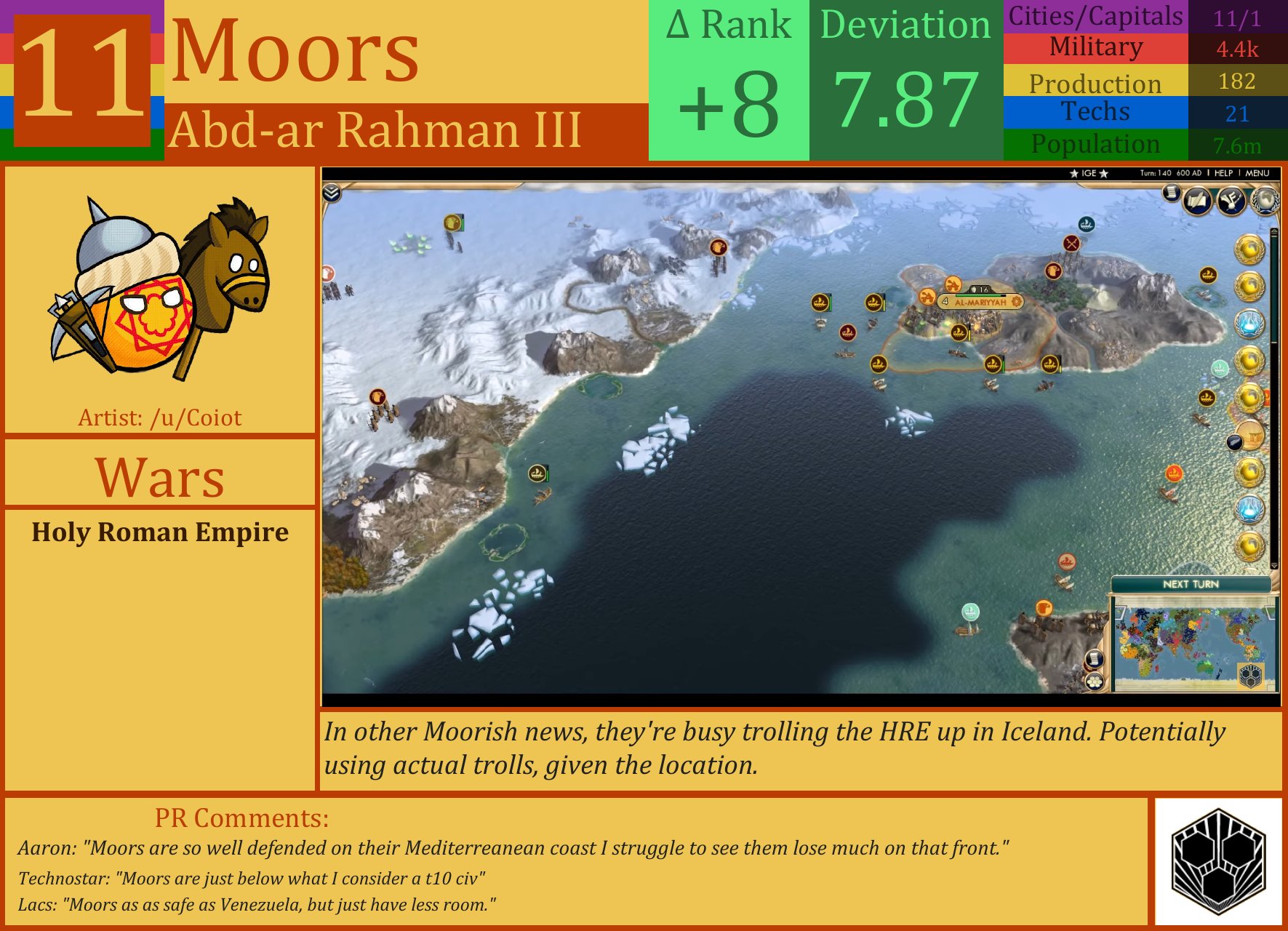
Homusubi: The Moors caused more argument than any other civ this part, as the question of whether or not their position is good enough to warrant a top ten position was hotly debated. Rankings ranged from fourth to thirty-fourth, but in the end, the prize has barely eluded them, and they end this part in eleventh place, although that is still up eight from last week. Chief among their achievements this part was the capture of Cologne from the Holy Romans, somewhat alleviating the accusations of gross incompetence left over from Muranogate. However, that's still only one successful war in two (barring the possibility of an HRE comeback), and the question remains, which war was normal Moor behaviour, and which was a fluke?
Incidentally, the Moors have at least two extra settlers on the ground now, both on the west coast of their empire. This isn't the sort of Spanish colonisation people normally talk about...
Incidentally, the Moors have at least two extra settlers on the ground now, both on the west coast of their empire. This isn't the sort of Spanish colonisation people normally talk about...
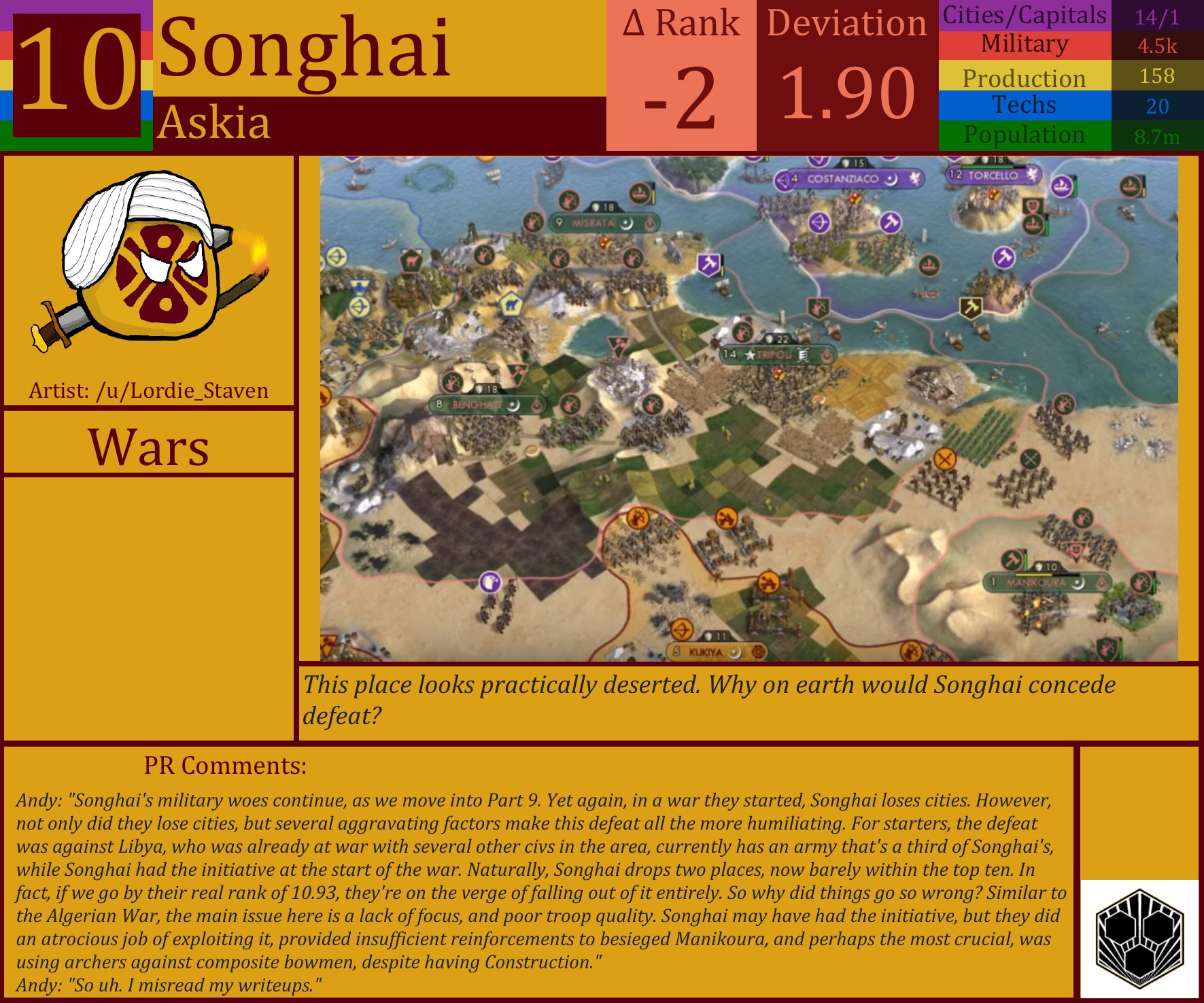
Adm. Cloudberg: After part 8, in which Songhai almost lost to Algeria (just eking out a draw), some of us thought, surely that performance was a fluke! But we thunkt wrong. Songhai has bungled yet another war, losing a city to Libya of all civs, and then made peace despite being in a position to take it back and even push on to Benghazi. As a result, the power rankers have punished Songhai by dropping them to 10th, the lowest they've been since part 1. And if they keep punching under their weight, then there is still plenty of room to drop even farther.
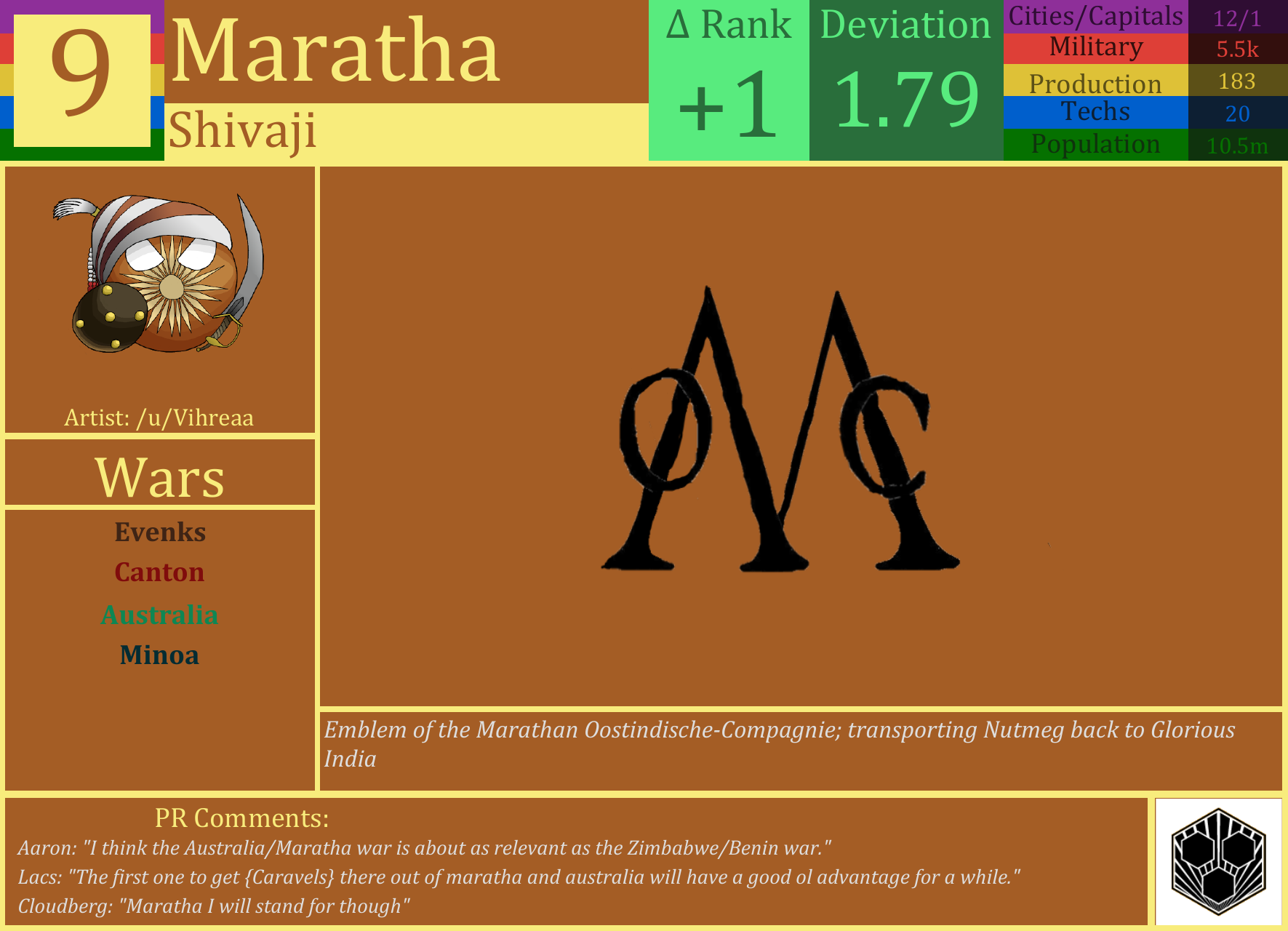
Lordie: Maratha move up one spot in our rankings following their expansion in Southeast Asia whilst Indira and Prithvi continue their lover's feud. Thanks to Taungoo placidity, they've manage to secure the three cities in Malaysia and Indonesia, and just in time, as an Aussie DoW rolls in, beginning the War of Island Colonization. It looks like Maratha should come out on top though, and with the sparse defenses around the coast of NWT, Shivaji might have struck a jackpot. There is still the matter of not owning the subcontinent, but that can wait. Right?
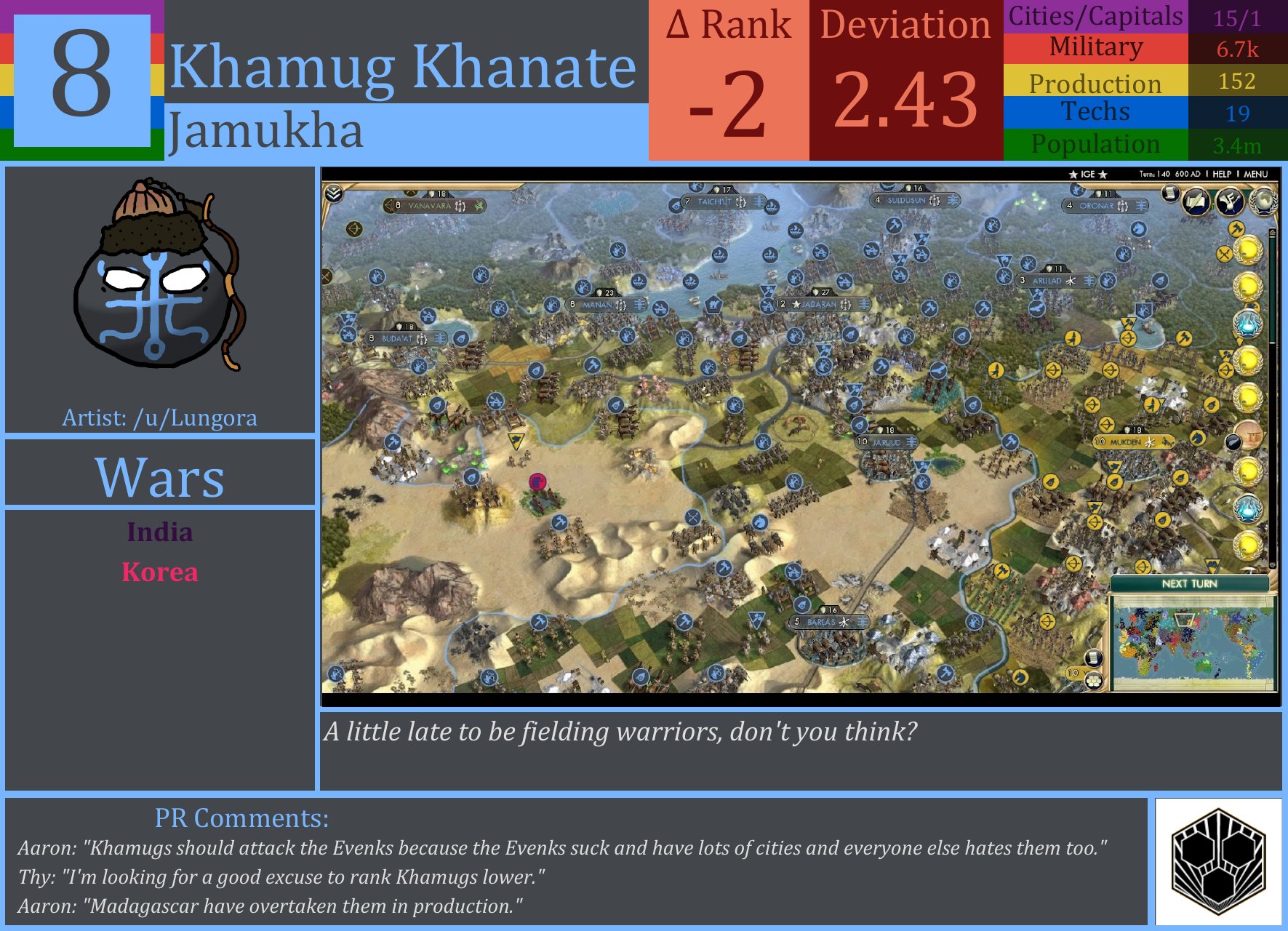
Lacsirax: It feels like an age since Jamukha graced the top spot of these rankings, and if anything's going to put him back there, it certainly isn't being invaded by Korea. As his population (and thus production and science) continues to be hampered by the dry terrain, it becomes harder and harder to see the Khamugs making use of their considerable size. But it's far from over. Step one is to successfully defend against Korea, of course - but honestly, I don't think that's a huge ask, as Korea's army is fairly meagre. Then there are still a couple of easy options. They could attack the Evenks, a universally hated civ with terrible tech, but the forested terrain and ample rivers don't exactly complement the horse-happy horde. Alternatively, strike a distracted Kazakhs for a couple of easy gains in the Tarim Basin. And there's still that one thing that's been true of the Khamugs since Part 1 - you can count on them to settle, and there's still plenty of room.
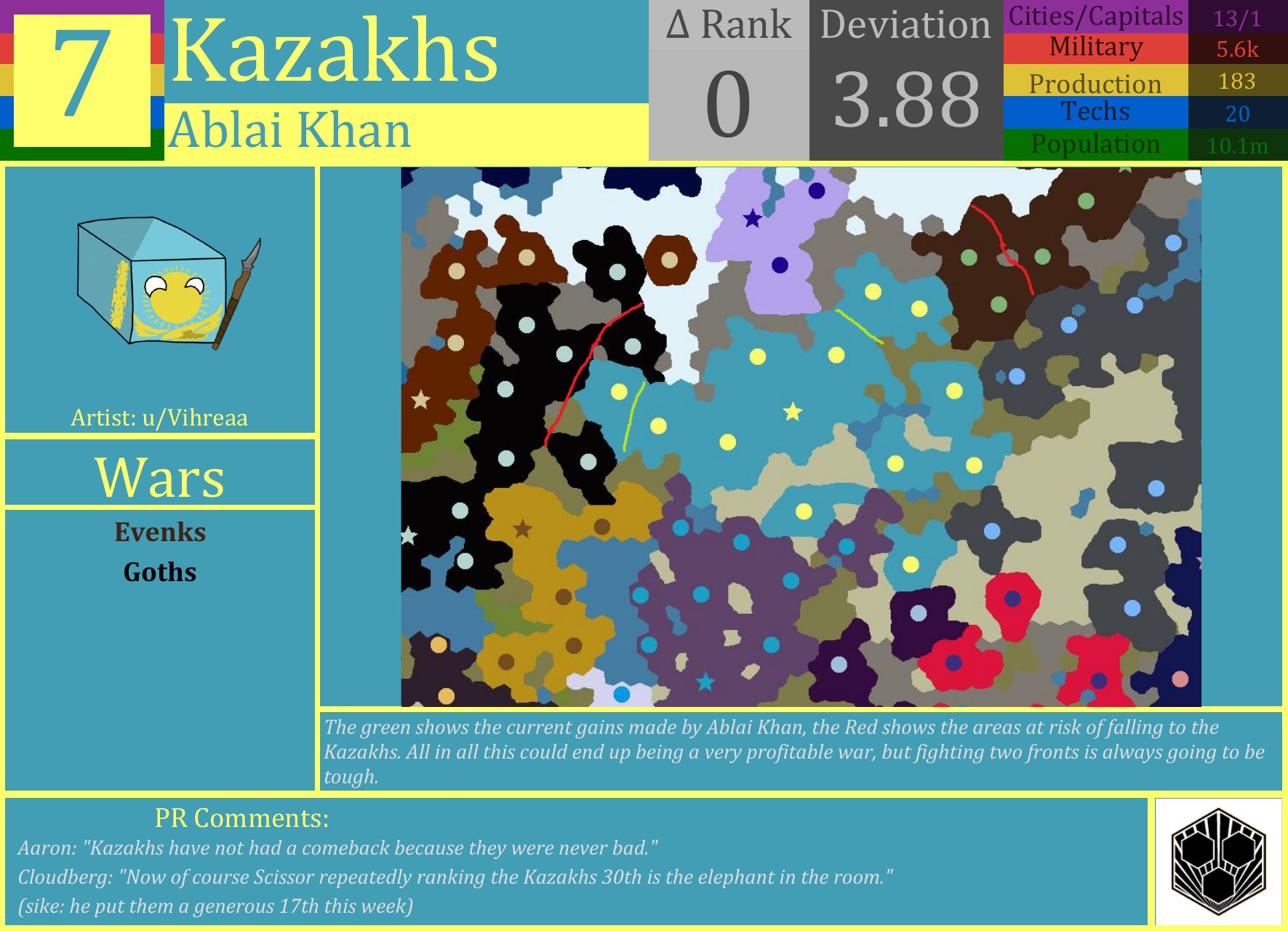
Bors: Originally ranked #1, the Kazakhs slowed down in the early parts, plunging down to 16th by part 6. Now, however, Ablai Khan has suddenly remembered how to war and pulled two very smart Declarations of war: one against the Evenks, the other against the Goths. The Evenks have proved to be no match against the Kazakh army, unsurprisingly, which has lead to some rather easy gains for the Khan. The Goths on the other hand, were actually ranked higher and still lost, due to the timing of the DoW. The Goths were just wrapping up a war against the Golden Horde that crippled their military, which went from a top 5 military, to below average. The question now is how far the Kazakhs can push their foes.
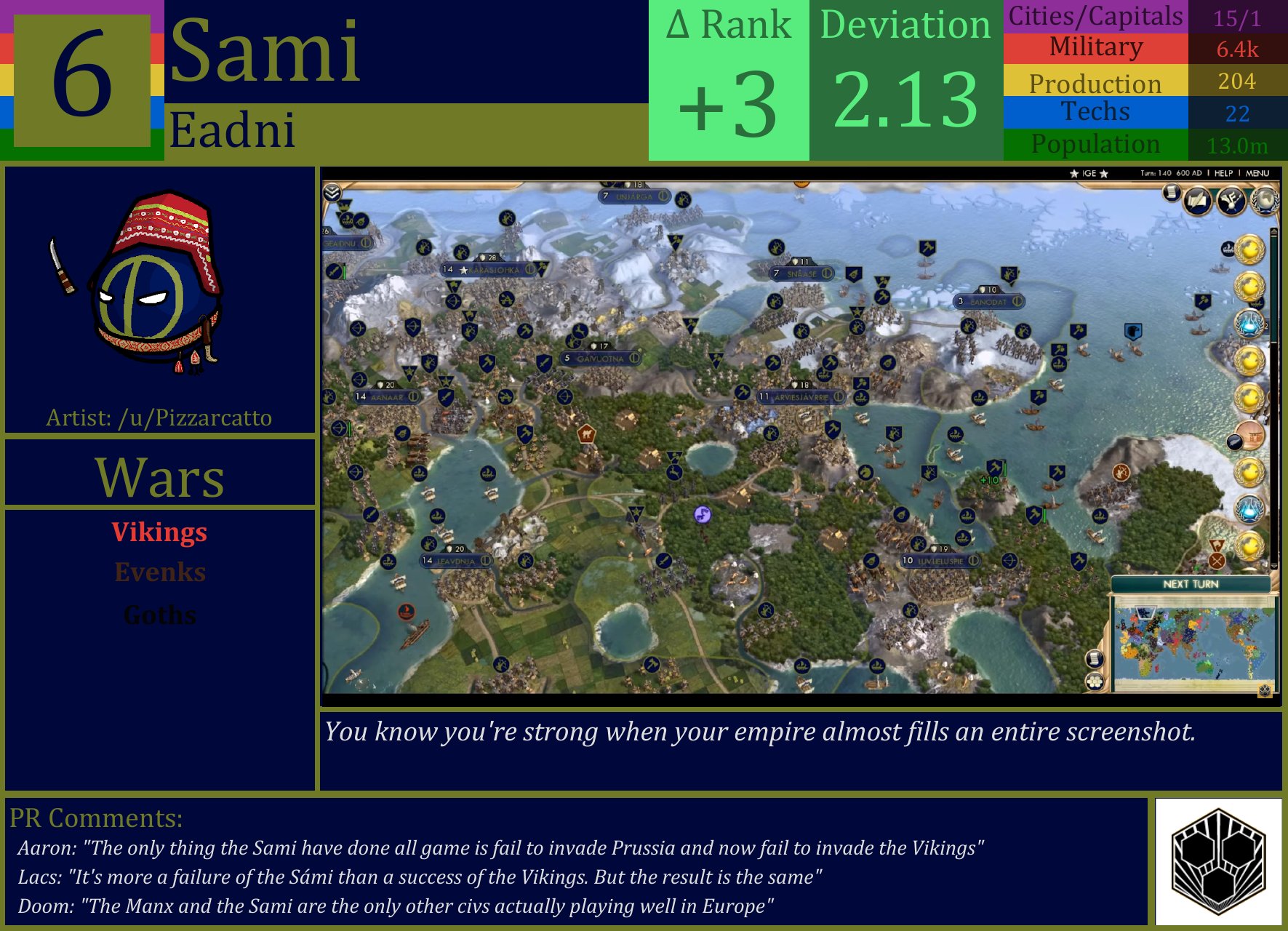
Techno: The Sami rise several ranks as it becomes clear just how much of a gulf exists between them and their neighbors. The Sami military is the fourth-best in the cylinder with only a tiny gulf separating their military from the second-best. Their production potential, their cities, and their technological prowess all surpass every other European power, and as an added bonus, the Sami still have lands that they can settle and make productive due to their UA. This begs the question, why aren't the Sami ranked higher? I personally think it's only a matter of time before this issue is resolved, but the Sami do not have the best expansion prospects right now. They have shown an inability to invade either Prussia or the Vikings, and while a large part of that can be attributed to the rough terrain of the region, the Sami still must overcome this terrain obstacle before they can expand through non-peaceful means.
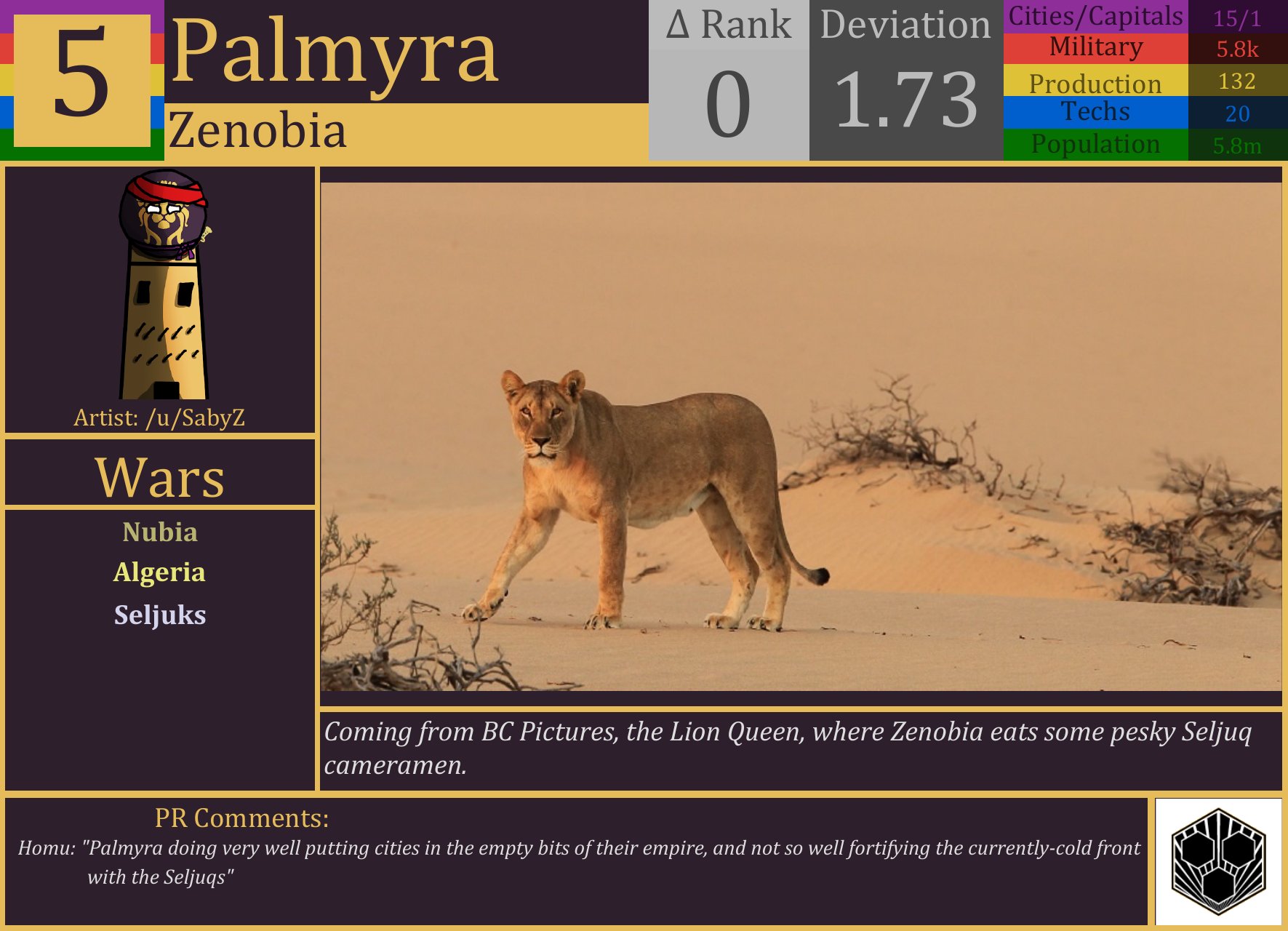
Lordie: Zenobia, the terror of the dunes, decided to turn her baleful eye eastwards towards the end of this part. With the Seljuqs about to feel her out-Rey-ge, and almost the entirety of the Middle East under her thumb, Palmyra are looking more and more like a serious contender. The real question is whether they can crack any of the natural chokepoints in their way- the Caucasus, the strait of Bosphorus, or Iran. If they can't, then their only real expansion opportunity is into Africa. They can definitely do it, that's not the question, but what is regards whether any of the African power take offence. Regardless, Palmyra have established themselves as a top 5 civ and the (slightly boxed) Lion of the Desert.
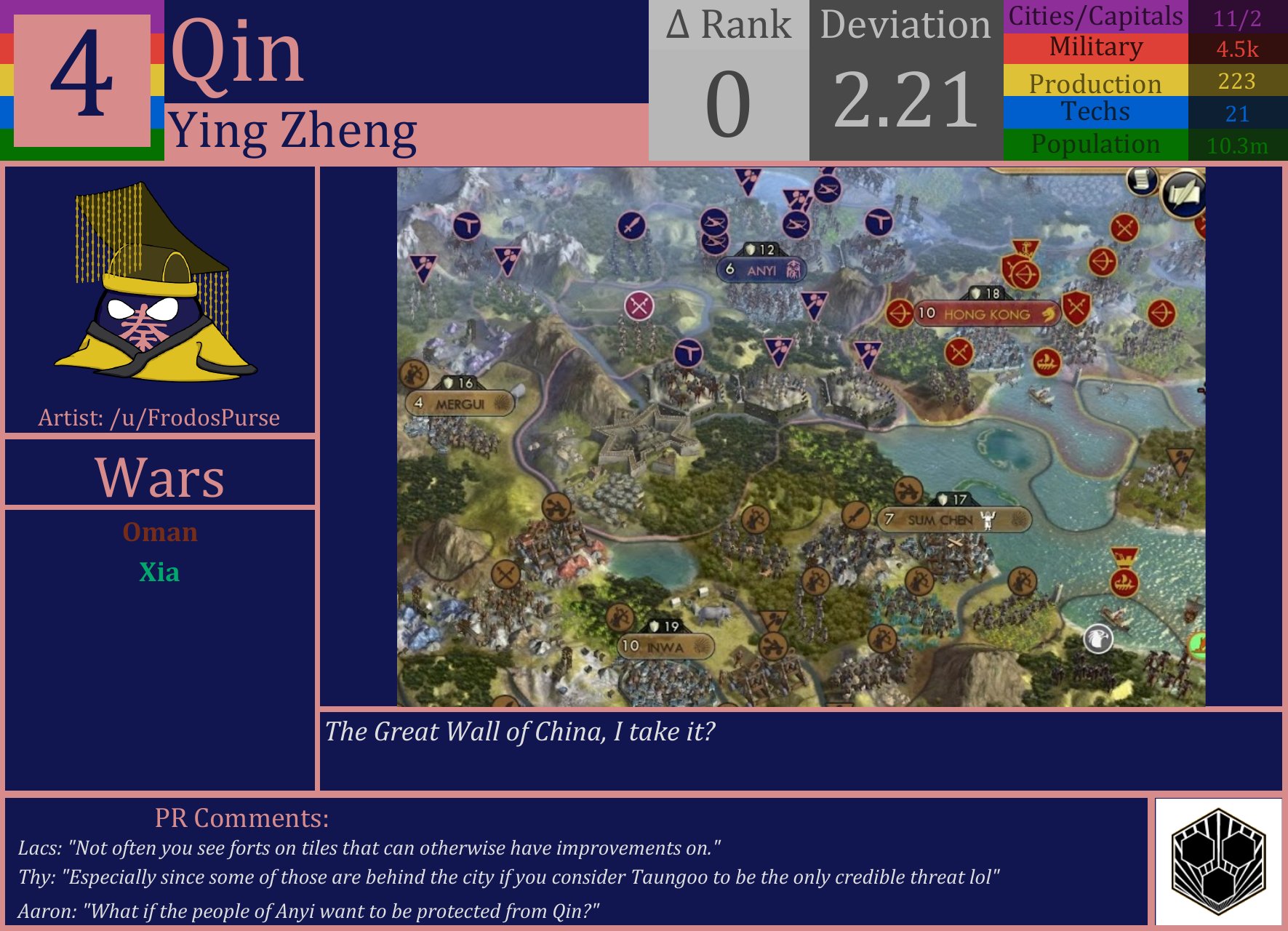
Reformer: Not much happened in China this part. Qin remains among the top dogs statistically speaking, which has so far not been quite difficult for the proactive civ, but future might look bleak at this rate. Their last war with Canton was not quite as successful, and the gridlock of Northern China remains in place even if Qing is becoming slightly less impressive. To the west, Nepal fills out the Himalayas with cities that won't be falling any time soon, and to the south Taungoo sits behind some stress-inducing mountain passes. With room for expansion starting to run out for everyone, Ying Zheng will have to find a foe to attack - but with these options, does a good choice even exist?
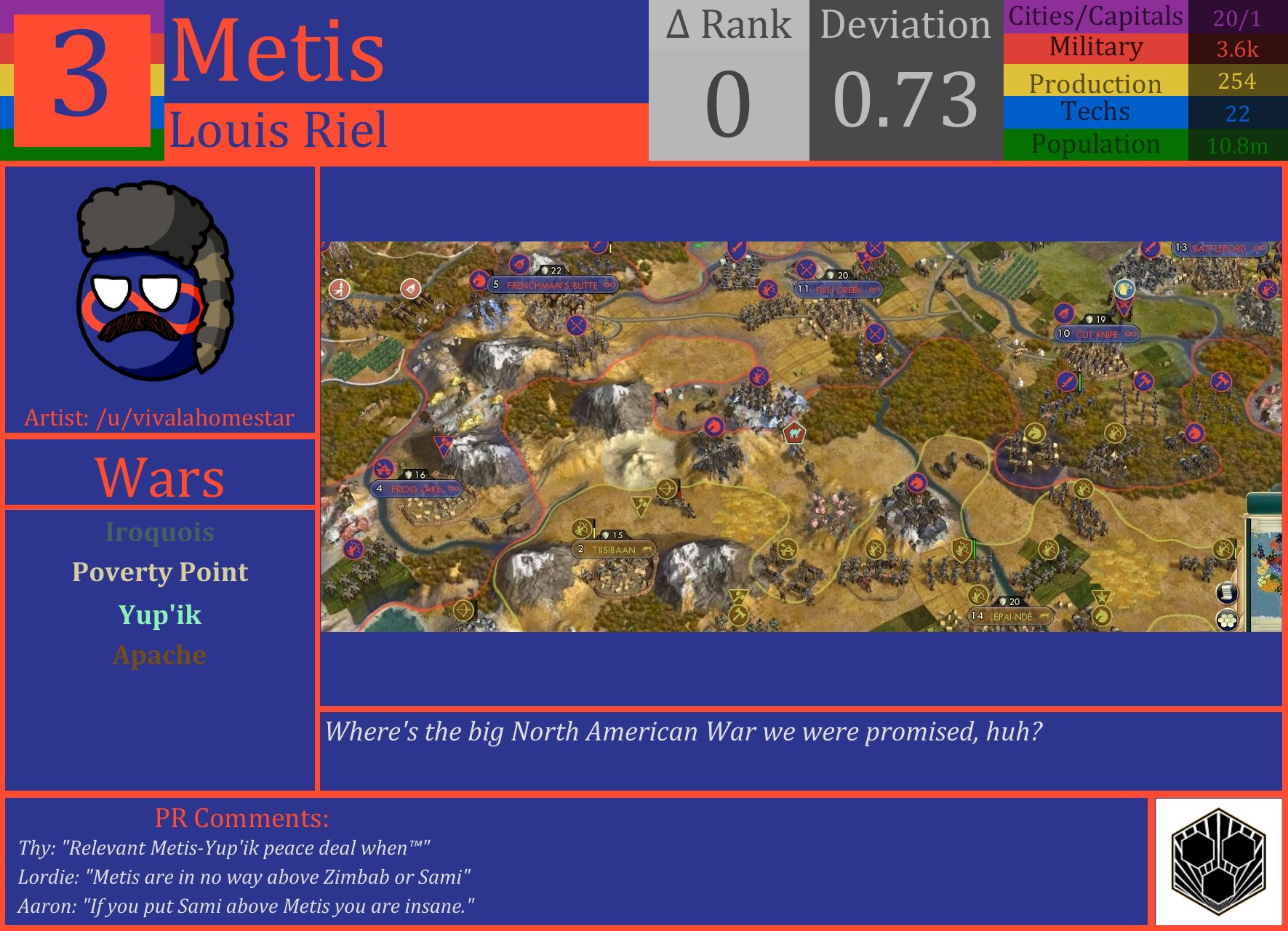
Reformer: Métis is at war again, and this time Louis Riel has picked an enemy that won't simply keel over: Apache. The war is being waged rather strangely so far, though, as "occasional skirmishing" is not quite what we anticipated when we saw the war declaration. While Métis is far from being threatened, they are also rather far from making any headway in this war - one look at the front reveals as much. This becomes even stranger the further one looks into the Métis core, with units scattered all over the place, garrisoning cities as if it were peacetime. Perhaps the AI is slightly confused about the war it declared?
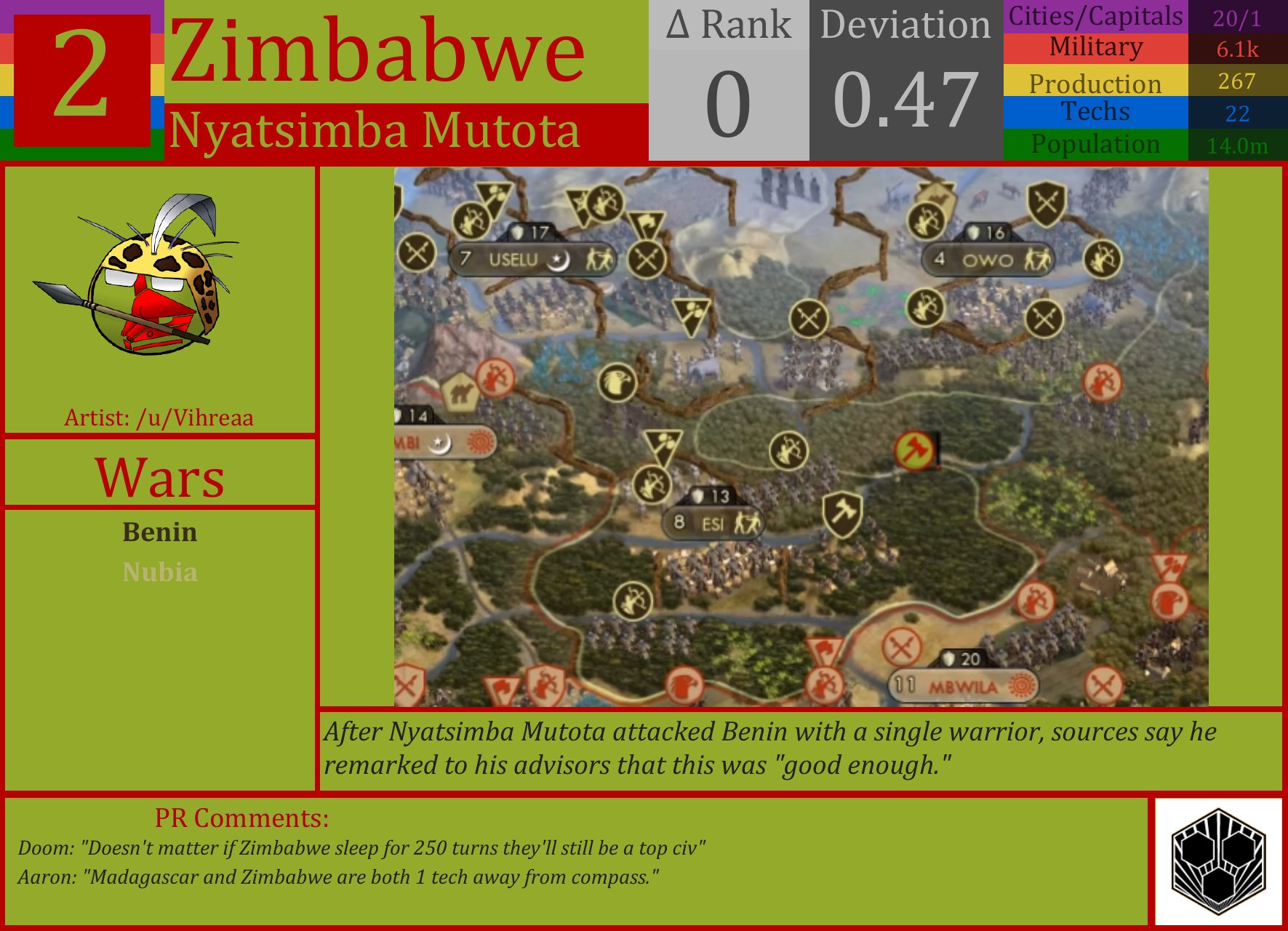
Adm. Cloudberg: Zimbabwe holds steady as all but three rankers put them second this part. Their stats are impressive, their army is scary, their cities are many—but Nyatsimba Mutota can't clinch that first place spot in part because he has shown no sign that he cares about expanding through less-than-peaceful means. Ndongo could fold with a well-timed invasion, and so could Madagascar, but so far Zimbabwe prefers to take potshots at civs it can barely reach, and declares joint wars alongside the civs it should be invading.
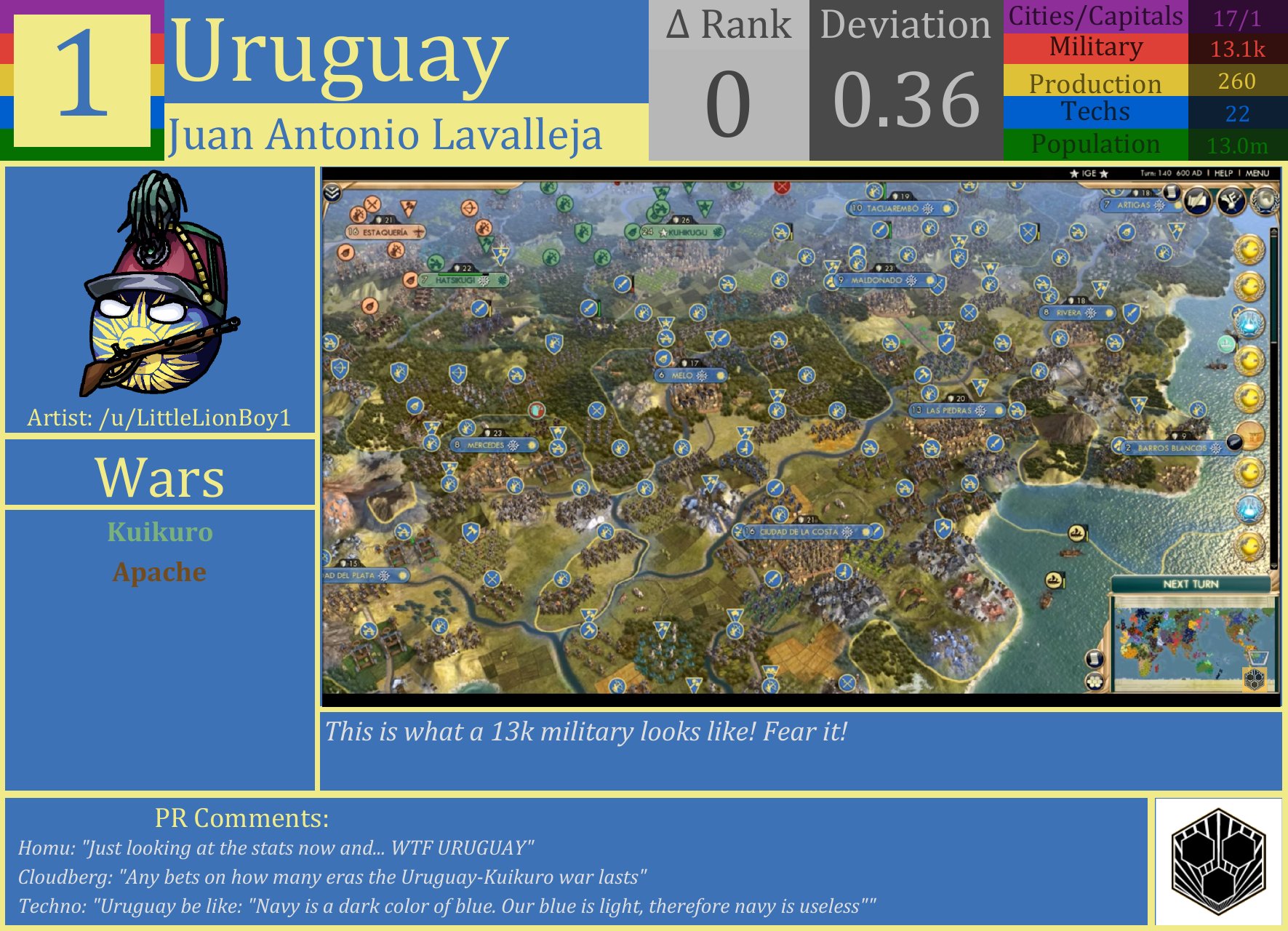
Aaron: Returning in the number 1 spot for the second part in a row, it's Uruguay! Their production has almost caught up to Zimbabwe (only 7 hammers behind). Their effective science is now second in the entire cylinder behind only Sulu! And if you thought their 8k military last part was scary, they have increased that to a truly monstruous 13k military, approximately twice as big as the second biggest army! They trully are terrifying. The target of their wrath is the Kuikuro, famed for their legendary invincible cities. But if anything is going to break the Kuikuro's reputation, it's a 13k army of the highest tech units currently in play. Even in the situation where they fail to break the Kuikuro, they will still have enough military left over to easily counter their biggest threat of Selk'nam. Further afield, their second biggest threat, Venezuela, is currently floudering against Haiti, and does not seem like they will be any match for Uruguayan might when their borders eventually meet.



